Planning an 11-day Ireland itinerary can be a pain in the backside… So, we’ve done all of the hard work for you!
We’ve spent 25+ years travelling around Ireland and the itinerary below leans on that experience and the many mistakes we made along the way!
In a nutshell, this 11-day itinerary:
- Starts and ends in Belfast City
- Has been meticulously planned
- Has an hour-by-hour itinerary for each day to save you time/hassle
- Follows logical routes that take you to hidden gems, tourist favourites and great pubs and restaurants
Who this itinerary will suit
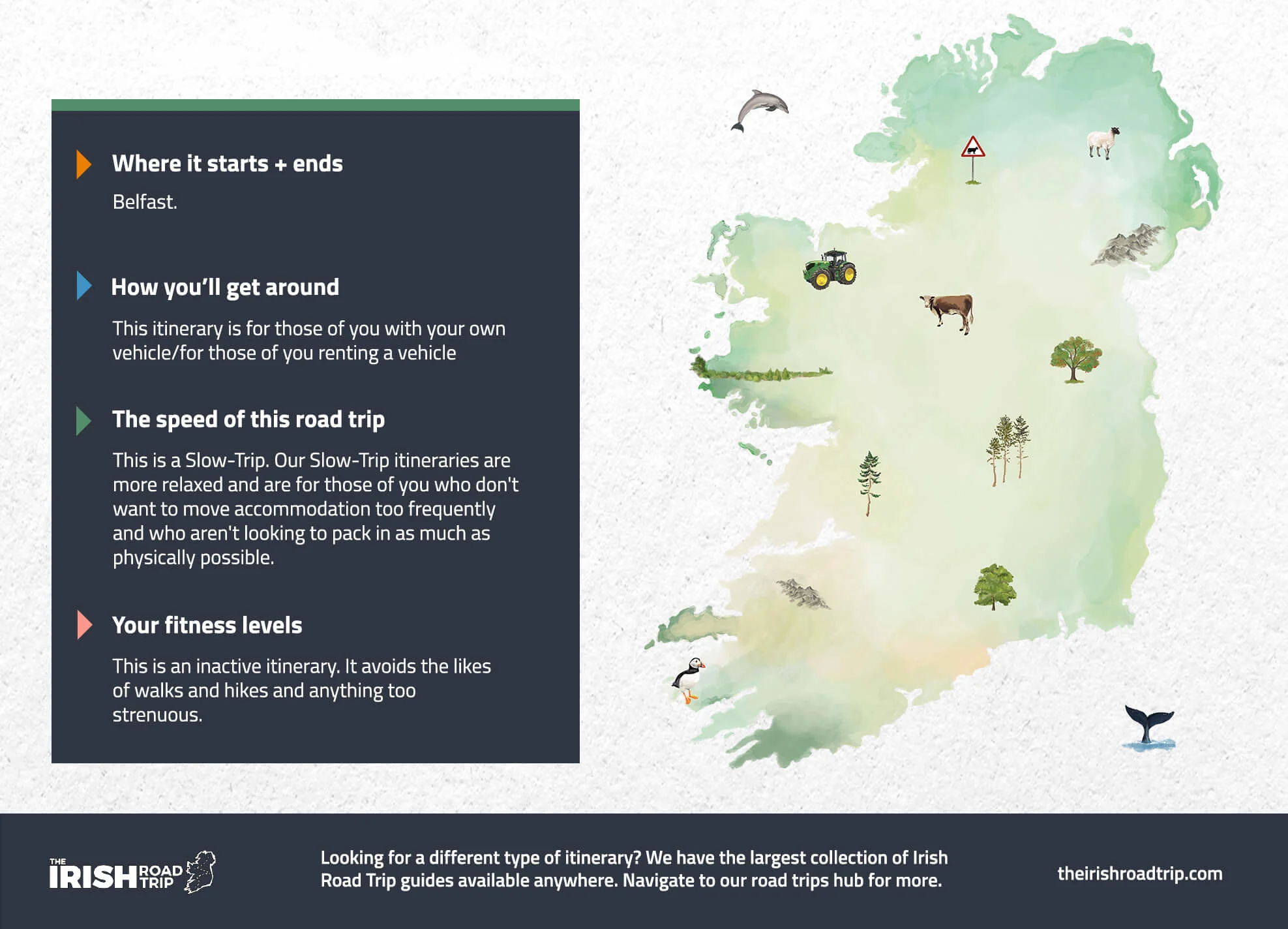
Now, before you scroll down, take 10 seconds to look at the graphic above – each of our road trip itineraries have been tailored to specific needs.
This road trip is specifically for those of you:
- Starting in/near Belfast City
- Using your own car/a rental
- Looking to explore at a slow pace
- With a low level of fitness (i.e. it avoids long walks and hikes)
- Remember, we have hundreds of different itineraries here if this one doesn’t suit you
An overview of this itinerary

Click here to see a high resolution map
The map above gives you a very high-level overview of where this route will take you.
It uses several bases (e.g. Cork for 3 nights) and provides you with day-long road trips you can head off on, so you avoid having to change accommodation constantly.
Now, I’ll stop rambling on – here’s a day-by-day insight into each of the days below!
Day 1: Discovering Belfast City: Northern Ireland’s Capital
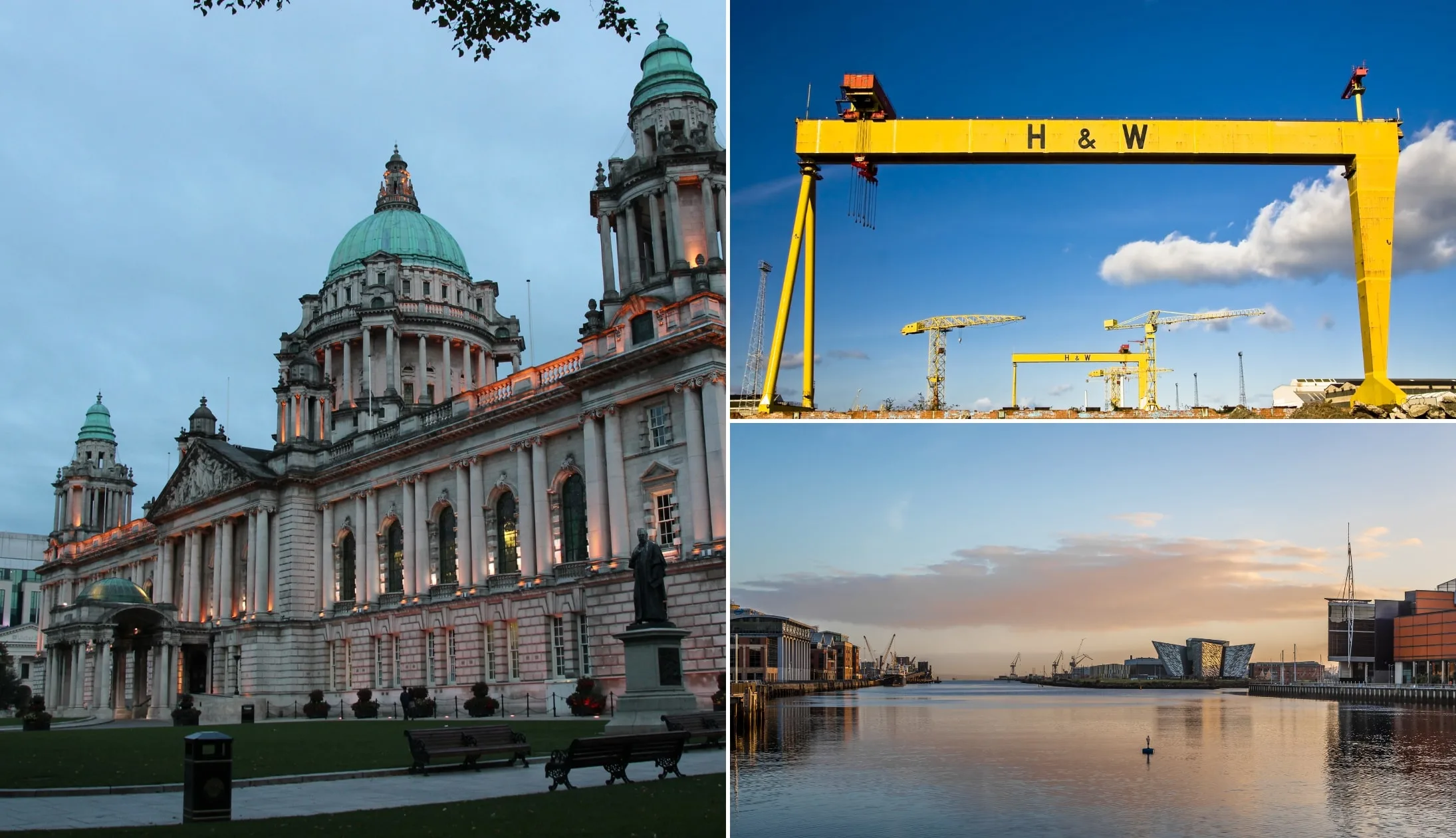
Photos via Shutterstock
It’s day one, so welcome to Belfast, the capital of Northern Ireland, and the start point of your epic 11-day tour of Ireland! For today, we’re going to assume that you’ve arrived in the city in the early afternoon, giving you ample time to grab lunch and take in a couple of attractions.
First of all, you’ll probably want to check into your accommodation. You’ll be spending three nights in Belfast, and there are plenty of great hotels and guest houses to choose from.
Our Belfast accommodation recommendations
- Budget: Vagabonds Hostel(in the city centre with top reviews) and Amica Guesthouse (short bus/drive from the city centre with great reviews)
- Mid-range: Ten Square Hotel and Maldron Hotel Belfast City (both are super central with exceptional reviews)
- Luxury: The Fitzwilliam and The Merchant (both gorgeous, high-end hotels at the heart of the action)
Stop 1: Lunch
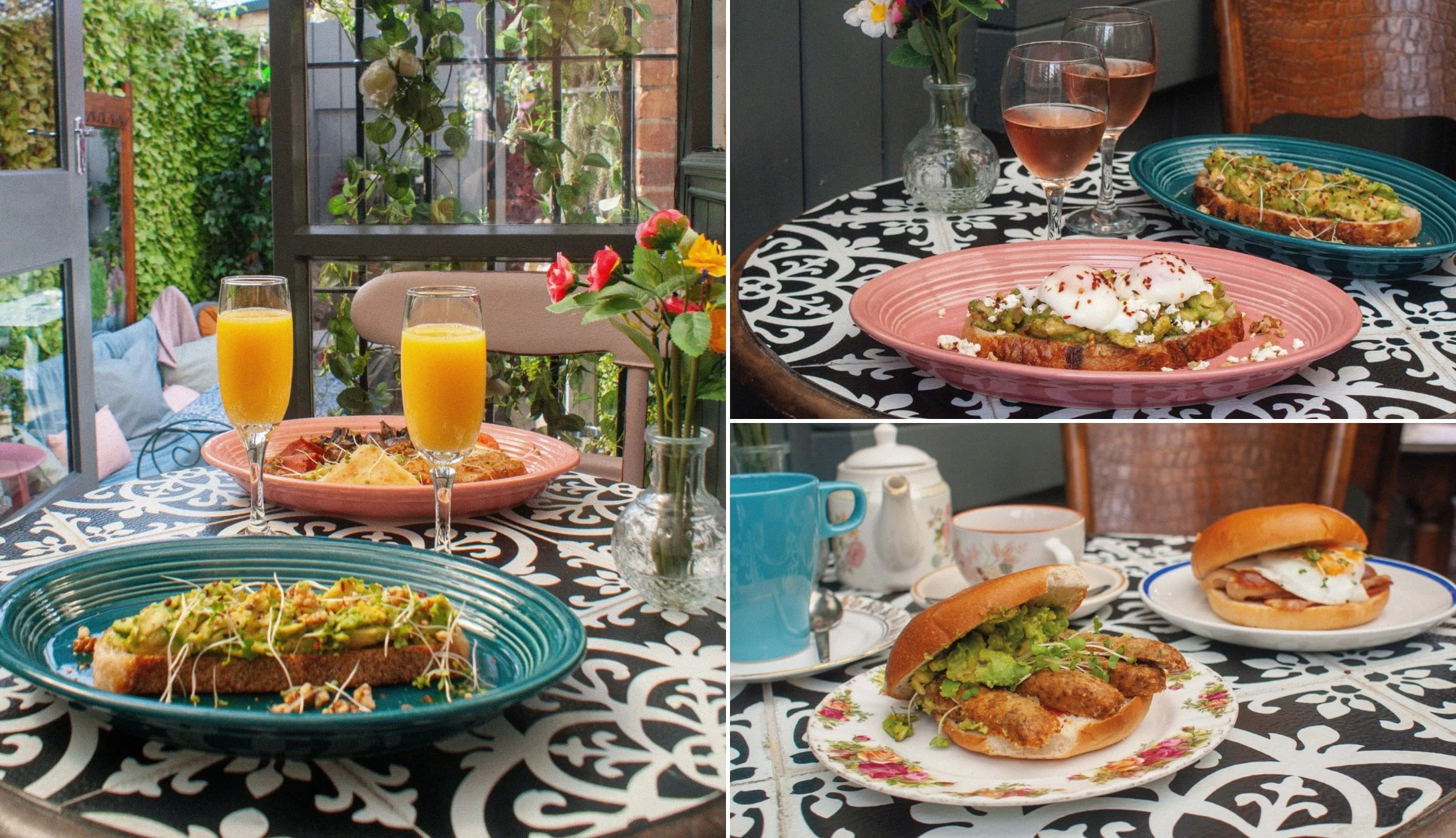
Photos via The Lamppost Cafe on FB
You’ll probably have a mighty hunger after all that travelling. Fortunately, there’s no shortage of stunning places to eat out, especially in the city centre. So, first things first, head to the heart of town. Once you’re there, you’ll find no end of cafes, restaurants, and pubs that are sure to satisfy your hunger.
Almost any good pub will do traditional Irish fayre, so if you’re looking for gorgeous soda bread, seafood, stews, and much more, you’ll have plenty of choices. Burger fans should definitely check out Bunsen on Hill Street. With a small, carefully curated menu, you can’t go wrong. Blu is another great choice, with a sleek and modern menu that caters to everyone, although for us, it’s hard to resist the steaks!
Stop 2: Crumlin Road Gaol
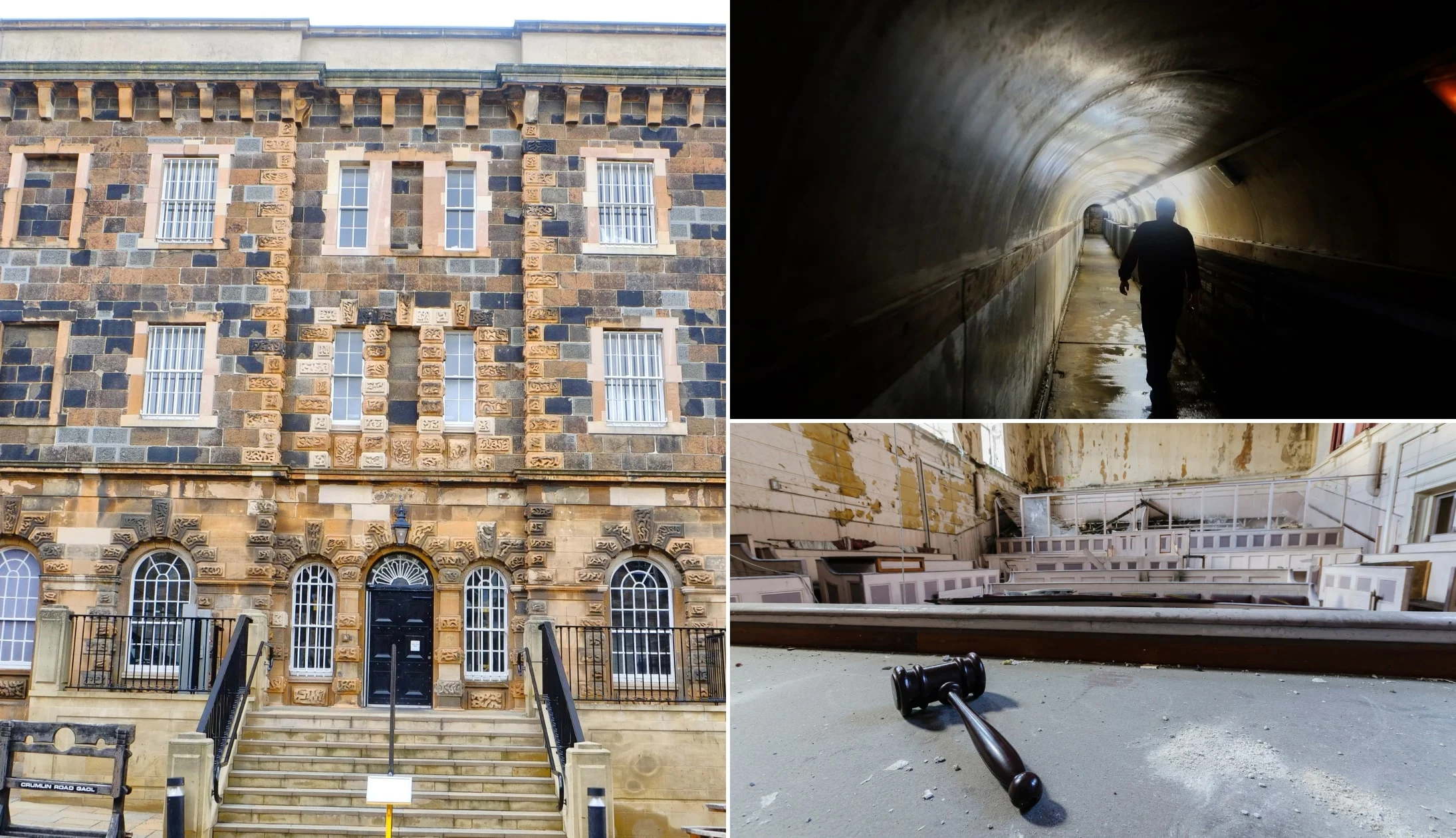
Photos via Shutterstock
After a good feed, it’s time to take in some local attractions. Crumlin Road Gaol is a leisurely 16-minute walk away from the city centre, so there’s no need to take the car if you don’t want to. If you do prefer to drive, it’ll take about 10 minutes or so and you can normally find street parking opposite or on a nearby side street.
The self-guided tour takes you on a 70-minute journey through the tunnels and corridors that make up the 150-year-old prison. Complete with information boards and videos, you’ll get to see various parts of the old gaol, including the holding cells, execution chamber, and the prison graveyard.
Stop 3: Belfast Black Cab Tour
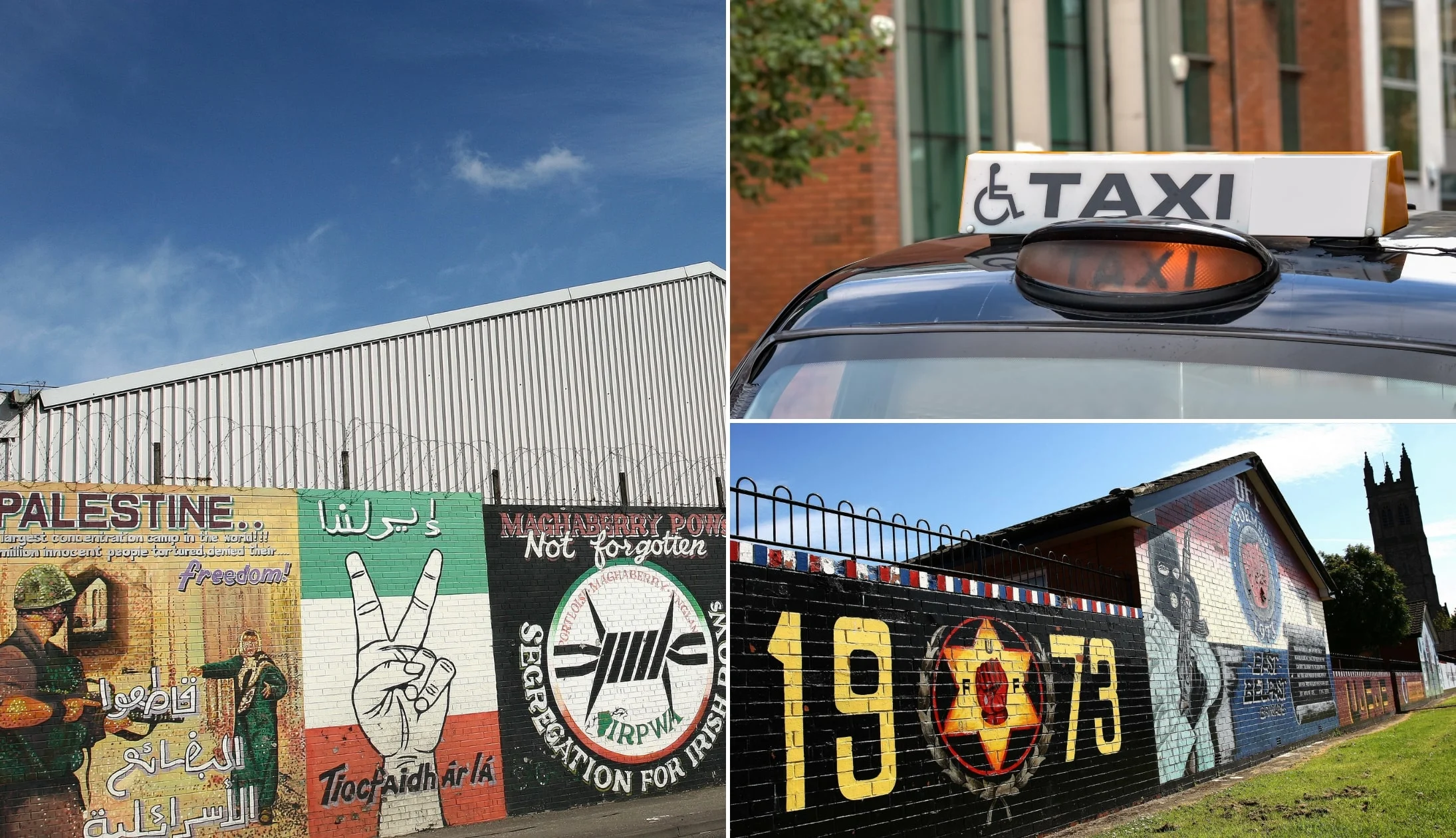
Photos via Shutterstock
The Belfast Black Cab tour offers an incredible experience that shouldn’t be missed. Each of the tour guides lived through the Troubles, lending real-life experience to the tours. You’ll pass through various parts of Belfast that you might not feel comfortable visiting by yourself. All the while, your guide will regale you with stories and first-hand accounts of the history behind each place.
You’ll also see a lot of fantastic murals and other sights, like the iconic Belfast Peace Wall. It’s a great way to learn more about Belfast’s long, rich, and sometimes sad history. Tours depart from the Jury Inn on Victoria Road, which is about a 23-minute walk from Crumlin Road Gaol.
If you’re driving, it’ll take about 7 minutes to reach Weaver’s Cross Value Car Park on Grosvenor Road. This is just a 2-minute walk to the pickup point.
Stop 4: Dinner, drinks and live music
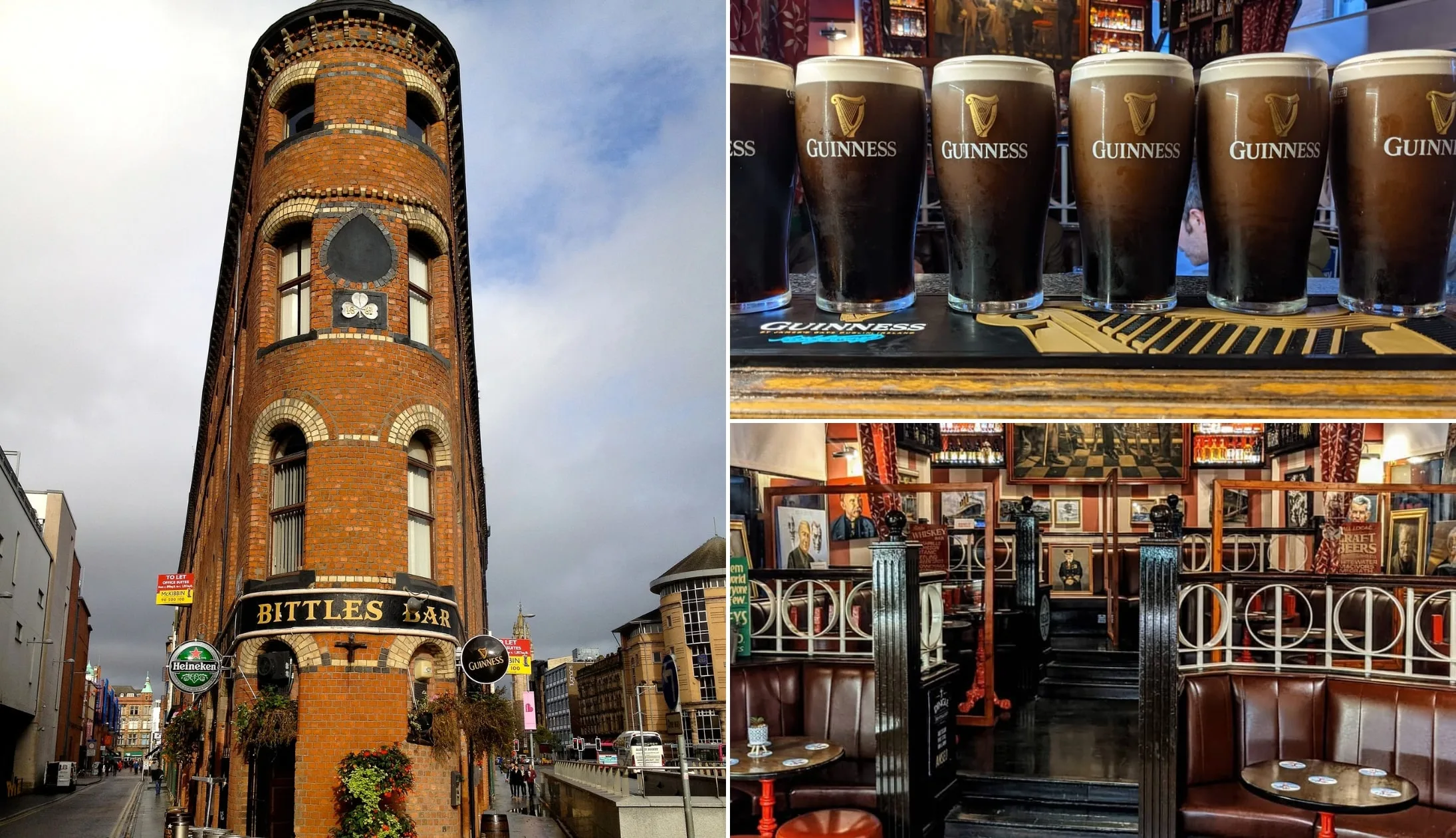
Photo left: Silvia Franceschetti (CC BY-SA 3.0). Others via Bittle’s Bar on FB
At the end of the Black Cab Tour, you’ll be dropped off back in the Cathedral Quarter, in the heart of the city.
You’ll find tons of options for food, drink, entertainment, and plenty of live music here, so whether you go back to your accommodation to freshen up first or head straight out is up to you.
Our Belfast food recommendations
There’s some outstanding restaurants in Belfast City. First up, Deanes is a Belfast institution and a must-visit while you’re in the city. There are three venues to choose from, each focusing on something different; Deanes Meat Locker, Deanes Love Fish, and Deanes at Queens.
Whichever you choose, you’re in for a fine feed. EDO is another favourite of ours, a stunning tapas and cocktail bar with incredible sharing platters.
Or, for a fancy first meal in Ireland, head to The Ginger Bistro, near the Belfast Opera House. Their menu is out of this world, though that’s no surprise when you consider it was voted the best restaurant in Northern Ireland.
Our Belfast pub recommendations
There are countless incredible pubs and bars in Belfast for a tasty after-dinner tipple. Check out traditional options like the unmistakable Bittles Bar, with its stunning range of local beer and Irish whisky.
The Duke of York is another old-school boozer, walls adorned with knick-knacks from yesteryear and serving up a fine pint of Guinness.
Finally, we couldn’t forget Madden’s Bar, a cosy, traditional pub complete with a roaring wood-burning stove and a friendly atmosphere. Somewhat overlooked, it’s a hidden gem beloved by those in the know!
Traditional musicians from across Ireland come to play at Kelly’s Cellars every Tuesday, Wednesday, Thursday, and Saturday.
Other fantastic options for music include Fibber Magees, another charmingly old-fashioned pub with a lively atmosphere, and the John Hewitt.
Day 2: The Causeway Coast
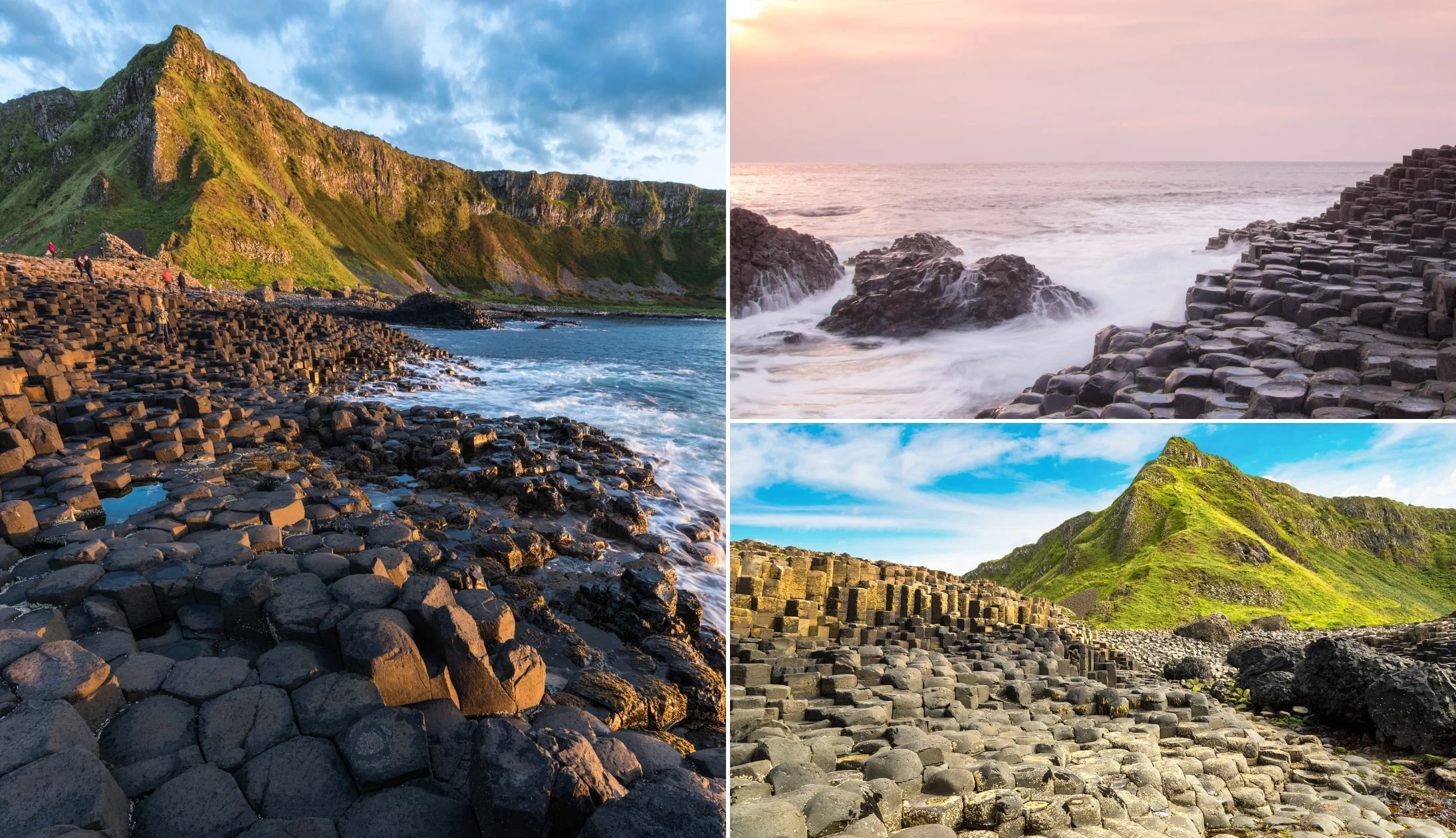
Photos via Shutterstock
After a fantastic first day enjoying the sights of the city, it’s time to hit the road and check out the incredible Causeway Coastal Route.
Of course, the highlight is the epic Giant’s Causeway, which you’ll get the chance to see up close and personal before heading back to Belfast for dinner and entertainment. But first…
You’ve got an action-packed day ahead of you, so it’s a good idea to get a hearty breakfast in you before you start! Grab a full Irish or buffet breakfast at your accommodation, or head into town to check out one of the many superb cafes.
We’d heartily recommend the Lamppost Cafe on Newtownards Road for a slap-up cooked Irish breakfast—they also have a cooked vegan breakfast. Alternatively, check out the Grapevine in the Cathedral Quarter for porridge, bagels, baps, and breakfast burritos.
Stop 1: Carrickfergus Castle
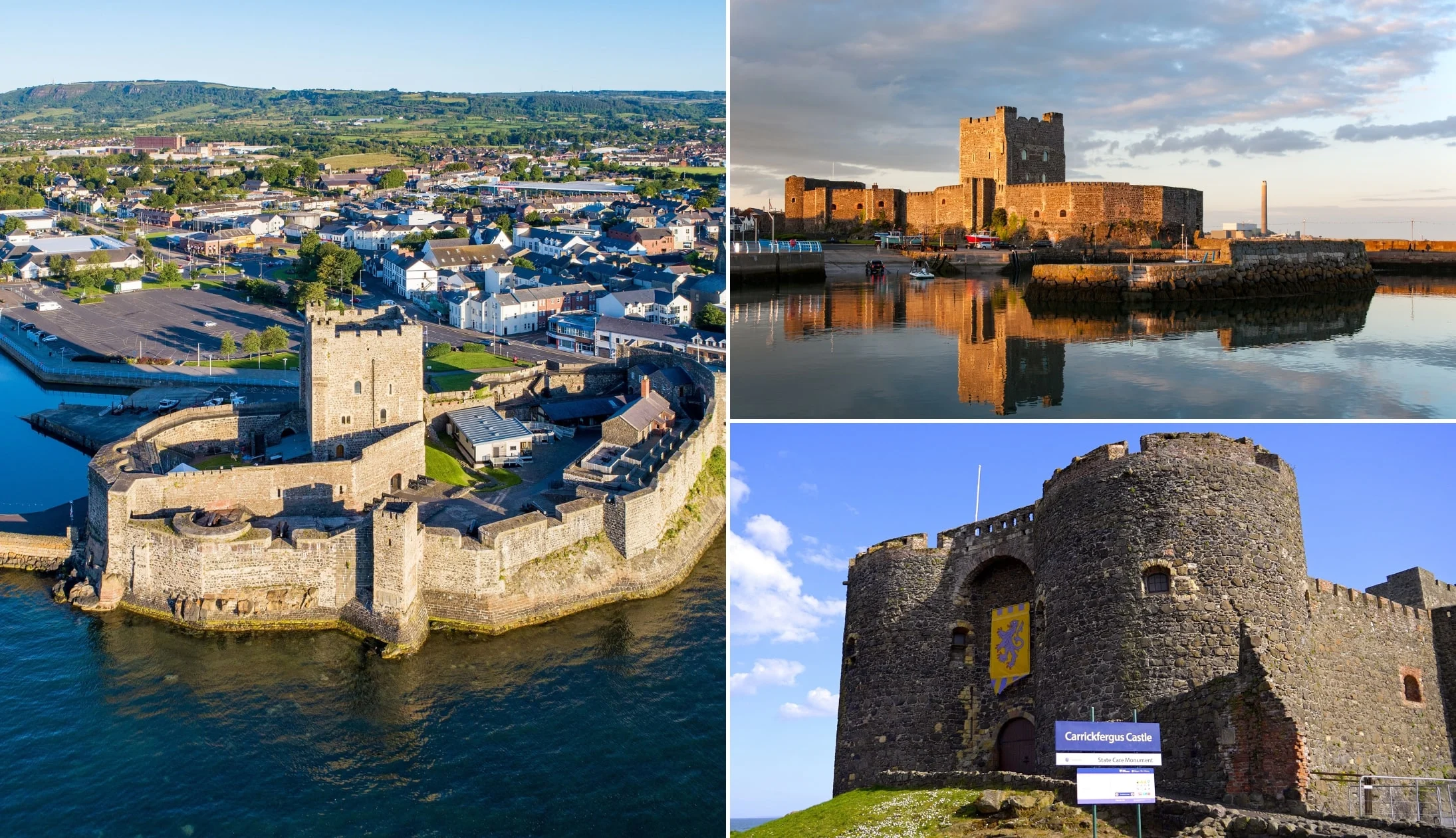
Photos via Shutterstock
Carrickfergus Castle is one of the most well-known and best-preserved castles in Ireland. It’s just a 23-minute drive from Belfast City Centre, making it an ideal first stop on your way to the Causeway Coast.
Dating back to the 12th Century, this epic fortress boasts huge walls that protect it from the sea, plus a number of mighty towers. It’s been the site of countless battles over the years, and it’s no surprise that it’s home to a ghost. The guided tour is well worth the ticket fee, although, with numerous information boards and displays, you can also enjoy a self-guided tour at your own pace.
There’s a large car park right next to the castle and the harbour. It’s free to use, has public toilets, and it’s just a short walk to the castle gates. If you fancy a little pick-me-up before you jump back in the car, NACS coffee shop is also nearby and they serve up a superb cup of coffee as well as cakes and snacks.
Stop 2: Chaine Memorial Tower
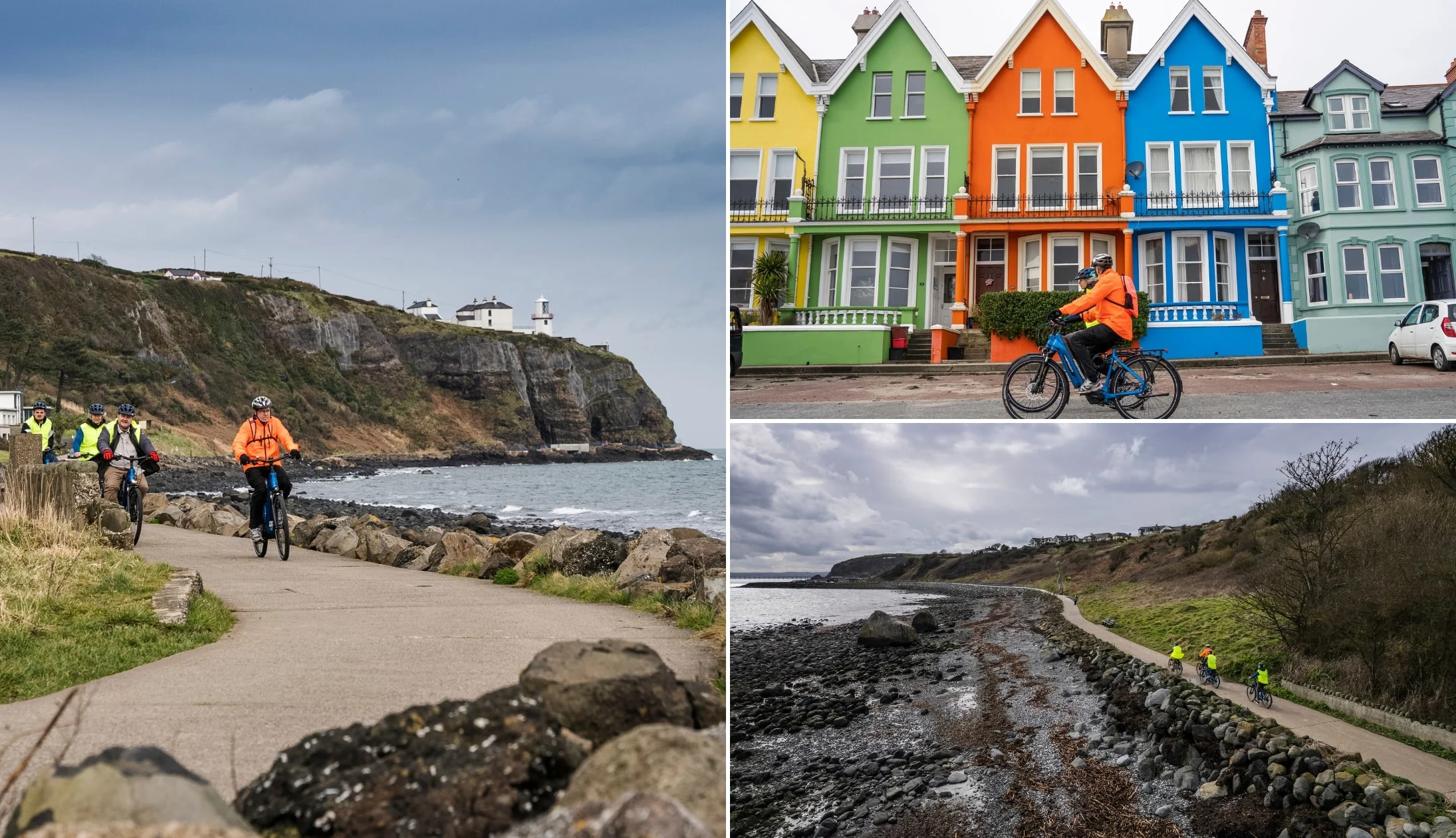
Courtesy of Mid and East Antrim council @grafters media
Our next stop is the Chaine Memorial Tower, around 26 minutes away from Carrickfergus Castle. Known locally as “The Pencil”, it’s an impressive beacon tower made from Irish Granite. It stands 27 metres tall in memory of the late James Chaine of Ballycraigy and Cairncastle. James Chaine represented Ireland in the Imperial Parliament of Great Britain and Ireland from 1874 until 1885 and founded the sea route from Larne to mainland Scotland.
Well-loved by the community, the tower and the road up to it were erected in his honour. In the following years, it was converted into a lighthouse. There’s a nice, short, flat walk that’ll take you up to it, boasting breathtaking views out to sea.
Stop 3: The Black Arch
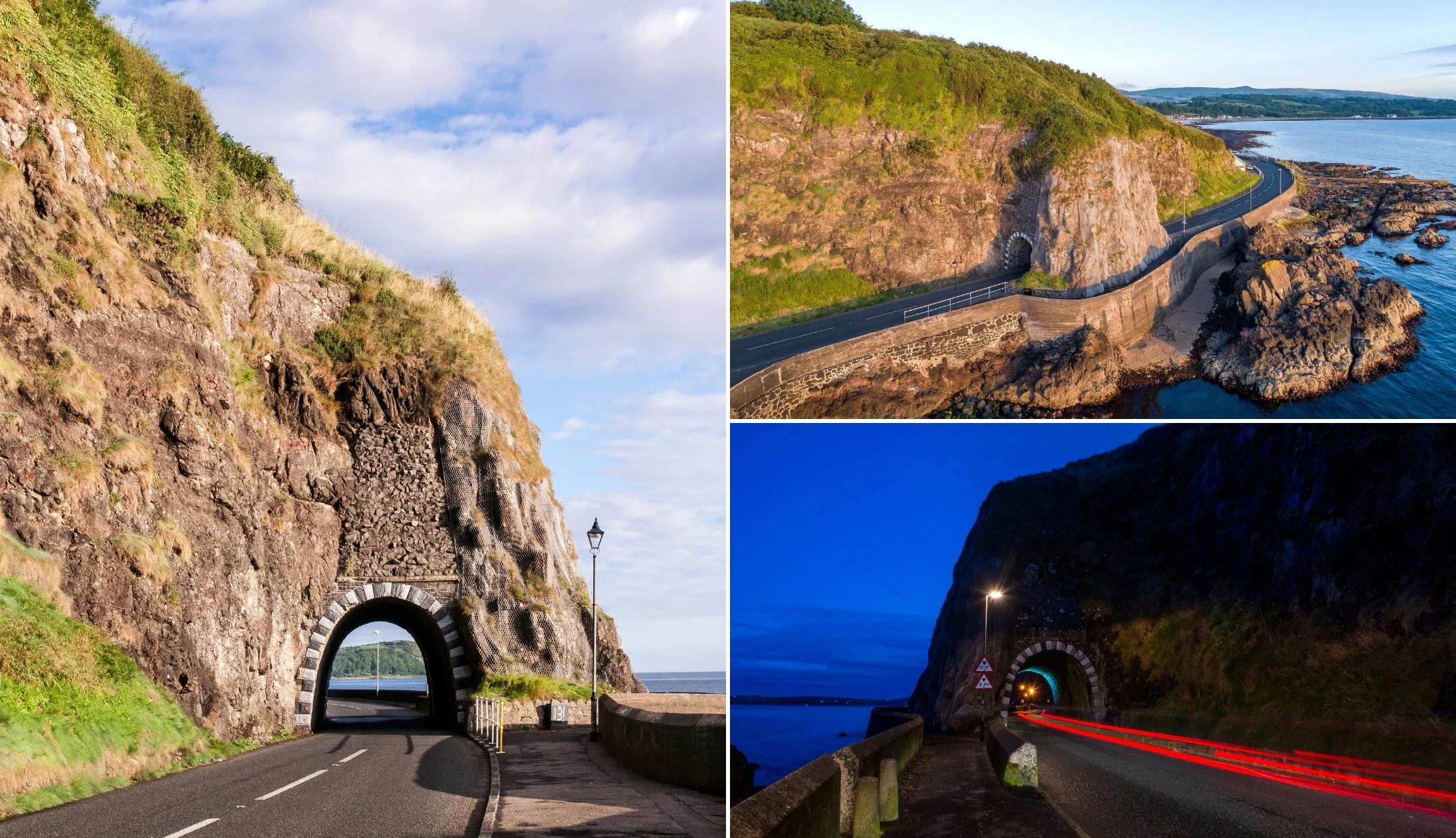
Photos via Shutterstock
The epic Black Arch isn’t really a stop in itself. It’s actually just a short tunnel that you’ll drive through as you cruise along the Antrim Coast Road. The road clings to the sea, with cliffs looming up on the other side.
As you approach Larne, about a 23-minute drive from Chaine Memorial Tower, the craggy cliffs cross over the road, which tunnels through. It’s only short, but it looks pretty cool and is a popular spot for photographers.
Stop 4: Cushendun Beach
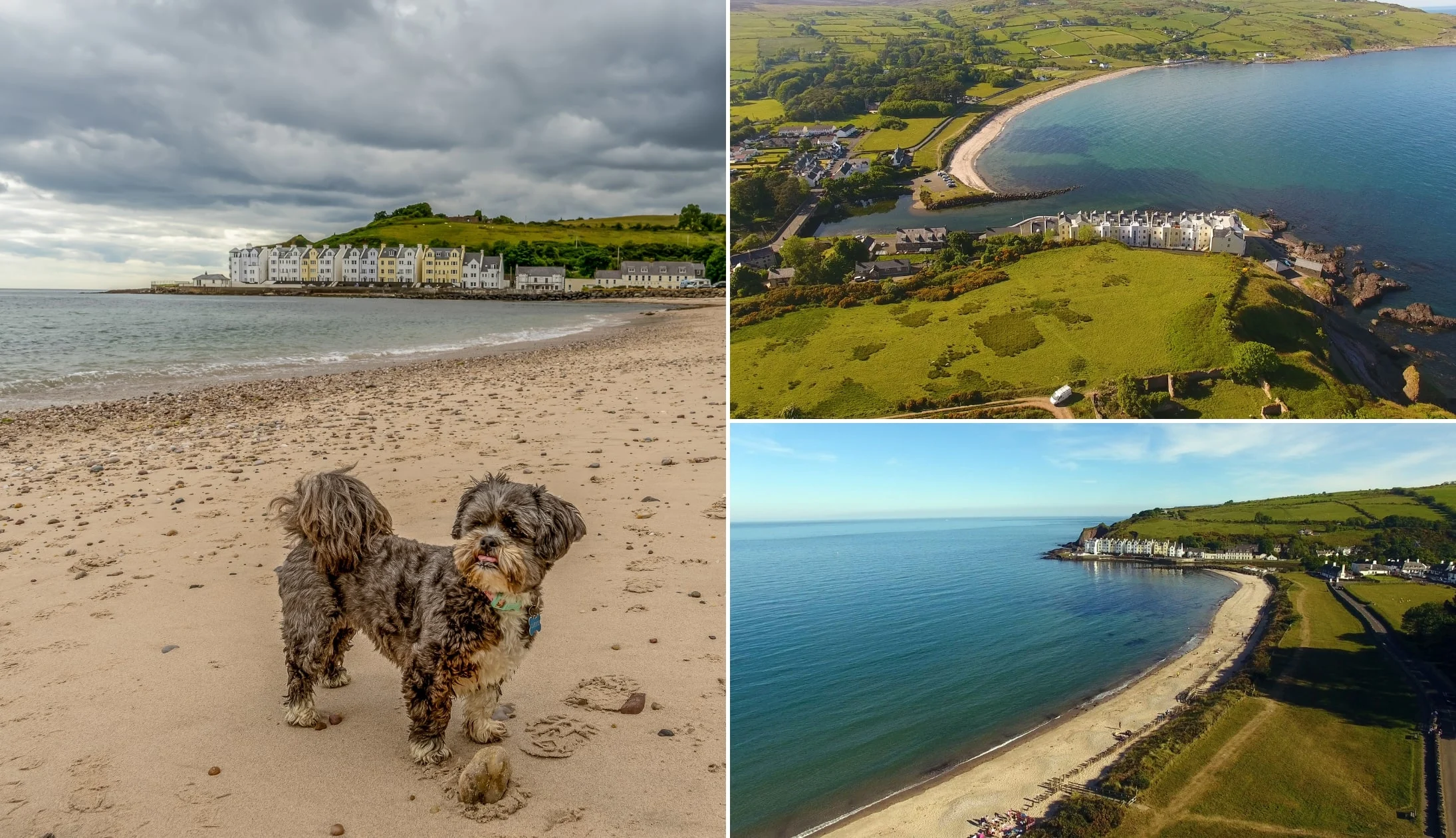
Photos via Shutterstock
The coast road is absolutely stunning between the Black Arch and your next stop, Cushendun Beach. This lovely sandy bay is a fantastic place to relax and gaze out across the sea.
On a clear day, you might even see the Scottish Coast. If you fancy stretching your legs, it’s worth walking to the nearby Cushendun Caves, which are famous for appearing in the Game of Thrones series. Alternatively, there’s a 2km looped walk around the beach and village.
It’ll take about 48 minutes to reach Cushendun Beach from the Black Arch, and there’s plenty of free parking to be found, as well as public toilets.
Stop 5: Lunch in Ballycastle
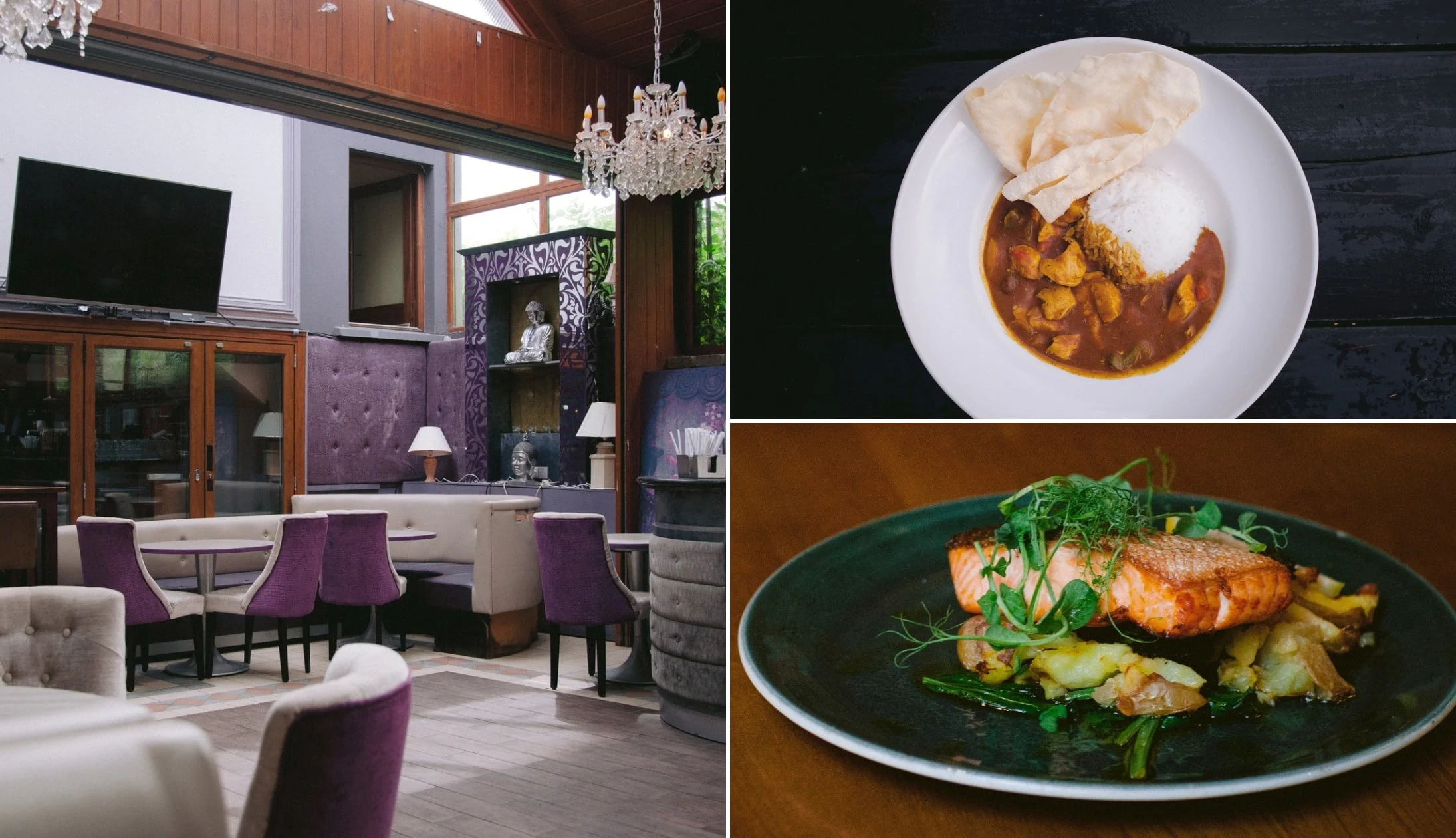
Photos via Central Bar Ballycastle on FB
After a short 22-minute drive from Cushendun Beach, you’ll arrive in the bustling seaside town of Ballycastle. The town boasts a gorgeous location, surrounded by sea, sand, mountains, and forests, and is ideally placed on the Antrim Coastal Route. The former Viking settlement is a top spot for a bit of lunch too.
Morton’s Fish and Chips is our favourite place for a bite to eat. It’s right on the harbour, with a small car park next to it. The food is great, and on a fine day, there are few things better than sitting on the harbour wall watching the boats go by with a nice hot bag of fish and chips. If you’re looking for something other than chipper food, check out the Central Bar. Their menu boasts a fine selection of fresh seafood, steaks, and much more.
After lunch, there’s plenty to see and do in Ballycastle, including various craft shops, the beach, or simply wandering about town. If you’re there on the last Tuesday in August, you can also check out the Old Lammas Fair.
Stop 6: Carrick-a-Rede
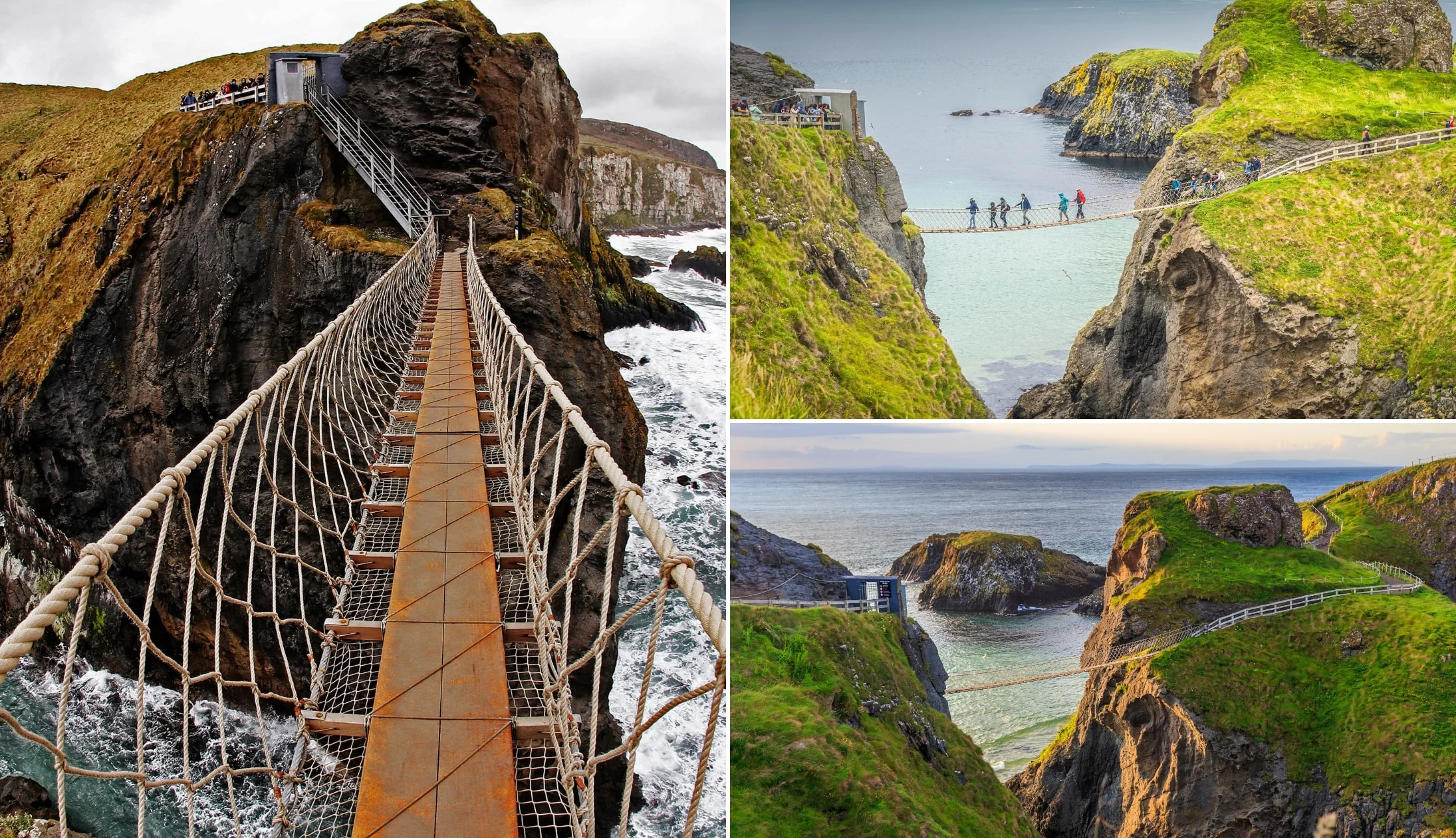
Photos via Shutterstock
The next stop is just 11 minutes outside of Ballycastle. Carrick-a-Rede is a small island just off the Causeway Coast. It’s attached to the mainland by an old rope bridge and was once a top spot for salmon fishing. Nowadays, you can enjoy a short coastal walk that culminates in crossing the bridge.
Swinging 25 feet above the sea as it crashes against the rocks below, it’s not great for those with a fear of heights! The entire walk will typically take an hour or so in total and offers spectacular views and a thrilling experience. We recommend checking the bridge out in the off-season rather than the height of summer, as it does get busy.
Stop 7: Giants Causeway

Photos via Shutterstock
After the dizzying heights of Carrick-a-Rede, you’ll arrive at the epic Giant’s Causeway in about 18 minutes. This legendary landscape boasts more than 40,000 basalt pillars, jutting proudly out from the sea. In Irish folklore, the path was used by the hero Fionn Mac Cumhaill to get to Scotland, where he fought an enemy giant.
It was formed more than 60 million years ago and has been studied by geologists for more than 300 years, making it one of the most important and unique nature reserves on earth. Now, parking at the Giant’s Causeway Visitor Centre is the most convenient but also extremely expensive. A more affordable alternative is to park at the nearby Causeway Coast Way Car Park and walk down.
You can easily spend a couple of hours at the Giant’s Causeway, especially if you do decide to check out the visitor centre. Just be advised it can be crazy busy on weekends and during the high season.
Stop 8: Bushmills
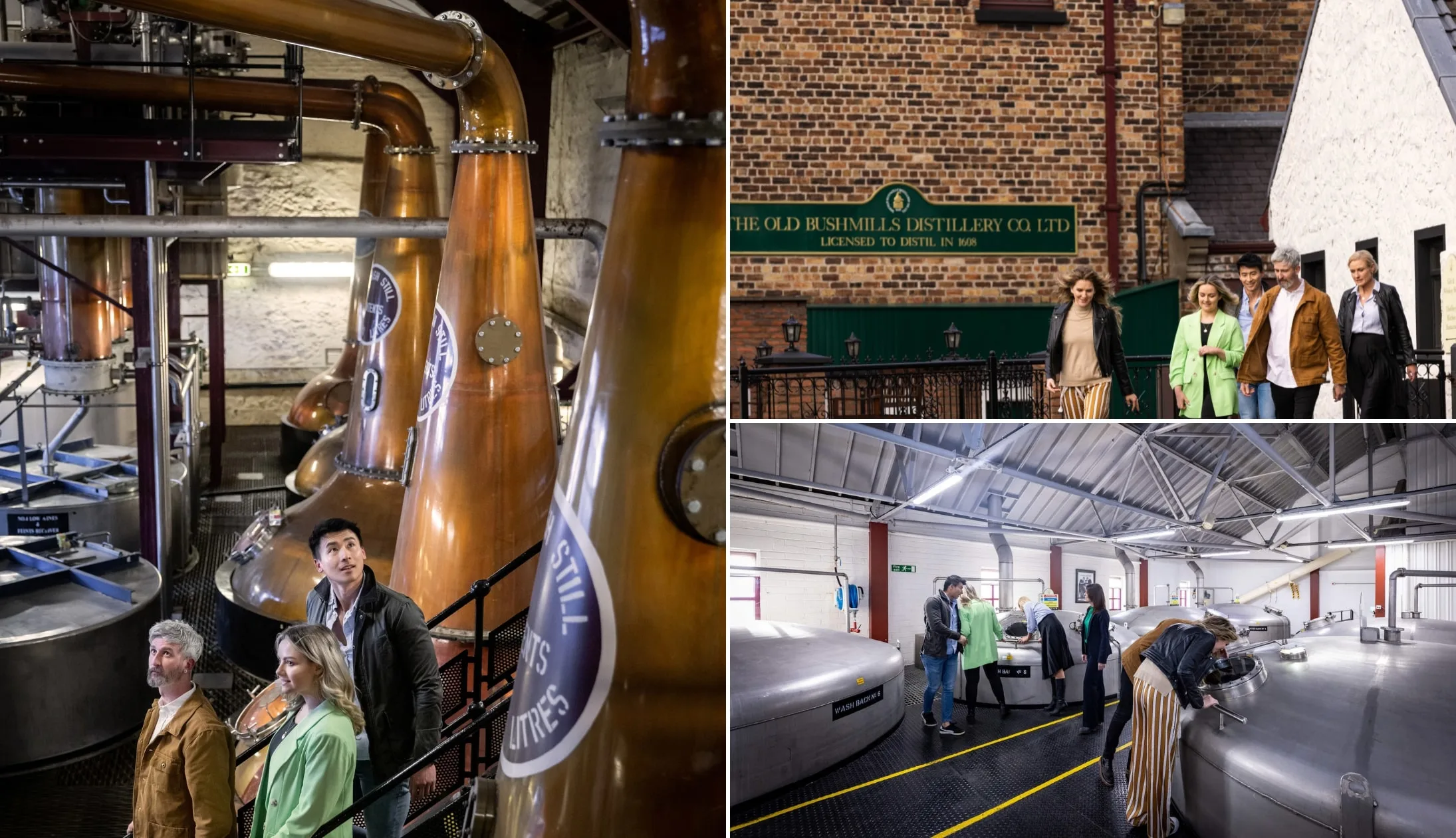
Photos courtesy of Tourism Northern Ireland
Once you’ve finished exploring the Giant’s Causeway, your next stop is just a quick 9-minute drive away. The small, riverside town of Bushmills is home to some great pubs and shops, and it’s a nice place to wander around.
However, the Bushmills Distillery is the highlight and well worth a visit. The oldest licensed distillery in the world, you don’t have to be a whiskey drinker to enjoy a tour of the facilities, though it doesn’t hurt if you do enjoy a wee dram every now and then!
Along the 40-minute tour, you’ll get a chance to see, smell, and hear how Irish whiskey is made in the company of a knowledgeable tour guide. The tours are a good laugh, culminating in a fantastic tasting session. Having said that, it’s better to take some samples with you if you’re driving.
Stop 9: Dunluce Castle
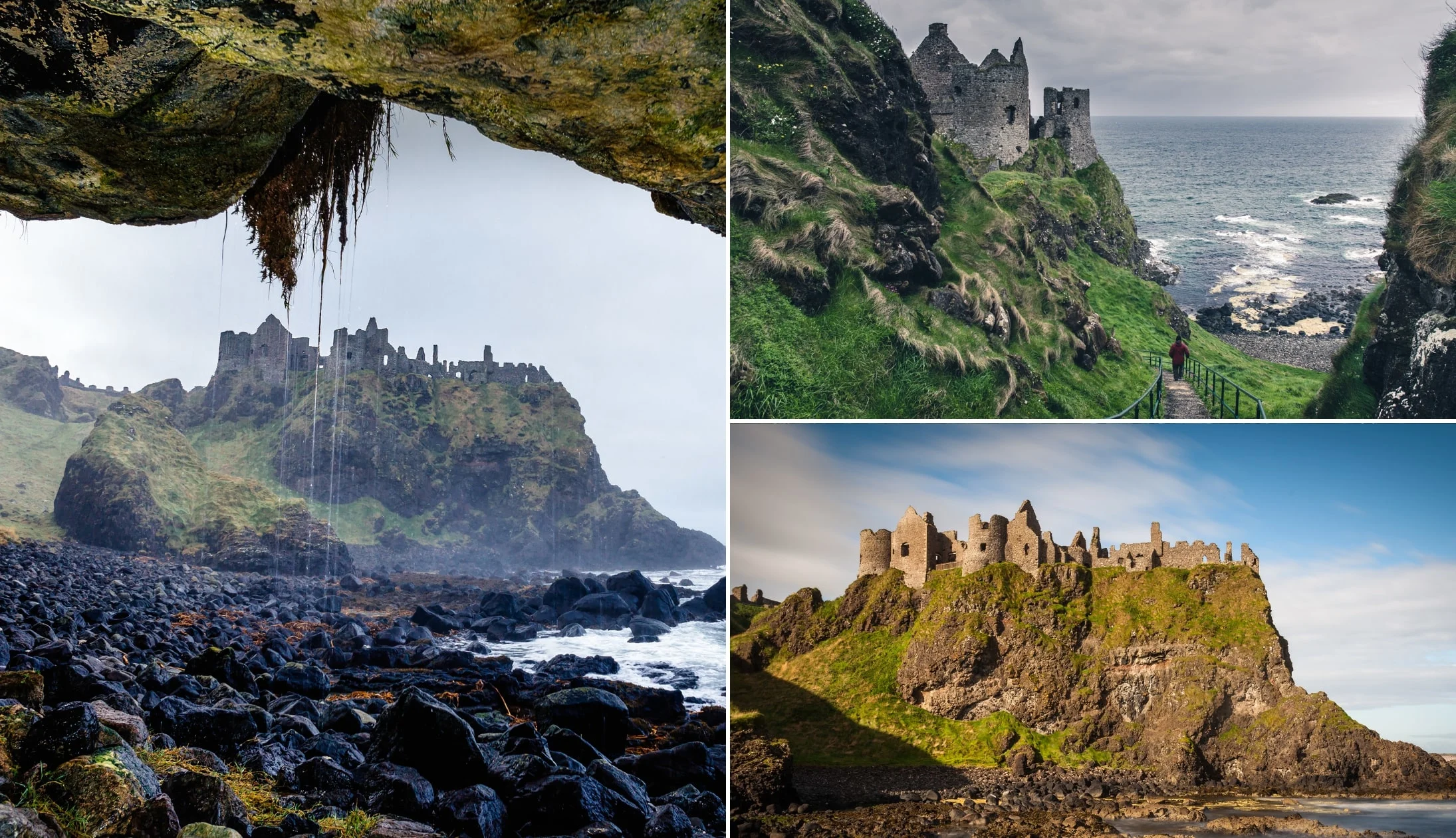
Photos via Shutterstock
Our final stop for the day before returning to Belfast is the legendary Dunluce Castle. It’s just a 7-minute drive from Bushmills, and a wander around the castle ruins is well worth it. Dunluce Castle dates back to the 1500s and is rich in history.
Of course, there are several legends, most notably the Dunluce Banshee, whose wails and screams are said to haunt the Northeast Tower. It’s another top spot for Game of Thrones fans, too—the castle served as the Greyjoy fortress on the Iron Isles.
You can enjoy a guided or self-guided tour of the grounds, or if you prefer not to go in, you can enjoy viewing it from afar at a nearby viewpoint.
Stop 10: Back to Belfast for the night

Photo left: Silvia Franceschetti (CC BY-SA 3.0). Others via Bittle’s Bar on FB
Taking a more direct route back will have you in Belfast in about an hour and 15 minutes or so. Once you’re there, you should have ample time to freshen up at your accommodation before hitting the town and getting some dinner and drinks in.
You’ll find tons of options for food, drink, entertainment, and plenty of live music here, so whether you go back to your accommodation to freshen up first or head straight out is up to you.
Our Belfast food recommendations
There’s some outstanding restaurants in Belfast City. First up, Deanes is a Belfast institution and a must-visit while you’re in the city. There are three venues to choose from, each focusing on something different; Deanes Meat Locker, Deanes Love Fish, and Deanes at Queens.
Whichever you choose, you’re in for a fine feed. EDO is another favourite of ours, a stunning tapas and cocktail bar with incredible sharing platters.
Or, for a fancy meal, head to The Ginger Bistro near the Belfast Opera House. Their menu is out of this world, though that’s no surprise when you consider it was voted the best restaurant in Northern Ireland.
Our Belfast pub recommendations
There are countless incredible pubs and bars in Belfast for a tasty after-dinner tipple. Check out traditional options like the unmistakable Bittles Bar, with its stunning range of local beer and Irish whisky.
The Duke of York is another old-school boozer, walls adorned with knick-knacks from yesteryear and serving up a fine pint of Guinness.
Finally, we couldn’t forget Madden’s Bar, a cosy, traditional pub complete with a roaring wood-burning stove and a friendly atmosphere. Somewhat overlooked, it’s a hidden gem beloved by those in the know!
Traditional musicians from across Ireland come to play at Kelly’s Cellars every Tuesday, Wednesday, Thursday, and Saturday.
Other fantastic options for music include Fibber Magees, another charmingly old-fashioned pub with a lively atmosphere, and the John Hewitt.
Day 3: Exploring more of Belfast City
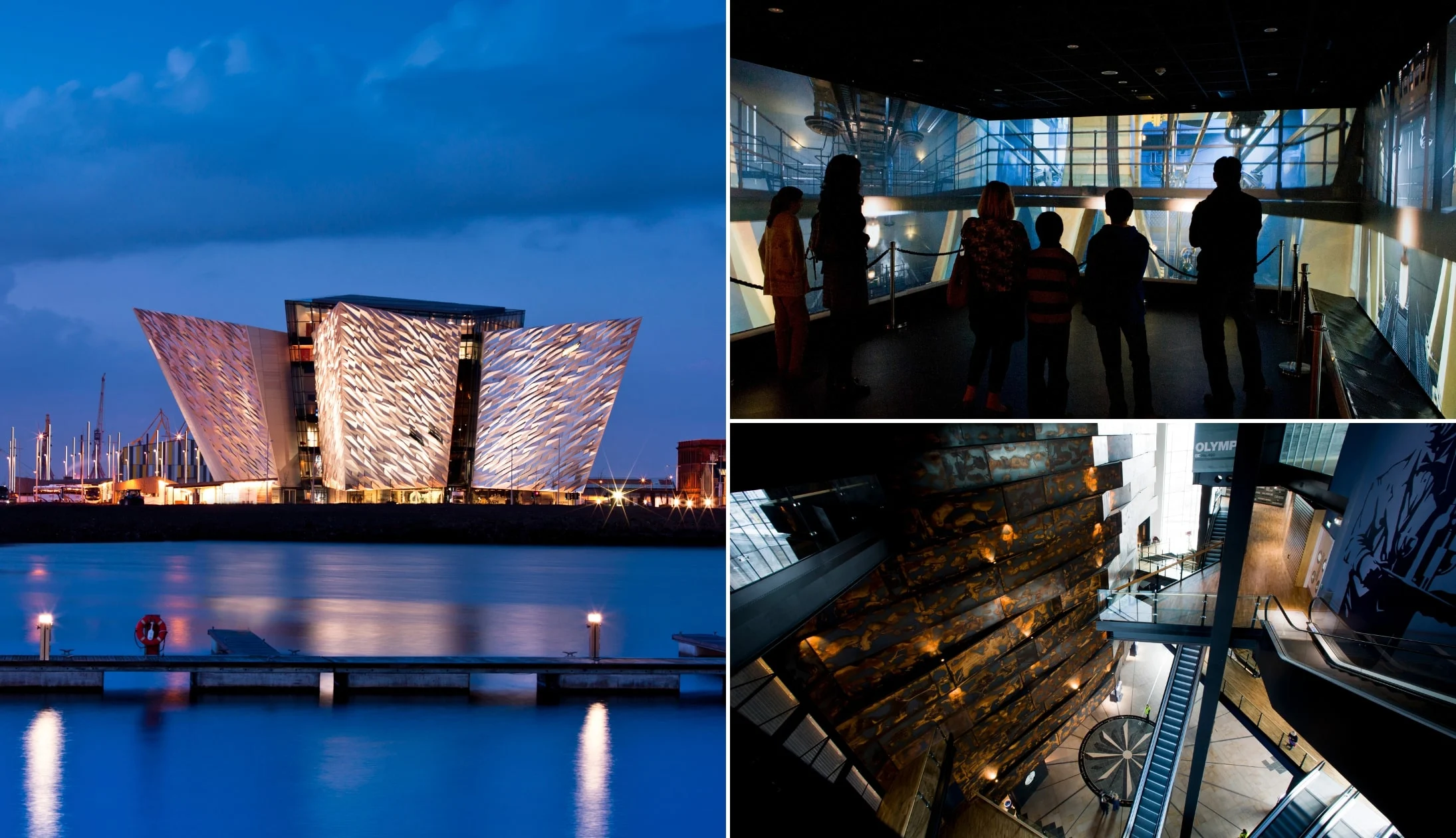
Photos by Chris Hill via Tourism Ireland
After a fantastic day exploring the countryside yesterday, today we’ll be enjoying more of Belfast City’s top attractions.
You’ll be driving to most of these, though some are within fairly short walking distance of one another if you prefer.
We’ve got quite a busy day lined up, so you’ll want to grab a hearty breakfast at your accommodation or in a nearby cafe. We’d recommend Established Coffee on Hill Street for a decent selection of cooked breakfasts, great coffee, and pastries. Alternatively, The Pocket on Upper Church Lane does a stunning full Irish fry-up and a bunch of veggie and vegan options.
Stop 1: Belfast Castle
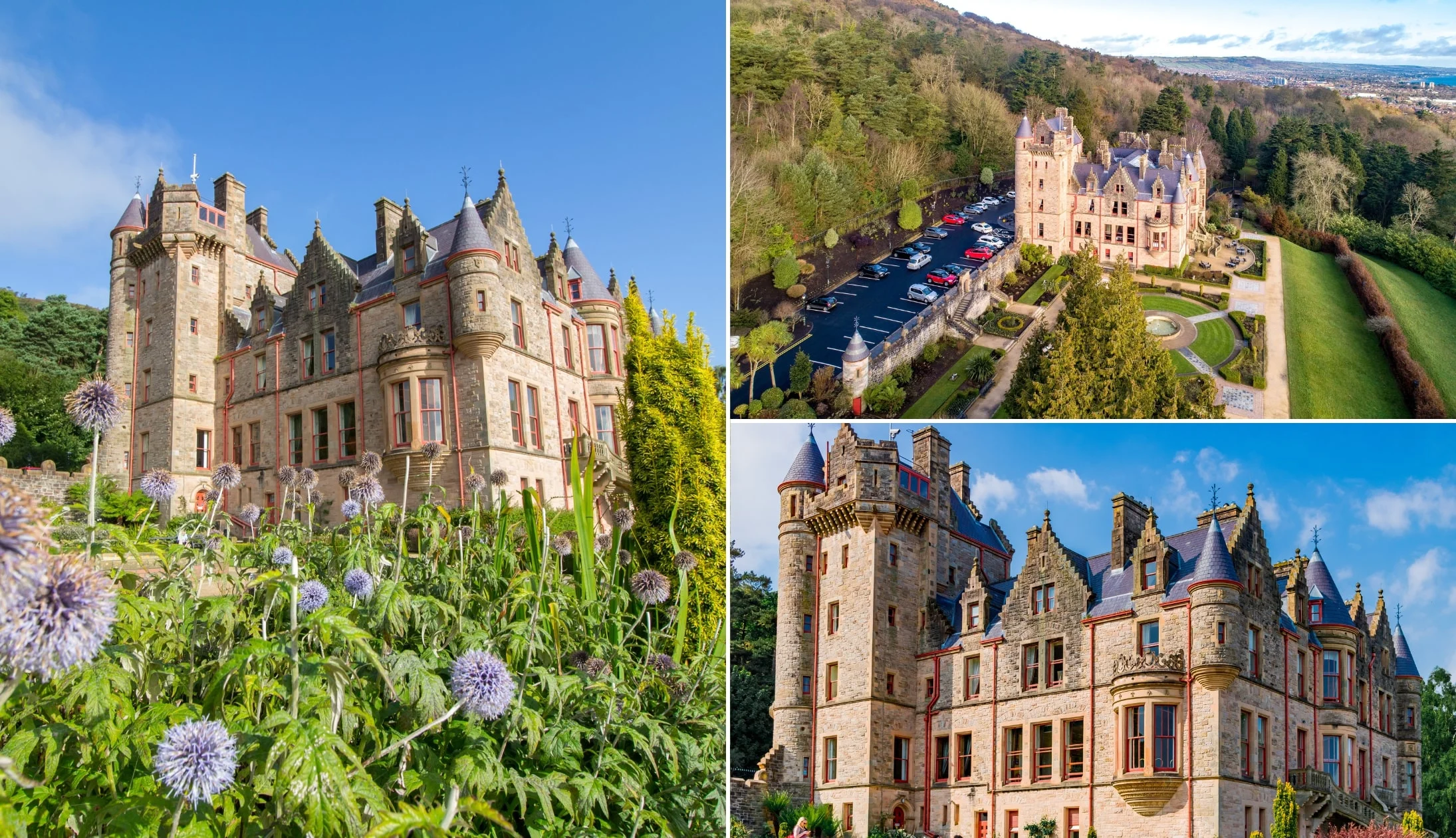
Photos via Shutterstock
Our first stop is the Disney-esque Belfast Castle, a 16-minute drive from the city centre. The gorgeous turreted castle dates back to 1862, although a castle has stood on this site since the 12th century. The current iteration is absolutely stunning inside and out, and it’s well worth taking a self-guided tour of the gorgeous grounds, gardens, and public rooms on the ground and first floors.
Be sure to head up to the second floor to check out the Cave Hill Visitor Centre too. It’s free to visit and has four rooms of exhibits and an 8-minute film about Cave Hill and Belfast Castle. In fact, there’s no fee at all to visit the castle, though you may want to take some cash for the cafe! There’s a large car park, though it can get busy on weekends, especially in summer.
Stop 2: Ulster Museum and Botanic Gardens
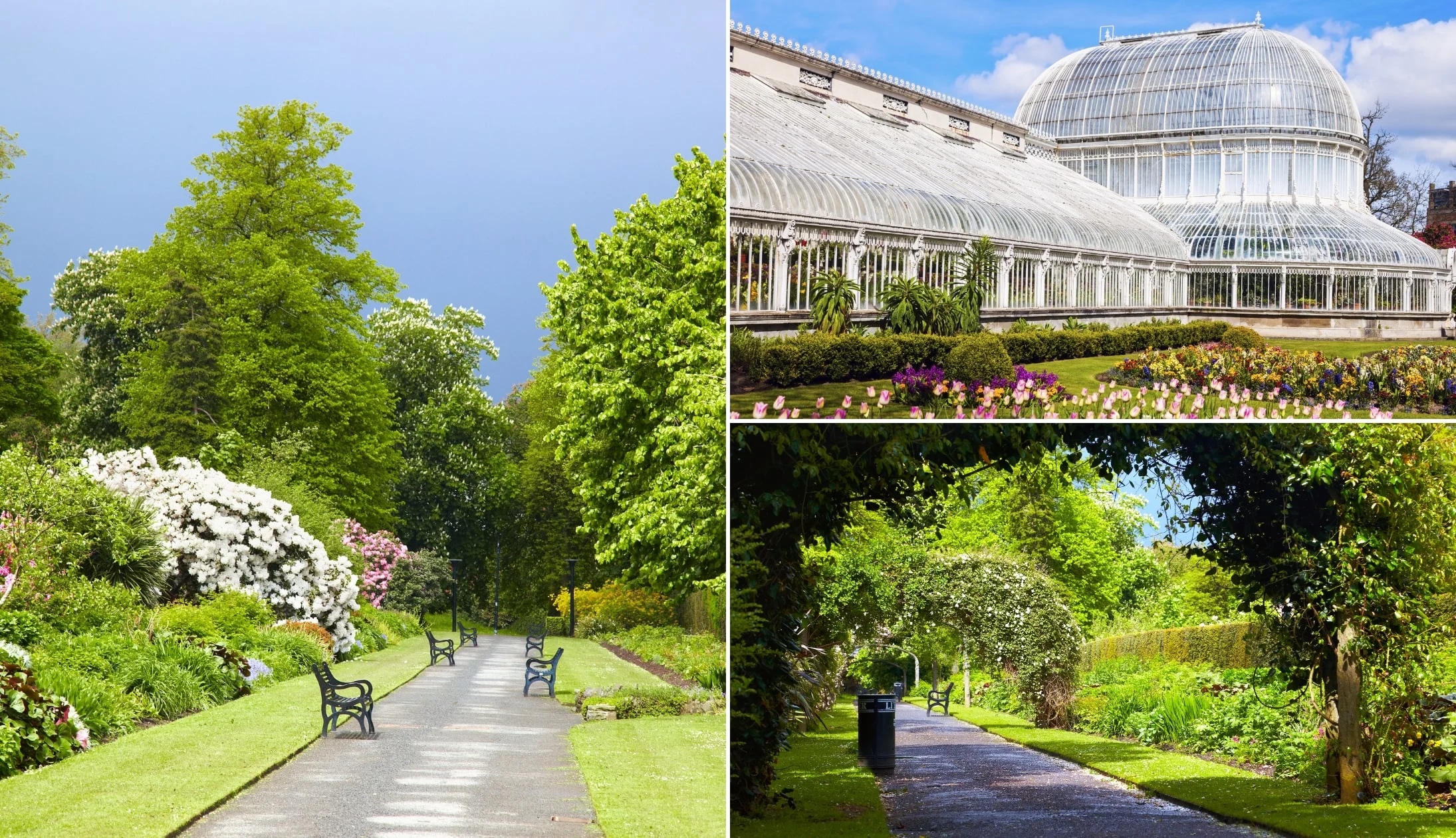
Photos via Shutterstock
We’re heading back into town now to visit the excellent Ulster Museum and Botanic Gardens. It’s about 26 minutes away from the castle and while there’s no designated car park, you’ll often find plenty of street parking nearby. The Ulster Museum is located at the entrance to the Botanic Gardens, making it easy to visit both at the same time.
Free to enter, the museum boasts some stunning collections and exhibits, including dinosaurs and an Egyptian mummy. It’s a fascinating place to learn about the history of Northern Ireland, with a focus on both art and the natural sciences.
Meanwhile, the botanical gardens date back to 1828 and provide a gorgeously green environment to explore that’s home to a variety of stunning rare plants. Check out the glasshouses to see the tropical plants, or follow the lovely Botanic Gardens Walk.
Stop 3: Lunch in the Cathedral Quarter

Photos via The Lamppost Cafe on FB
The Cathedral Quarter is the beating heart of Belfast, and there are plenty of great places to grab lunch. From the Botanic Garden, it’s about a 15-minute drive, and you’ll find a number of handy pay and display car parks in the area, as well as paid street parking. Q-Park at Victoria Square is a good choice and is walking distance to a variety of cafes, shops, and pubs.
If you’re lucky enough to be in town on a Friday, Saturday, or Sunday, be sure to drop by St George’s Market. This vibrant marketplace boasts deliciously fresh produce and a wealth of arts and crafts. It’s also home to some great places to eat, serving up an array of dishes, from soup and seafood to foreign cuisine and pies. Alternatively check out The Lamppost Cafe for some comforting home-cooked dishes, including a number of vegan options.
Stop 4: SS Nomadic
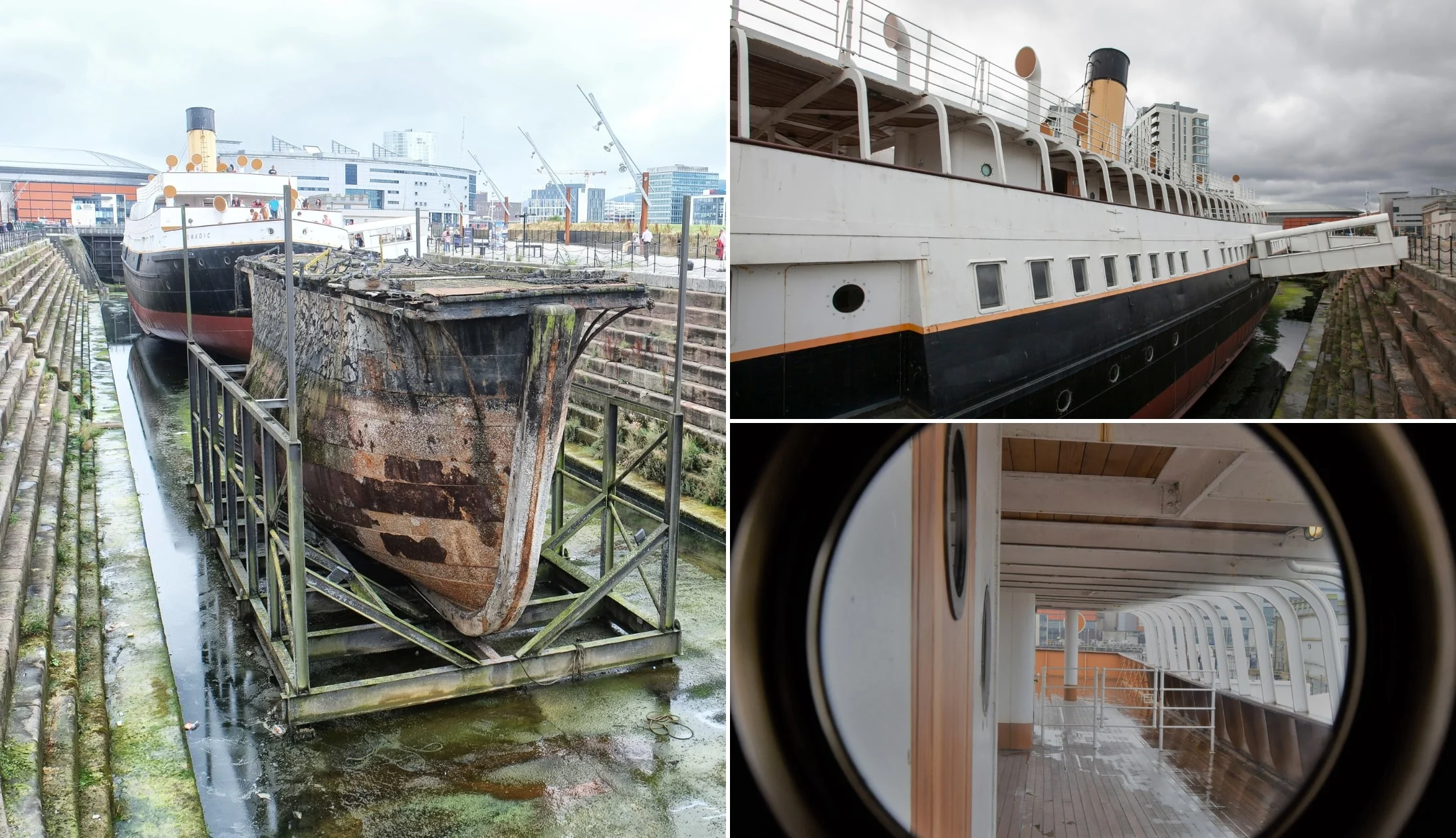
Photos via Shutterstock
After enjoying a tasty lunch, it’s a six-minute drive to our next stop; SS Nomadic. Or, if you don’t want to lose your parking spot, you can walk here from the Cathedral Quarter in around 20 minutes or so.
The SS Nomadic is moored at Hamilton Dock in the Titanic Quarter of Belfast, and is part of the Titanic Experience, our next stop. Admission to the SS Nomadic is included in your ticket to the Titanic Experience, though you can pay an additional £10 for a guided tour.
SS Nomadic has a long and interesting history. Launched in 1911, it was originally used to ferry passengers onto cruise liners, including the Titanic. During the war, it served as a minesweeper in France. It’s a fascinating ship to walk around, and there’s loads to see along the way.
Stop 5: Titanic Experience

Photos by Chris Hill via Tourism Ireland
Just a 5-minute walk from SS Nomadic, the Titanic Experience is one of Belfast’s most popular attractions.
Located right on the slipways where RMS Titanic was designed, built and launched, the enigmatic Titanic Museum tells the now-infamous story incredibly well. Visitors can expect exhibits, replica staterooms, photos, documents and 21st century technology. You’ll see, hear and even SMELL the shipbuilding process during your tour!
Stop 6: Dinner, drinks and live music

Photo left: Silvia Franceschetti (CC BY-SA 3.0). Others via Bittle’s Bar on FB
This will be your last night in the city for a while, so make sure to check out anything you’ve missed so far. It should take just under an hour to reach the city and your accommodation.
You’ll find tons of options for food, drink, entertainment, and plenty of live music here, so whether you go back to your accommodation to freshen up first or head straight out is up to you.
Our Belfast food recommendations
There’s some outstanding restaurants in Belfast City. First up, Deanes is a Belfast institution and a must-visit while you’re in the city. There are three venues to choose from, each focusing on something different; Deanes Meat Locker, Deanes Love Fish, and Deanes at Queens.
Whichever you choose, you’re in for a fine feed. EDO is another favourite of ours, a stunning tapas and cocktail bar with incredible sharing platters.
Or, for a fancy meal, head to The Ginger Bistro, near the Belfast Opera House. Their menu is out of this world, though that’s no surprise when you consider it was voted the best restaurant in Northern Ireland.
Our Belfast pub recommendations
There are countless incredible pubs and bars in Belfast for a tasty after-dinner tipple. Check out traditional options like the unmistakable Bittles Bar, with its stunning range of local beer and Irish whisky.
The Duke of York is another old-school boozer, walls adorned with knick-knacks from yesteryear and serving up a fine pint of Guinness.
Finally, we couldn’t forget Madden’s Bar, a cosy, traditional pub complete with a roaring wood-burning stove and a friendly atmosphere. Somewhat overlooked, it’s a hidden gem beloved by those in the know!
Traditional musicians from across Ireland come to play at Kelly’s Cellars every Tuesday, Wednesday, Thursday, and Saturday.
Other fantastic options for music include Fibber Magees, another charmingly old-fashioned pub with a lively atmosphere, and the John Hewitt.
Day 4: The trip to Sligo via Donegal
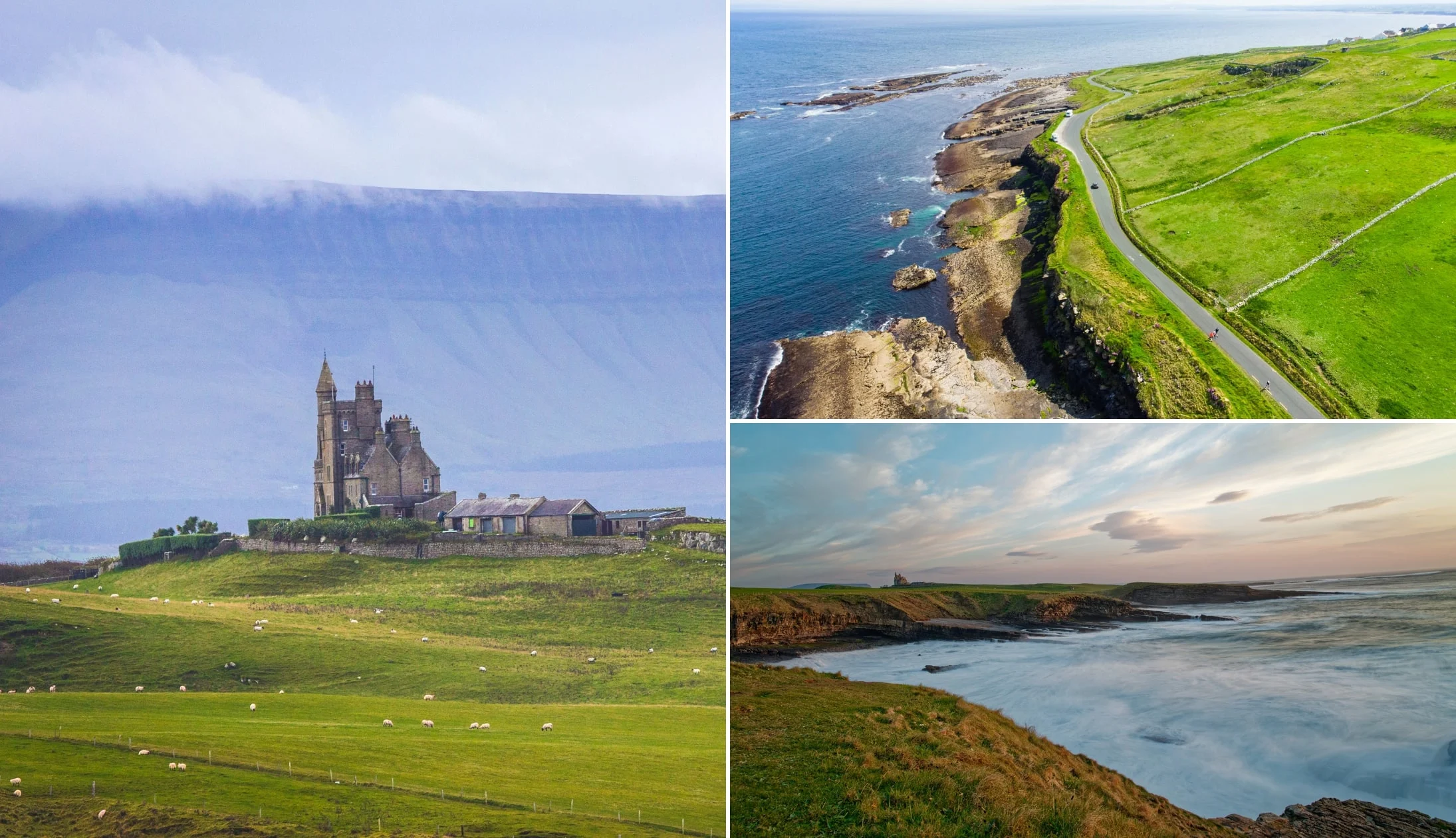
Photos via Shutterstock
Today we’ll leave Belfast behind and head to the fantastic County Sligo. Along the way, we’ll visit a few sights and attractions in County Donegal.
We have a good mix of scenic drives and leg-stretching walks planned for day six, but we’ll leave plenty of time to explore Sligo Town in the evening.
We’ll be spending two nights in Sligo Town, so be sure to book your accommodation in advance.
Our Sligo accommodation recommendations
- Budget: Old Fort B&B (great reviews and a 7-minute spin from town) and Tranquility B&B (solid reviews and 5-minute drive from town)
- Mid-range: Riverside Hotel (central with great reviews) and Sligo Southern Hotel (10-minute stroll into town and nice and comfy)
- Upper-range: The Glasshouse (right by the river in the town – close to everything) and the Clayton Hotel (5-minute drive to town with swimming pool)
Stop 1: Glenveagh National Park
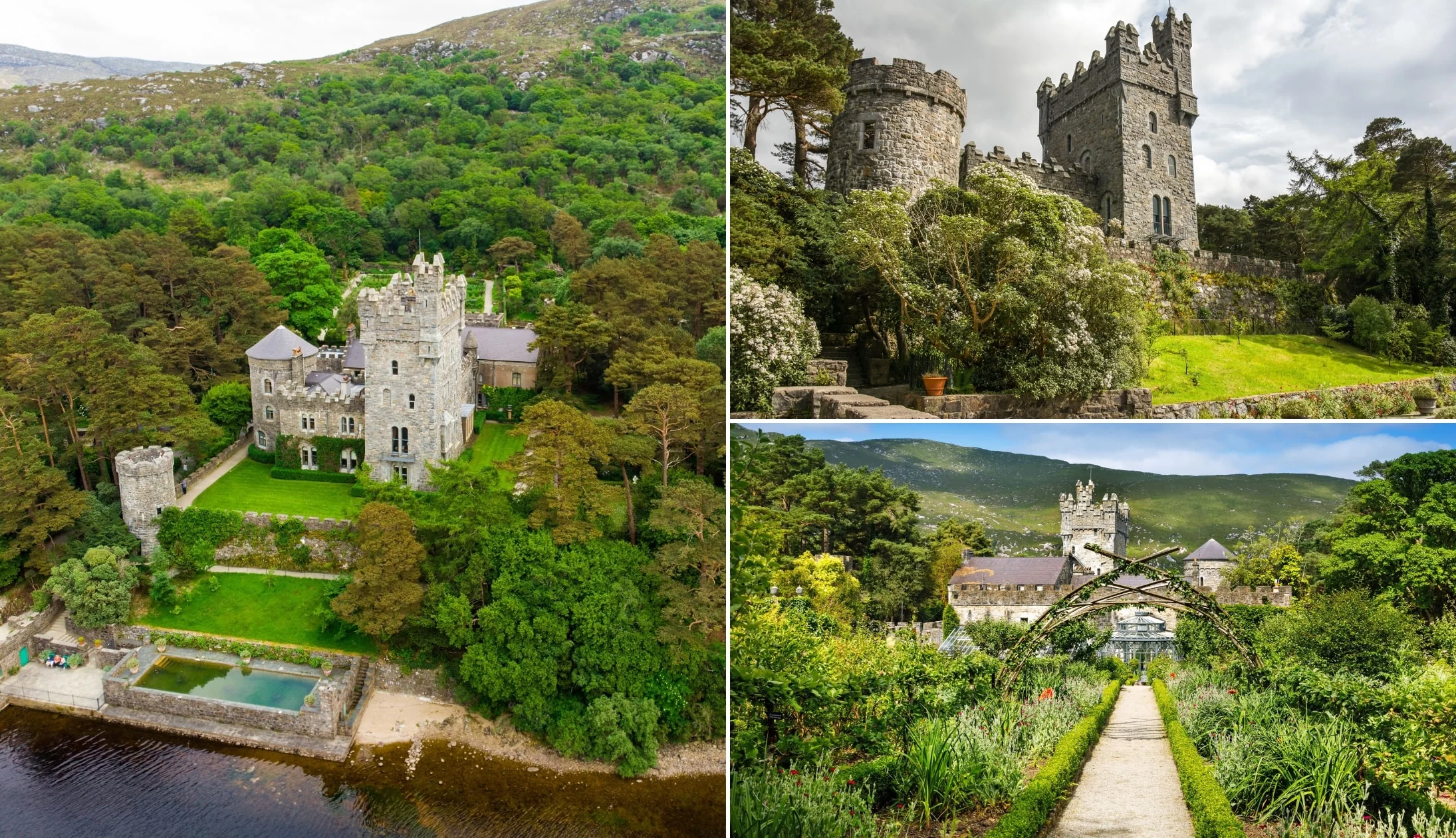
Photos via Shutterstock
Our first stop for the day is Glenveagh National Park, a gorgeous 16,000 hectares of parkland in County Donegal that takes in loughs, forests, rugged mountains, waterfalls, and a castle. It’s about 2.5 hours away from Belfast, and there’s a large car park at the entrance to the park, complete with toilets and a visitor centre.
If you want to visit Glenveagh Castle, there’s a fantastic lakeside walk that takes you from the car park all the way to the castle, along the shores of Lough Veagh. It’s an easy-going walk that’s 3.5 km long and typically takes about 40 minutes one way. You can take a shuttle bus back or both ways if you don’t feel like walking. Alternatively, it’s a nice path for cycling too.
The fairytale castle is a wonder to behold, and it’s well worth strolling the grounds and gardens before taking a guided tour of the inside.
Stop 2: Sliabh Liag
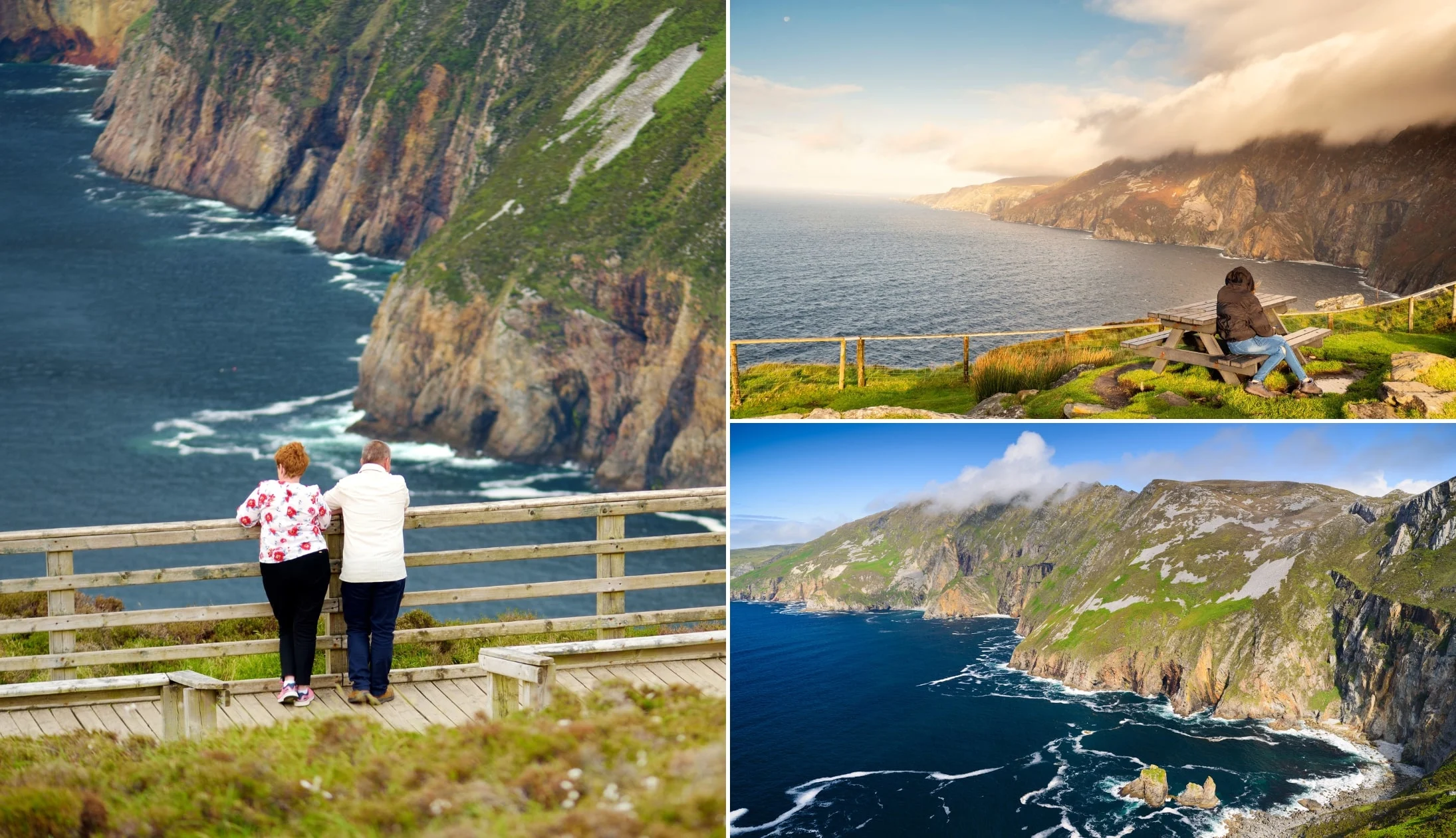
Photos via Shutterstock
Sliabh Liag, or the Slieve League Cliffs, are the highest sea cliffs on mainland Ireland, towering a little over 600 metres above the sea. Three times higher than the cliffs of Moher, they boast spectacular scenery. It’ll take about an hour and a half to drive from Glenveagh, and you have a couple of options in terms of parking.
We recommend you stick ‘Sliabh Liag Cliff Experience’ into Google Maps and park at the visitor centre there. From here, you can tackle the steep walk up to the cliffs, which should take about 45 minutes each way, or you can save your energy and take a shuttle bus for around €6. Alternatively, there’s an upper car park, and from there, it’s just a fifteen-minute stroll to Bunglass Point, one of the best viewpoints for the mighty cliffs. However, this car park tends to be closed during the summer for all but those with mobility issues.
Following the Sliabh Liag walk, you’ll come across a WWII Eire coastal sign and enjoy breathtaking scenery at every turn. It’s also possible to organise a Slieve League Boat Tour, which is another fantastic way to see the cliffs.
Stop 3: Lunch in Killybegs
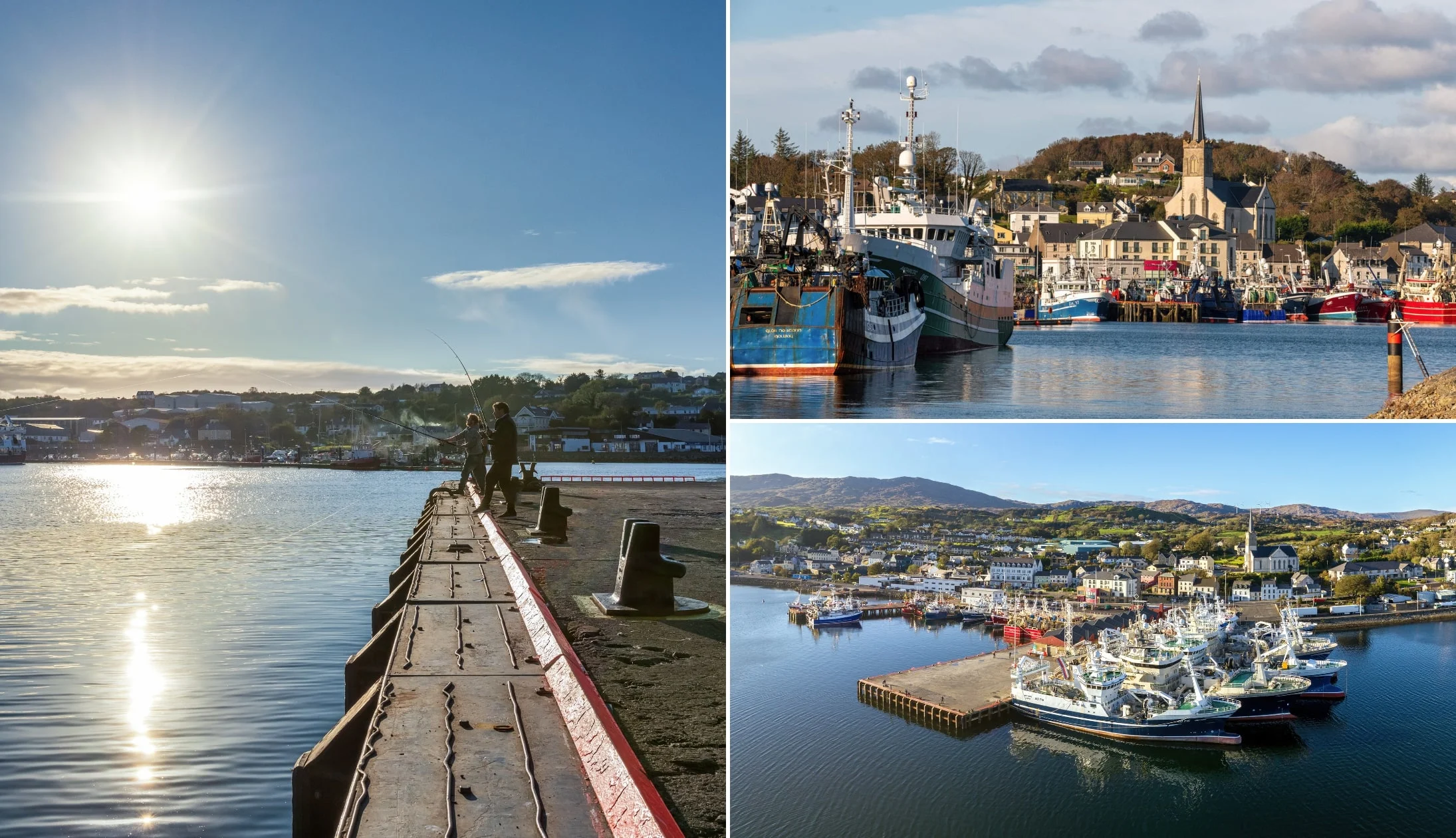
Photos via Shutterstock
After enjoying the scenery of Sliabh Liag, you’ll probably have worked up a hunger. The bustling fishing town of Killybegs (the largest fishing port in Ireland) is a great place for a feed and is just a 25-minute drive away. Head to the harbour and check out Killybegs Seafood Shack, one of the best places to enjoy fish, chips, calamari, and much more, all with a great view of the fishing boats.
Ahoy Cafe is another top choice, with a fantastically varied menu that takes in seafood (including their delicious mussels), sandwiches, wraps, soups, and much more. For something a little lighter, Mrs B’s Coffee House is the place to go. They have a fine selection of wraps, sandwiches, and toasties, as well as salads, sausage rolls, and a mean cup of coffee.
Stop 4: Mullaghmore

Photos via Shutterstock
We’ll enjoy a nice hour-long drive while we digest lunch before arriving at the gorgeous Mullaghmore Beach. It boasts a 3 km stretch of golden sands, backed by sand dunes and mountains. Lifeguards patrol the beach from June to the end of September, and it’s a great place for swimming, strolling, and sunbathing. Or, for something a little different, it’s also a fantastic spot for surfing, kayaking, and windsurfing.
The beach sits in the shadow of the superb Classiebawn Castle, which looks like it’s been plucked from a fairy tale. It’s privately owned, so you can’t visit, but backed by the Dartry Mountains, it offers many superb photo opportunities.
Stop 5: Sligo for the night
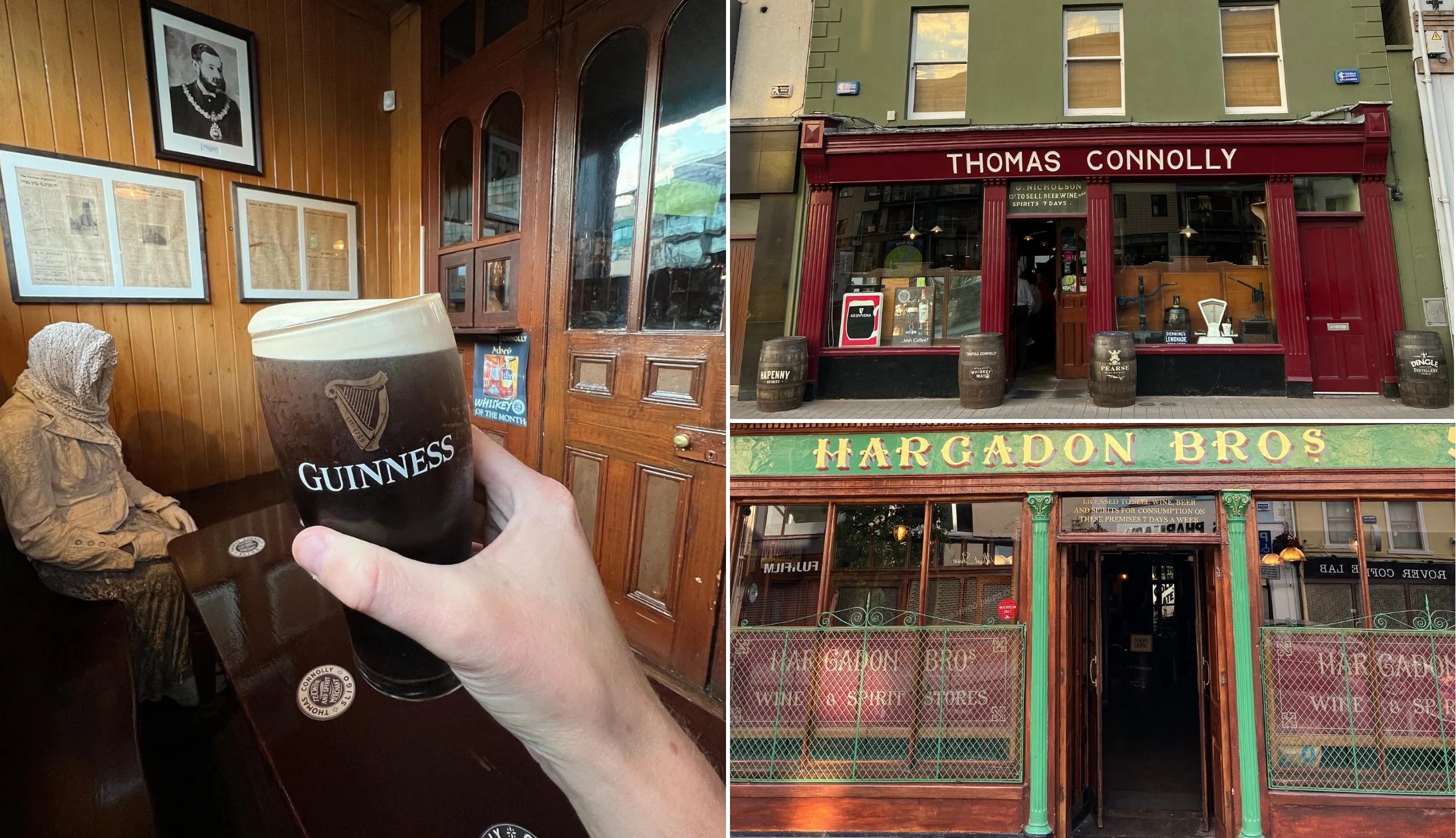
Photos by The Irish Road Trip
Our final stop for the day is the lively and charming Sligo Town, where we’ll be staying for two nights. It’s a 27-minute drive from Mullaghmore Beach through the gorgeous countryside of County Sligo.
A hotbed of traditional music, art, and great craic, there’s plenty to love about the town. Once you arrive, check into your accommodation and freshen up before enjoying the sights.
Our Sligo food recommendations
There are some excellent restaurants in Sligo. Some of our favourites include Hooked, which offers a stunningly varied menu that blends Irish classics with modern European cuisine, and gorgeous, fresh seafood. Alternatively, Knox is a quaint little joint packed with character and boasting a small but versatile menu.
Seafood is a must when you’re in Sligo, which is surrounded by the sea on one side and Lough Gill on the other. Coach Lane is a top pick for delicious, locally sourced seafood, with line-caught fish and fresh shellfish dishes to choose from, as well as some non-seafood alternatives.
Our Sligo pub recommendations
There are plenty of traditional pubs that ooze charm, such as Hargadon Bros with its stone floors, wood panelling, and various knick-knacks.
Another top choice is Thomas Connolly, which dates back to 1780. You’ll feel as if you’ve stepped back in time the moment you walk in. They offer a great selection of local craft beers, Irish whiskeys, and small-batch gin.
Finally, Shoot the Crows is a must, with its roaring fireplace, stained glass windows, and cosy atmosphere. It’s also a good choice for live music, with trad sessions at least three times a week.
For more live music, check out Fureys Pub, which normally has live music every weekend and Tuesday evenings.
Otherwise, McLynns Bar offers an eclectic mix of live bands and trad sessions every Wednesday, Thursday, and Sunday night. Both boast a lively atmosphere, friendly locals, and a welcoming fireplace!
Day 5: Sligo – Yeats Country
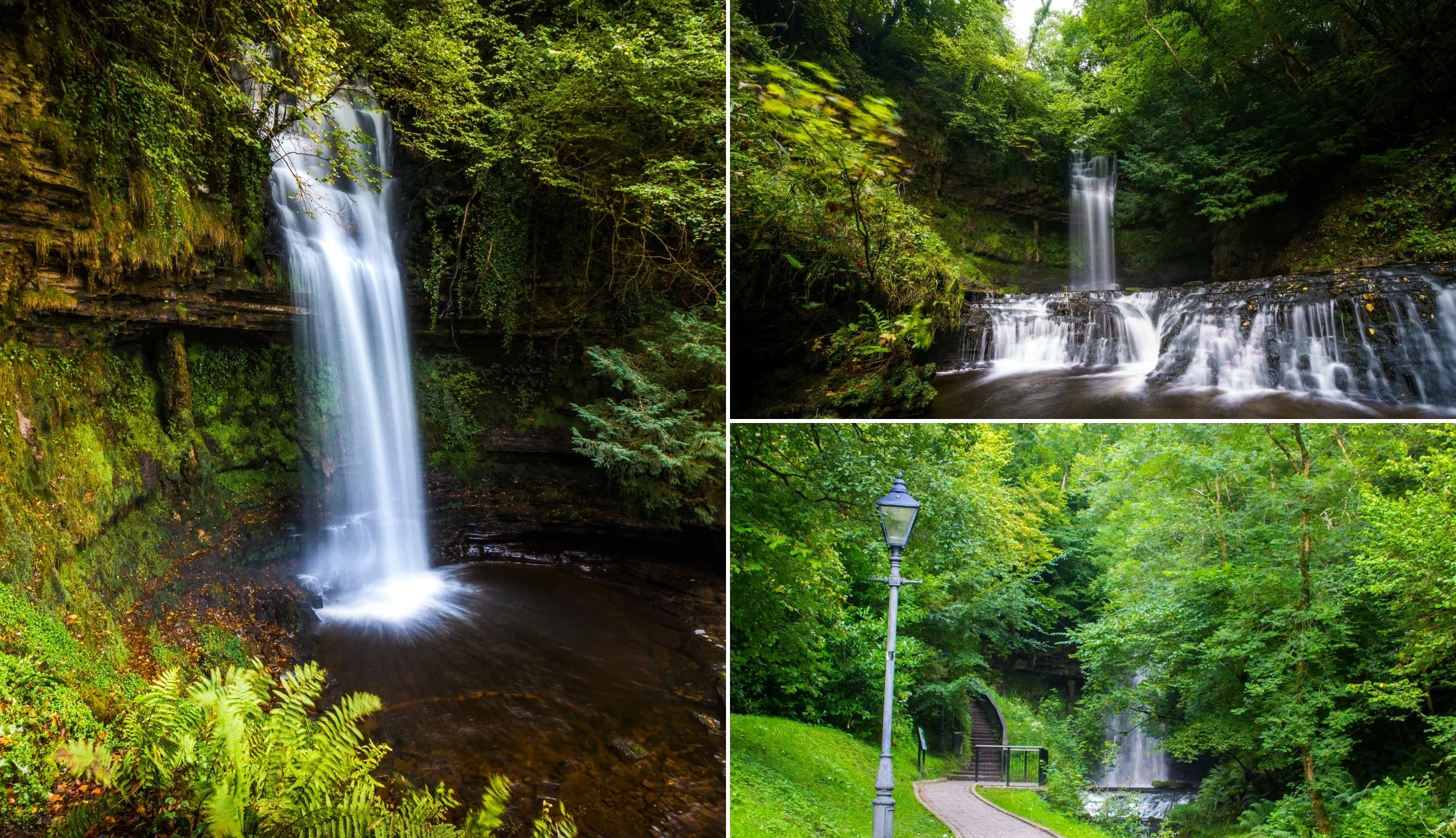
Photos via Shutterstock
We’re halfway through our tour of Ireland, and there’s still plenty to see and do! Today, we’ll be exploring more of County Sligo with a bunch of walks and attractions to enjoy.
Start the day with a good, hearty breakfast at your accommodation or check out one of the cafes in town.
The jumbo breakfast at Margaret’s Cafe will keep your belly full until dinner time, but they also offer pancakes and lighter choices.
Alternatively, Lyons Cafe and Bakeshop do what many consider the best Irish breakfast this side of the Shannon, as well as tasty breakfast baps.
Stop 1: The Model
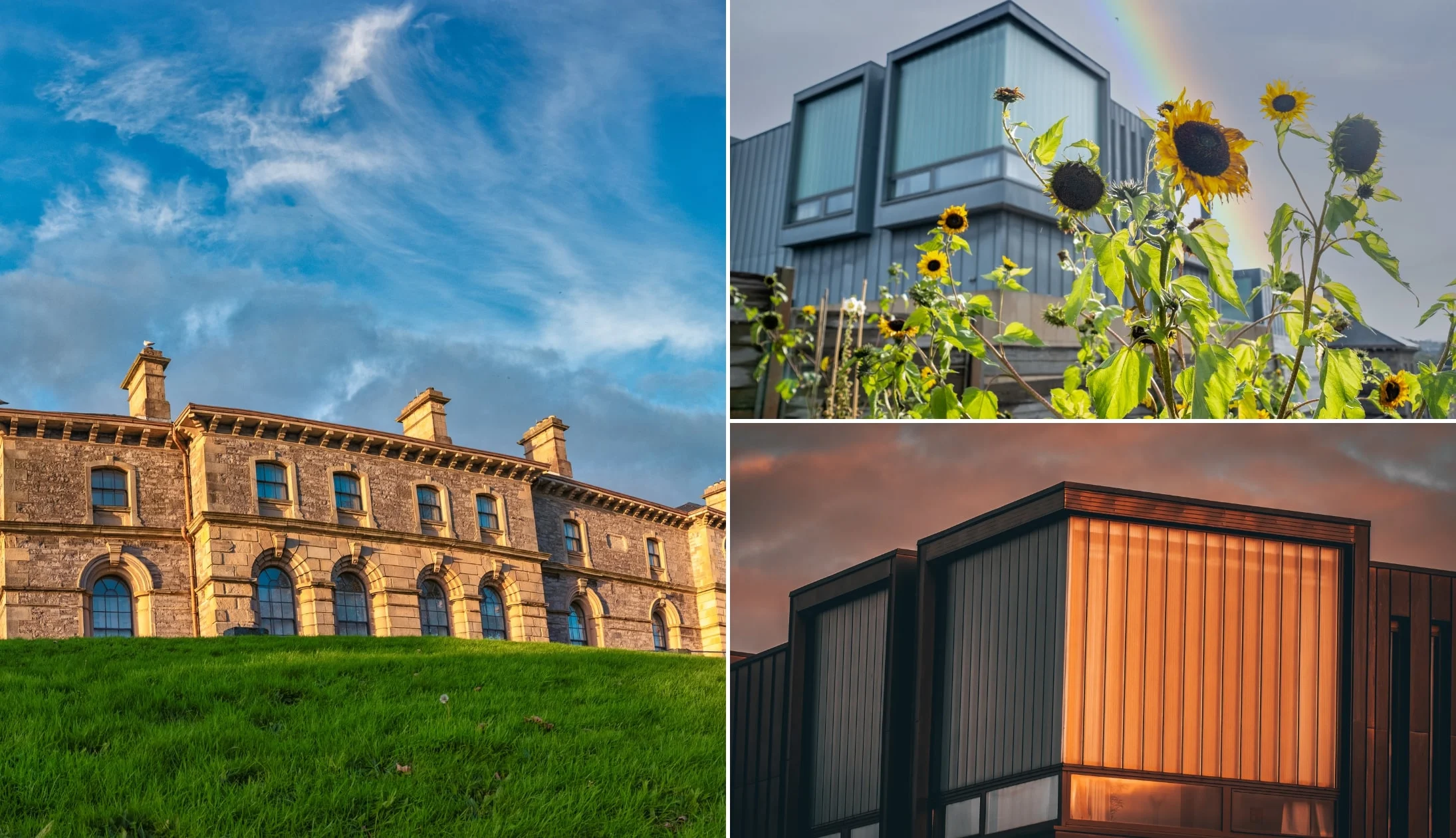
Photos courtesy Eddie Lee/Ed Lee Photography via Failte Ireland
Since we’re exploring Yeats Country today, it’s worth kicking things off with a visit to the Model, a fantastic art gallery in Sligo Town and home to the Niland collection, which focuses on the artist Jack B Yeats. It regularly boasts a superb collection of his artwork, although it’s best to contact the gallery in advance to check that they’ll be displaying it during your visit. Besides art from Yeats, you’ll find a host of other fascinating pieces on display.
Stop 2: Drumcliffe Church and WB Yeats Grave
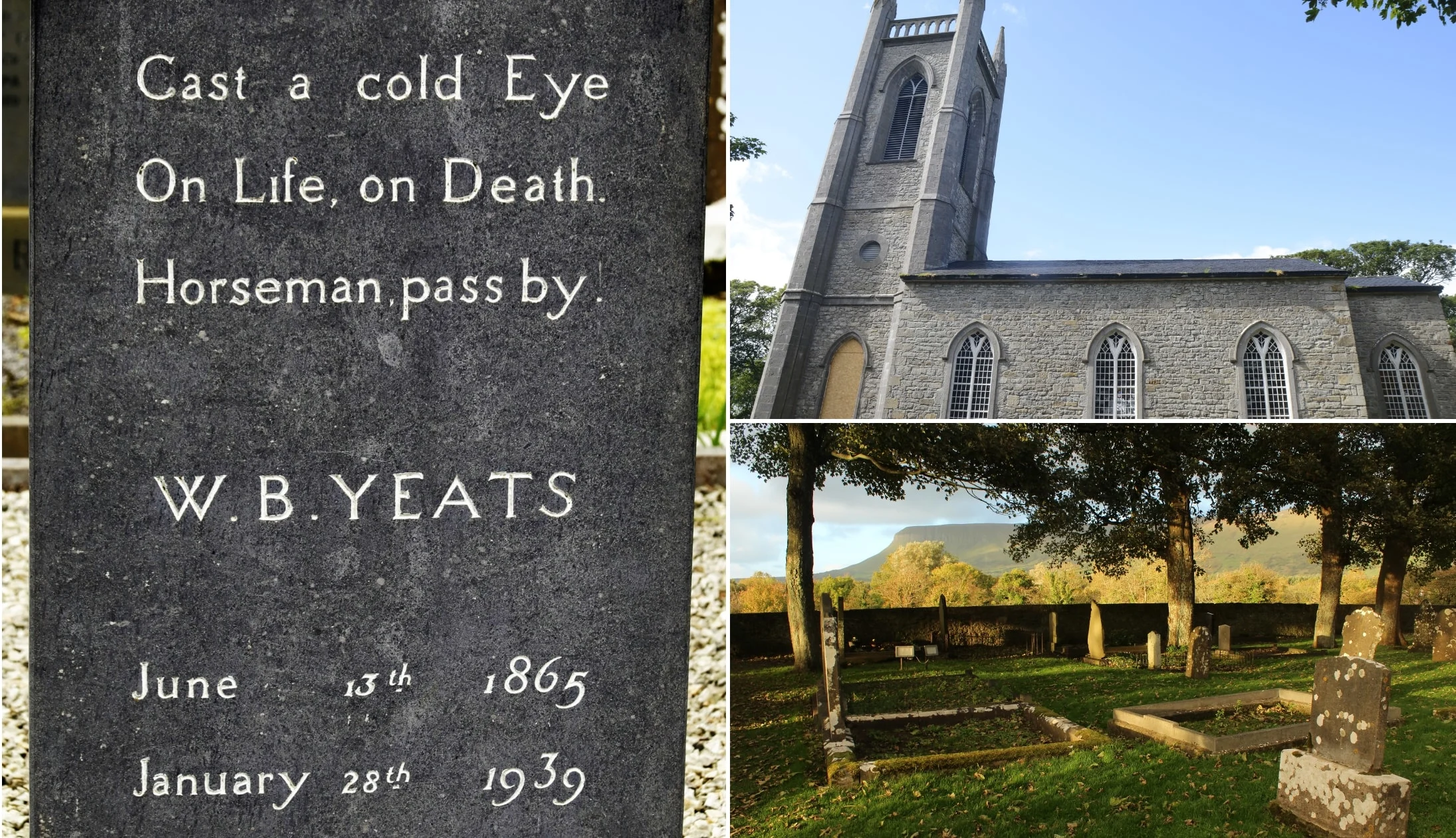
Photos via Shutterstock
Our next stop is just a ten-minute drive from the Model. Drumcliffe Church it the final resting place of WB Yeats, one of Ireland’s most beloved poets. A visit to the grave is a cultural experience, but there’s much more to enjoy at the church. Check out the 11th-century high cross and enjoy the gorgeous scenery all around before checking out the craft shop and cafe.
There’s a handy car park right next to Drumcliffe Church that offers plenty of space and free parking.
Stop 3: Glencar Waterfall

Photos via Shutterstock
Stop 3, the glorious Glencar Waterfall, offers up more gorgeous scenery. From Drumcliffe Church, it’s a 20-minute drive over the border into County Leitrim to the car park, where you’ll also find public toilets.
Once you’ve parked up, the waterfall is a short 300-metre walk away and should take five or ten minutes or so. The cascade crashes down 50 ft of green foliage and craggy rocks, creating a gorgeous scene tucked away in the woods. In fact, its beauty inspired WB Yeats to write a poem about it.
If you’re ready for lunch at this point, you’ll find the teaSHED cafe between the waterfall and the car park. Here, you can get a good cup of tea or coffee, as well as a light lunch. They offer sandwiches, toasties, wraps, soup, quiche, salad, and various cakes and bakes.
Alternatively, the waterfall or the nearby lakeside is a great place for a picnic. But if you prefer something a little heartier for lunch, check out stop 4.
Stop 4: Back to Sligo for lunch (optional)
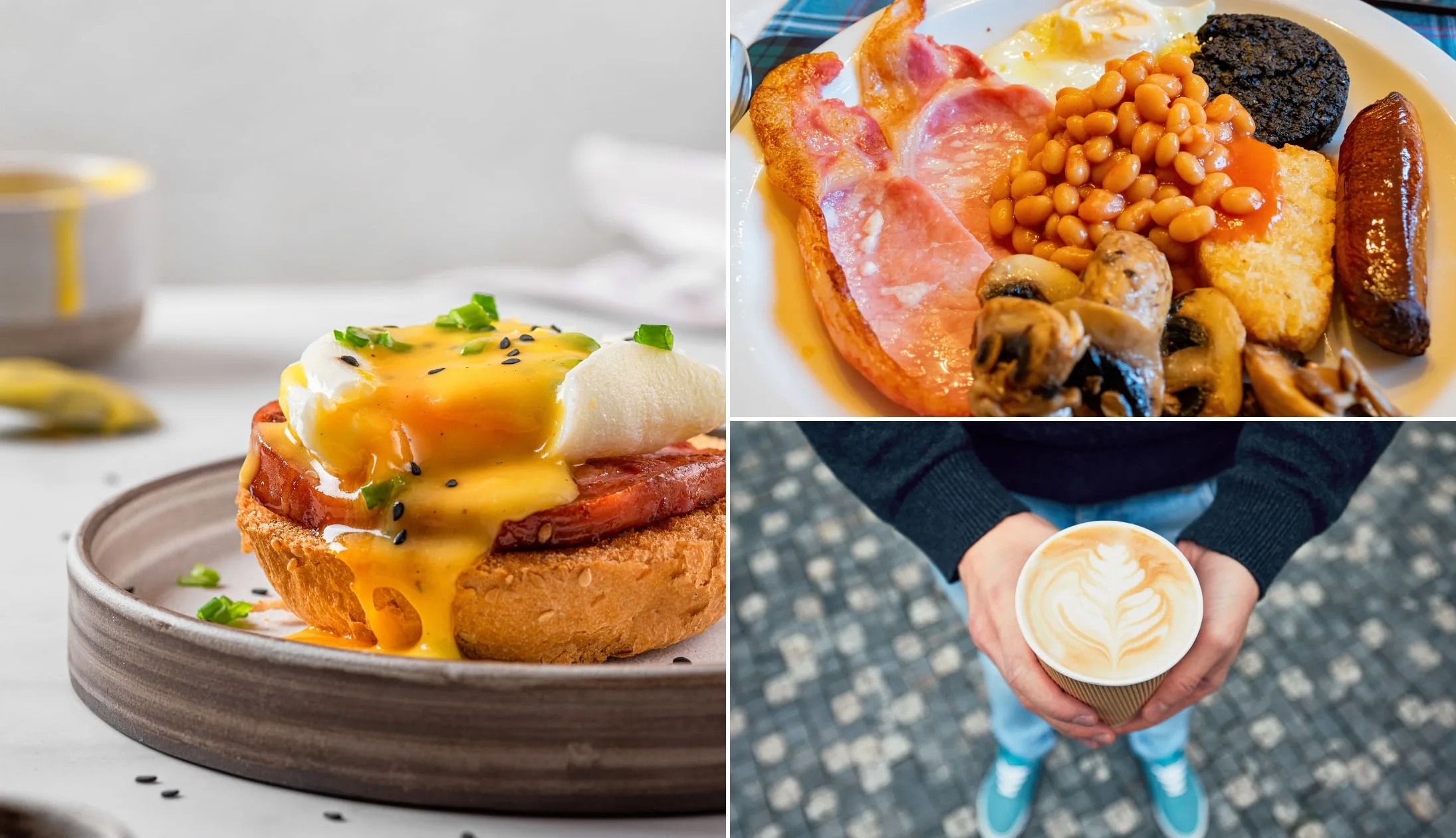
Photos via Shutterstock
You don’t have to return to Sligo for lunch, but if you do it’ll take around 20 minutes to get there. As we said before, there are plenty of great places to grab a bite to eat. Check out our suggestions from yesterday and try out one of the places you haven’t been to yet. Alternatively, Lyons Cafe and Bakeshop or Bridgefoot House both do great lunches.
Stop 5: Lissadell House
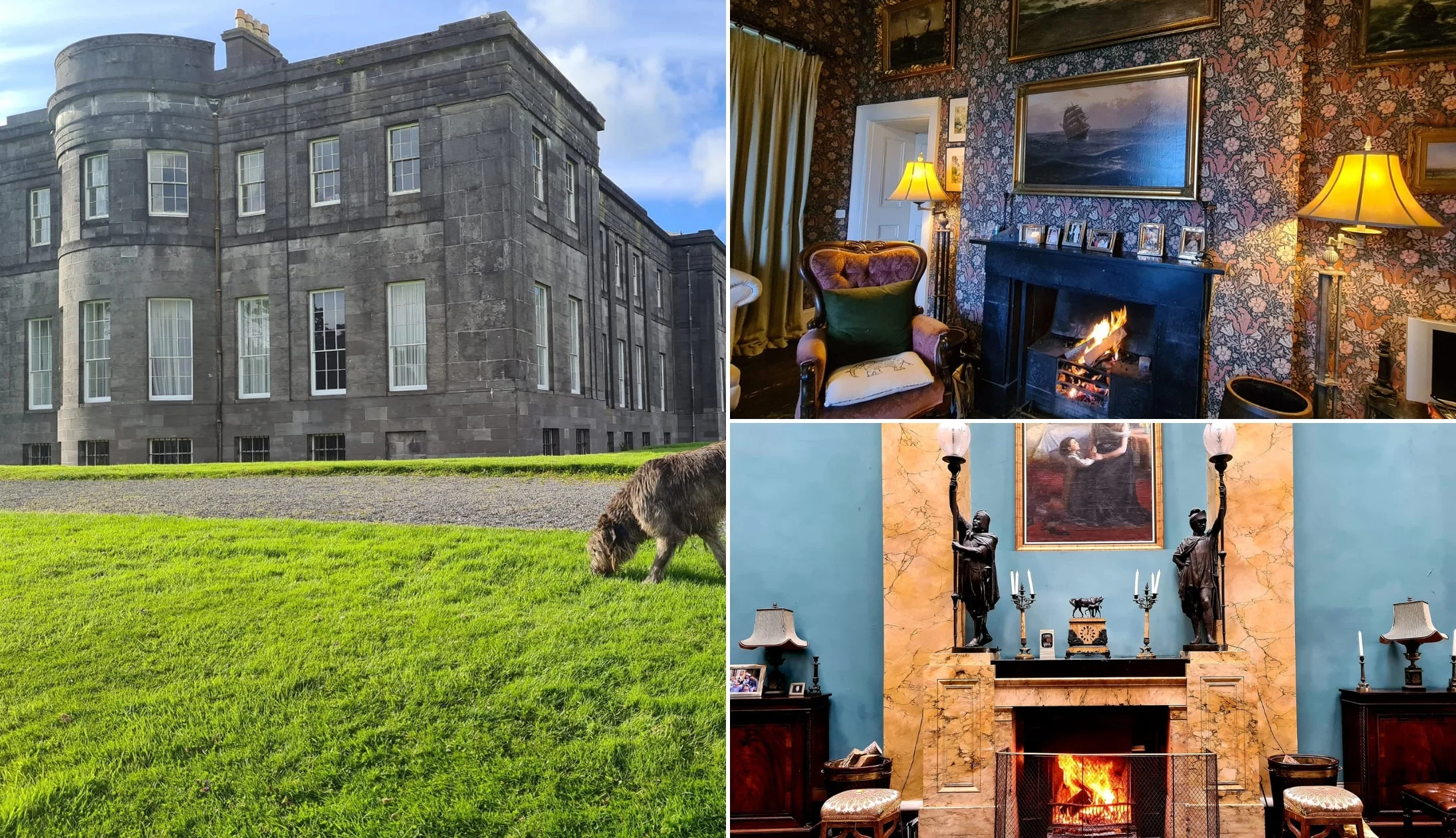
Photos via Lissadell House on FB
Our first stop for the afternoon is Lissadell House, around 20 minutes from both Sligo and Glencar Waterfall. Childhood home of Countess Markievicz, one of the leaders of the 1916 Rising and the first woman to be elected to Dáil Eireann, the Irish Parliament, it’s of huge cultural importance. It was also famously visited by WB Yeats and his brother Jack B Yeats, an artist of formidable skill.
There’s plenty to see and do at the house, with a whole load of history to soak up. Take a guided tour of the inside, check out the 1916 Rising exhibition, enjoy the Yeats Gallery, or stroll the beautiful grounds. You could easily spend a few hours here. If you get thirsty, head to the tea rooms for tea (or coffee) and homemade cake.
Stop 6: Streedagh Beach stroll
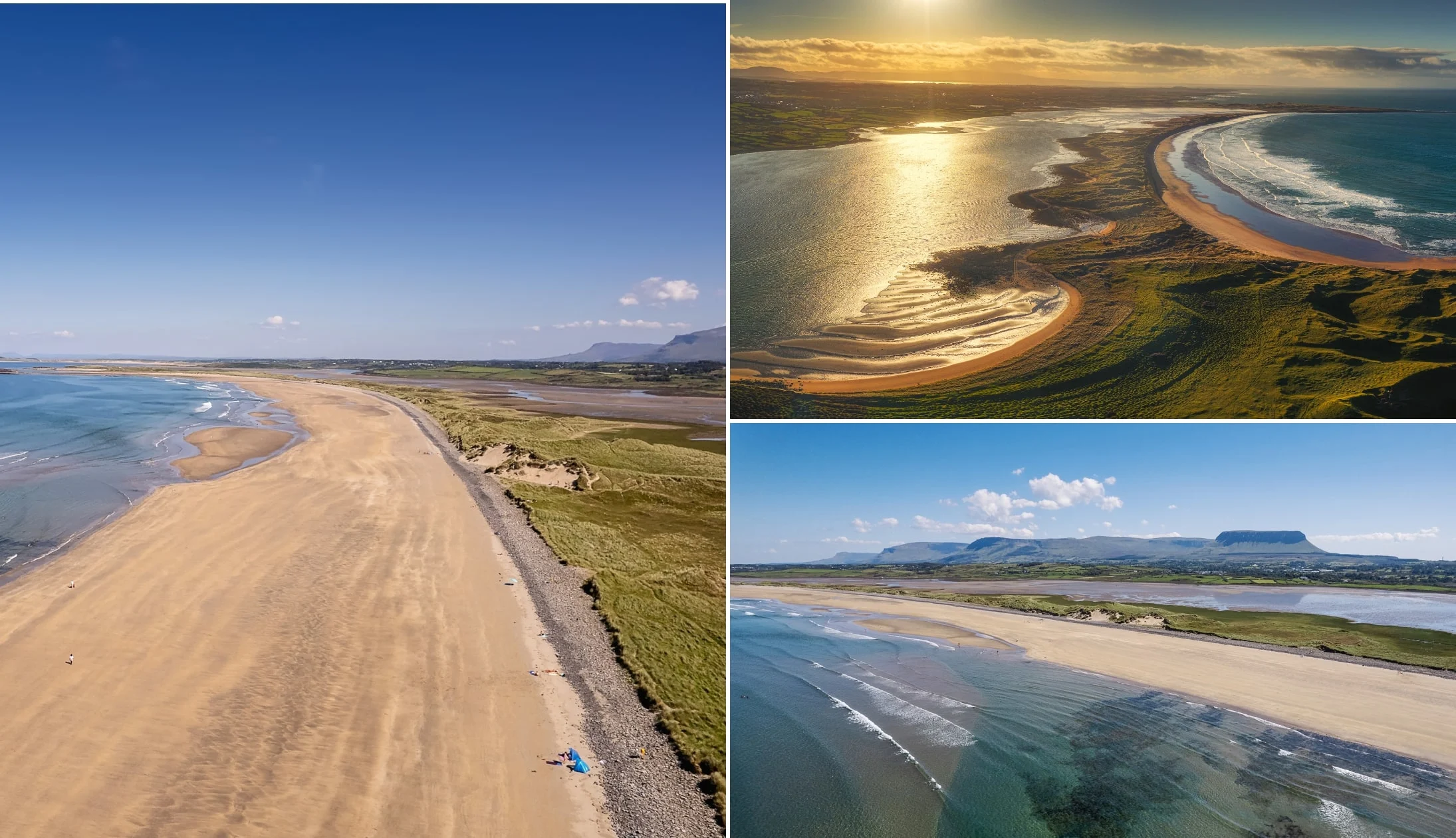
Photos via Shutterstock
After a short 15-minute drive through the tranquil countryside, you’ll arrive at our final stop before heading back to Sligo for the evening. Streedagh Beach arguably offers up the best views of the mighty Benbulben, as immortalised in the TV show, Normal People.
Popular with surfers, it’s not an ideal beach for swimming due to the strong currents. However, it’s absolutely fantastic for walking, with a 3 km linear walk along the sands and dunes. Keep your eyes peeled and you might spot three shipwrecks from the Spanish Armada, which sank here in 1588. Fossil hunters will also enjoy the fascinating rock formations towards the end of the walk. In total, the walk should take 1.5 to 2 hours to complete.
Stop 7: Sligo for the night

Photos by The Irish Road Trip
After enjoying the beach, and if you’re feeling romantic, maybe even catching a gorgeous sunset, it’s time to head back to Sligo to freshen up and get some dinner, drinks, and entertainment.
Our Sligo food recommendations
There are some excellent restaurants in Sligo. Some of our favourites include Hooked, which offers a stunningly varied menu that blends Irish classics with modern European cuisine, and gorgeous, fresh seafood. Alternatively, Knox is a quaint little joint packed with character and boasting a small but versatile menu.
Seafood is a must when you’re in Sligo, which is surrounded by the sea on one side and Lough Gill on the other. Coach Lane is a top pick for delicious, locally sourced seafood, with line-caught fish and fresh shellfish dishes to choose from, as well as some non-seafood alternatives.
Our Sligo pub recommendations
There are plenty of traditional pubs that ooze charm, such as Hargadon Bros with its stone floors, wood panelling, and various knick-knacks.
Another top choice is Thomas Connolly, which dates back to 1780. You’ll feel as if you’ve stepped back in time the moment you walk in. They offer a great selection of local craft beers, Irish whiskeys, and small-batch gin.
Finally, Shoot the Crows is a must, with its roaring fireplace, stained glass windows, and cosy atmosphere. It’s also a good choice for live music, with trad sessions at least three times a week.
For more live music, check out Fureys Pub, which normally has live music every weekend and Tuesday evenings.
Otherwise, McLynns Bar offers an eclectic mix of live bands and trad sessions every Wednesday, Thursday, and Sunday night. Both boast a lively atmosphere, friendly locals, and a welcoming fireplace!
Day 6: The Mayo Coast
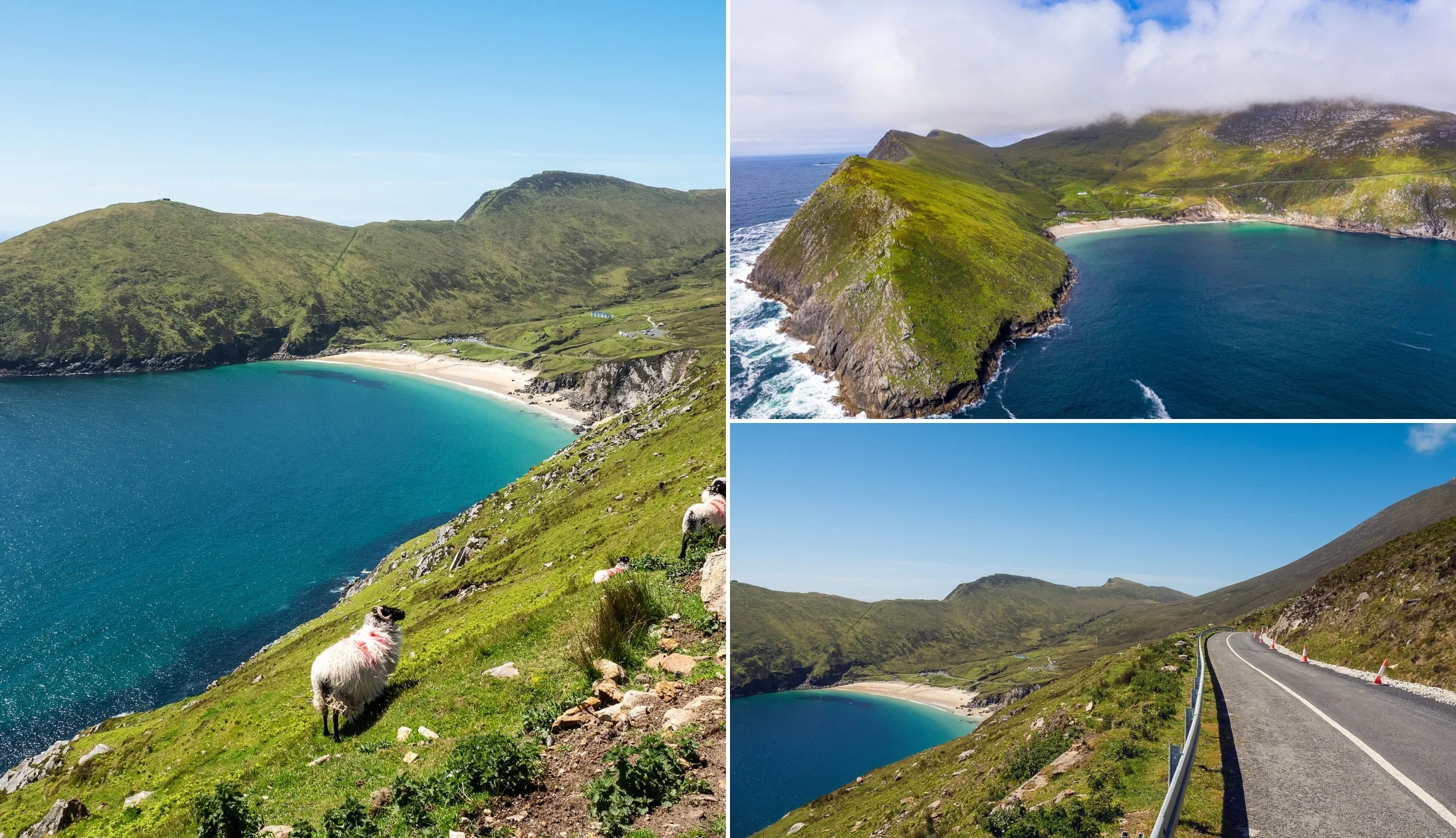
Photos via Shutterstock
Today we’re heading to Westport, the long way round. Along the way, we’ll take in the stunning Mayo coast and the sights of Achill Island, one of the country’s most remote areas and Ireland’s largest island.
Before hitting the road, let’s grab one last breakfast in Sligo, either at your accommodation or one of the many fantastic cafes in town.
Margaret Cafe does a wonderful full Irish, but their pancakes and smoked bacon are also well worth giving a go. For a vegan-friendly alternative, head to Sweet Beat, where you’ll find an extensive menu and great coffee.
You’ll need to book two nights’ accommodation in Westport, so be sure to check out our suggestions.
Our Westport accommodation recommendations
- Budget: Old Mill Holiday Hostel (in the town with good reviews) and Clooneen House (very central with excellent reviews)
- Mid-range: Castlecourt Hotel (very central and has a spa) and Westport Plaza Hotel (central with exceptional reviews)
- High-range: Knockranny House (gorgeous hotel a 1-minute drive from town)
Stop 1: Grab a cup of coffee and stretch your legs in Ballina
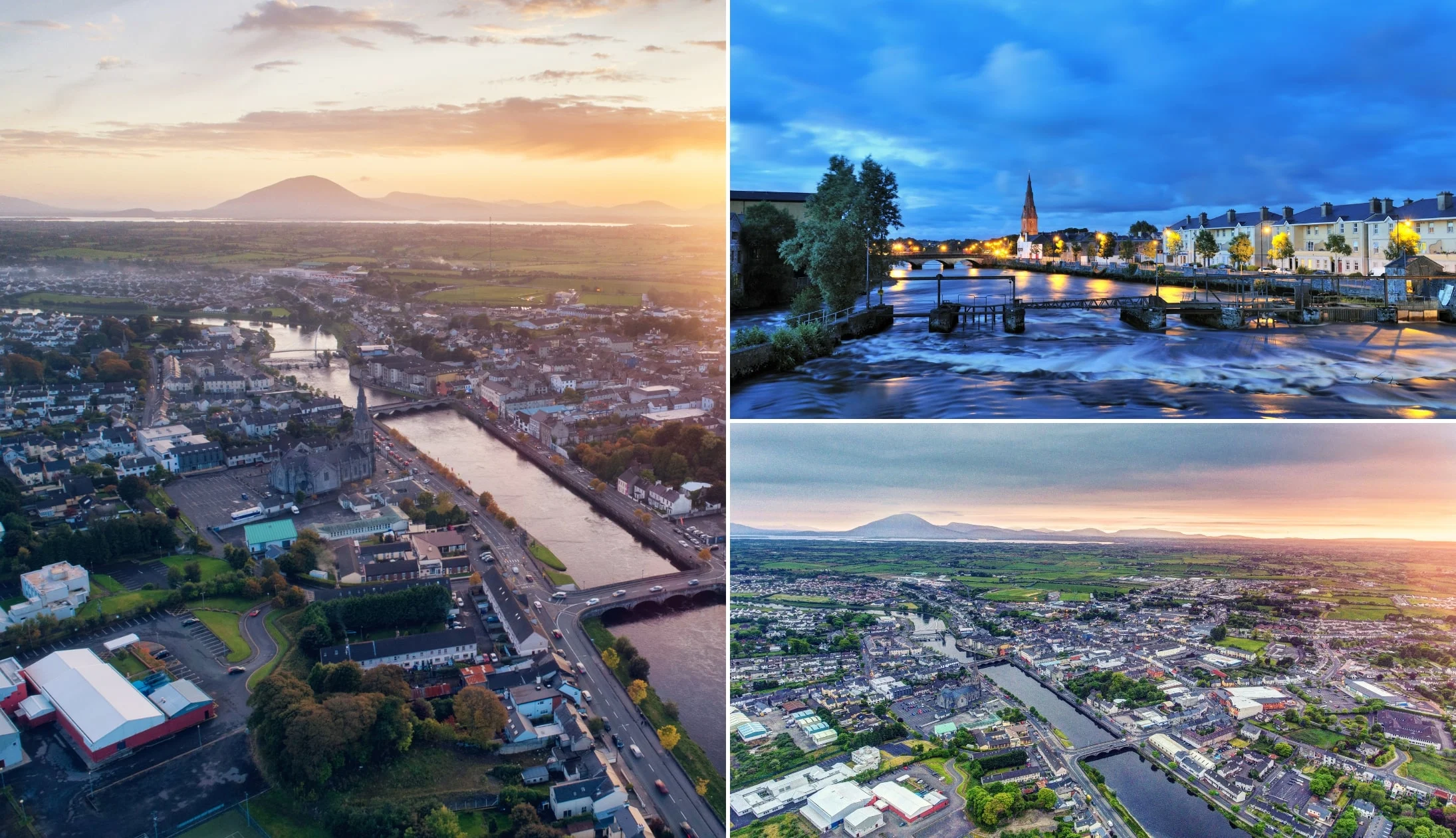
Photos via Shutterstock
Our first stop takes us to the riverside town of Ballina, about an hour’s drive from Sligo. Straddling the River Moy, it’s a beautiful, tranquil town that’s nice to stroll around. Park up in the Market Square car park, which costs around 50 cents an hour or so.
If you fancy a cup of coffee while you wander the town, both The Coffee Vine Cafe and Dave’s Deli and Coffee Shack are a short walk from the car park. They both offer a superb choice of coffee styles, as well as pastries and cakes.
Stop 2: Dun Briste
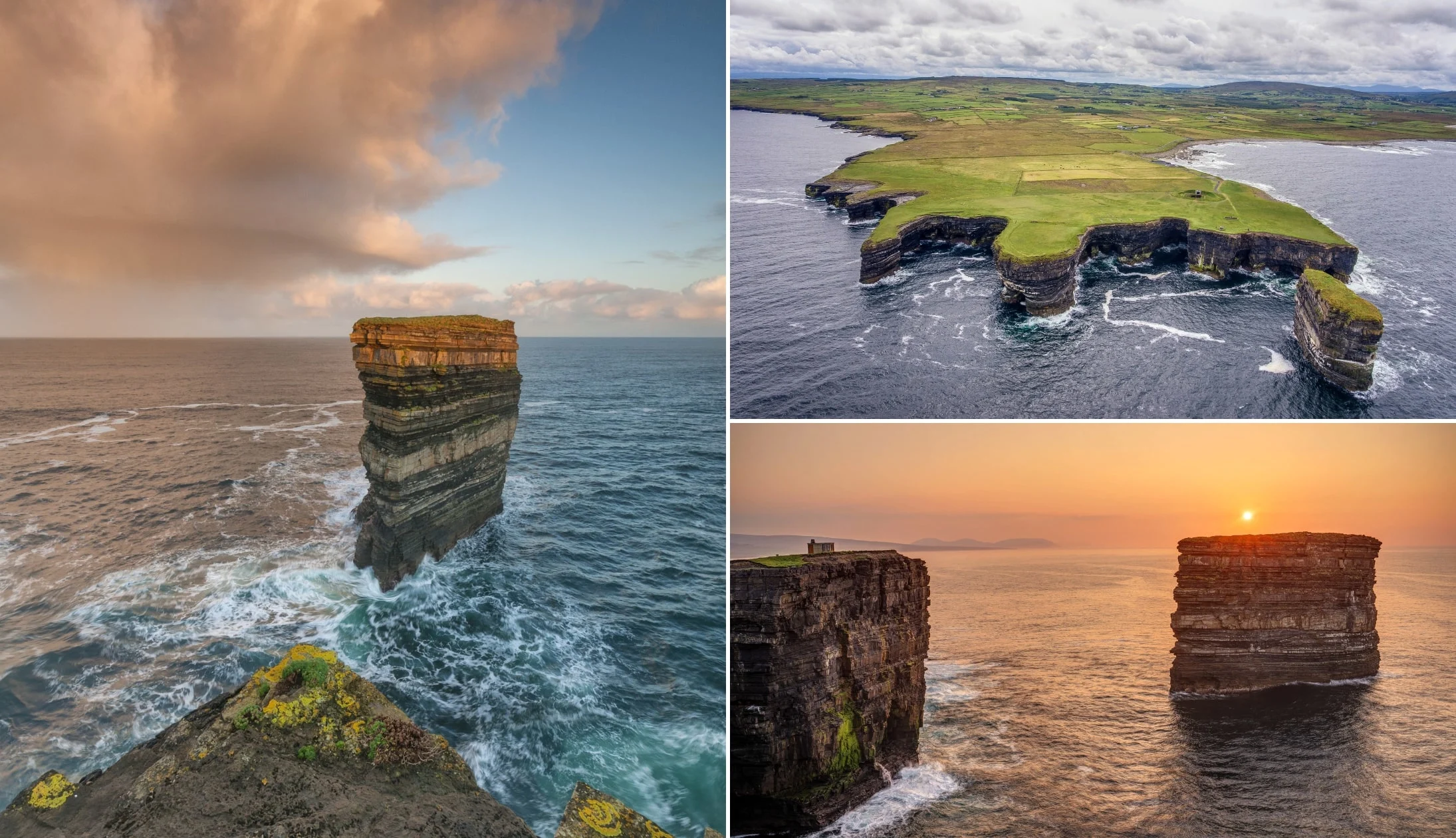
Photos via Shutterstock
Jumping back in the car, we’ll drive 34 minutes to the spectacular Dun Briste sea stack, just off Downpatrick Head. Standing 45 metres high, 63 metres long and 23 metres wide, it lies just 200 metres offshore and is home to puffins, kittiwakes and cormorants. There’s a spacious car park when you reach the headland, and from there it’s about a 15-minute walk to the edge of the cliffs.
With its colourful rock strata and churning waters below, it’s an impressive sight. Legend tells that it was formed by Saint Patrick, who struck the ground with his crozier to strand Crom Dubh a Celtic Chieftain. There’s a clatter of things to see at Downpatrick Head, including the WWII EIRE 64 lookout post, St Patrick’s Church, and Pul Na Sean Tinne, a blowhole known as the “Hole of the Old Fire”. You’ll also find a nice tea shop and cafe there.
Stop 3: Ceide Fields
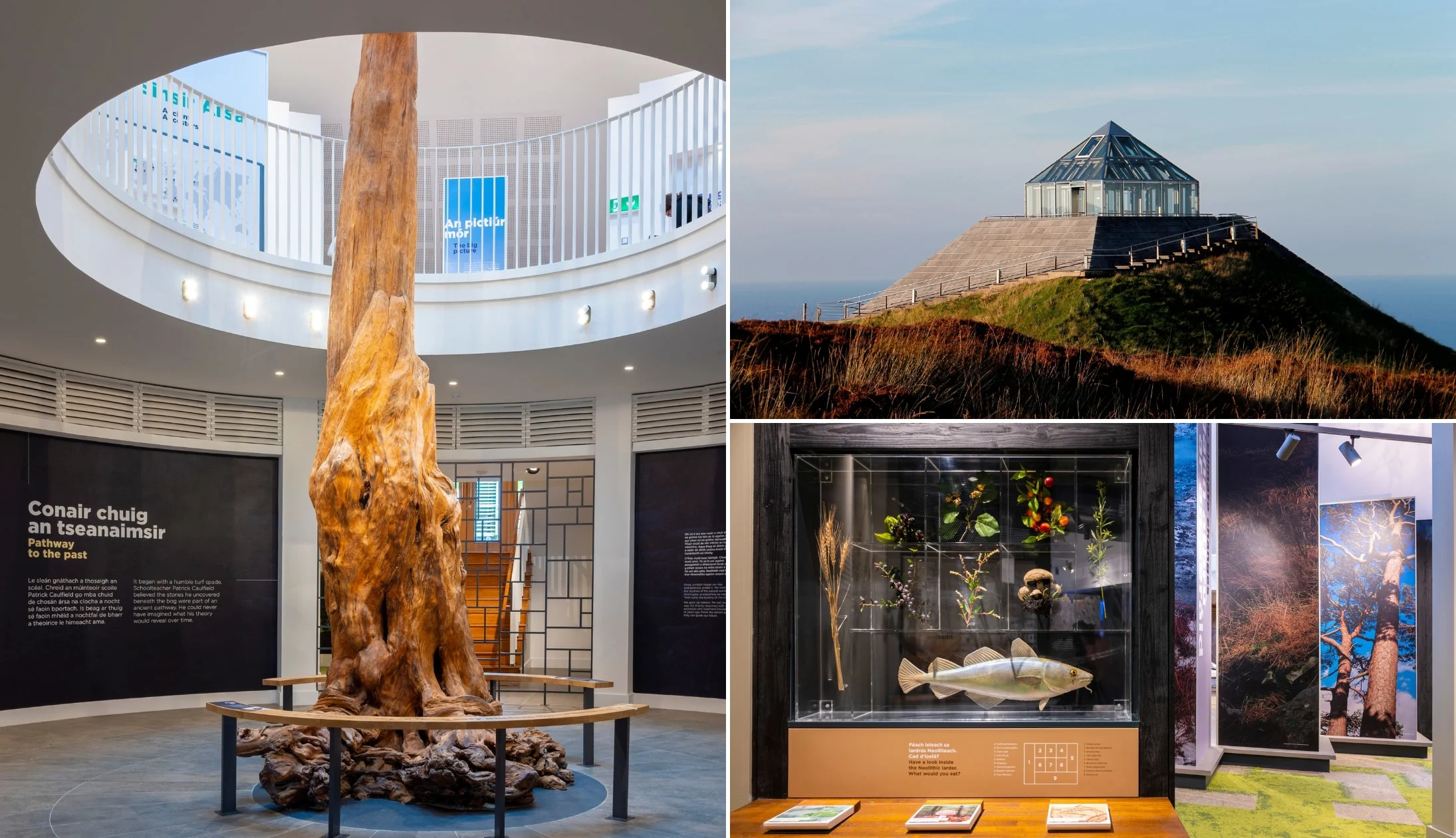
Photo left and bottom right: Michael Mc Laughlin. Top right: Alison Crummy. Via Failte Ireland
Our next stop is the Ceide Fields, just a 19-minute drive from Dun Briste. More than 6,000 years old, this remarkable neolithic site perches atop the cliffs, some 113 metres above the sea. This extensive Stone Age monument is the oldest-known field system in the world, containing a number of megalithic tombs, ancient stone-walled fields, and the remains of centuries-old dwelling places.
There’s a fantastic visitor centre, which rises from the peat bog in a pyramid shape and boasts an array of displays and exhibits to check out. You can enjoy a guided tour of the area too, or visit the viewing platform. And of course, there’s a decent little cafe too.
Stop 4: Ballycroy – Wild Nephin National Park
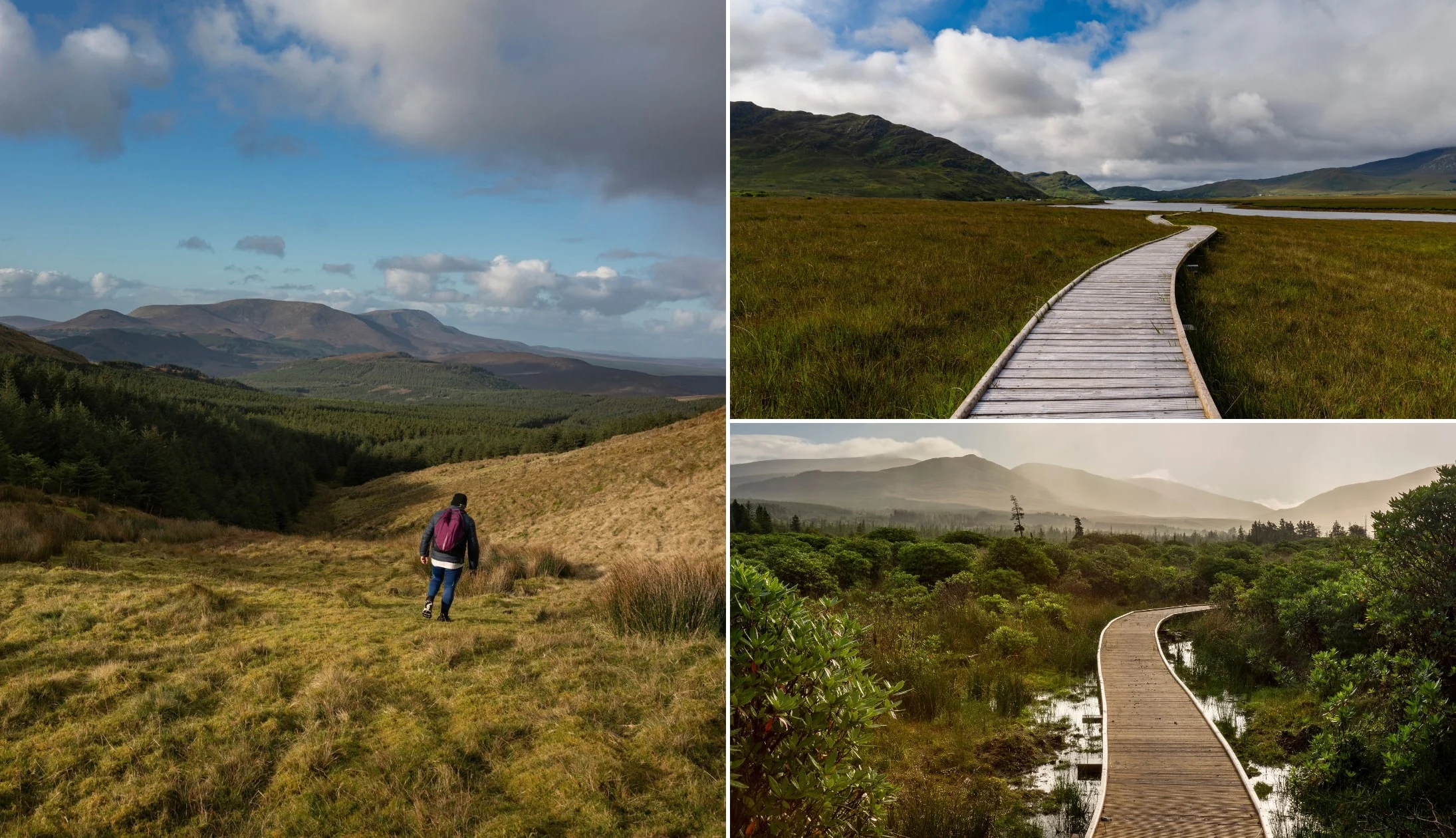
Photos via Shutterstock
After Ceide Fields, we’ll take a beautiful 50-minute drive through the stark beauty of Mayo’s countryside before arriving at Ballycroy Visitor Centre in the heart of Wild Nephin National Park. The park is home to a wealth of gorgeous lakes, mountains, and bogs, with a range of walks to suit all schedules and abilities.
First, it’s worth popping into the visitor centre, which showcases some fascinating displays and exhibits that explain the history and culture of the area. If you want to check out your beautiful surroundings, there’s a nice, easy-going 2 km walk from the visitor centre that offers spectacular views out to Achill Island and the Nephin Beg Mountain Range.
Stop 5: Lunch on Achill Island
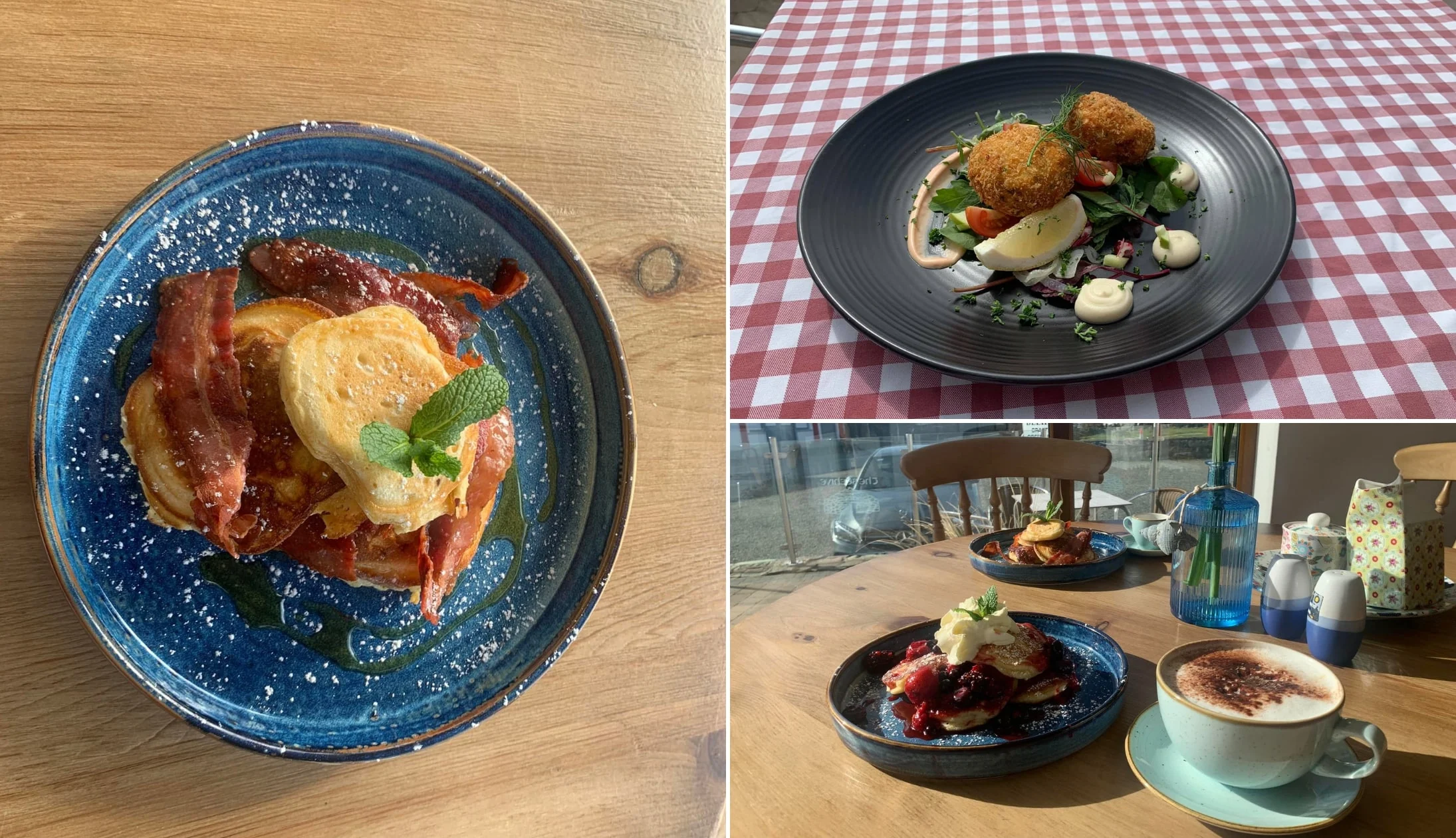
Photos via Beehive Crafts and Gifts on FB
For lunch, we’ll drive over the Michael Davitt Bridge onto the epic Achill Island, which boasts breathtaking landscapes and plenty to see and do. For food, the lively village of Keel, about 45 minutes from Ballycroy, is the place to be, with several pubs, cafes, and restaurants to choose from.
We recommend the Beehive Crafts and Gifts Restaurant, with excellent indoor and outdoor seating, and a varied menu, with options for all dietary requirements. Be sure to check out the fishcakes! Alternatively, The Currach is a good choice and they do a mean seafood chowder. After lunch, feel free to potter about Keel Beach, one of the most popular on Achill, especially for surfers.
Stop 6: Keem Beach

Photos via Shutterstock
Next stop, the exotic-looking Keem Bay. Seriously, on a sunny day, it looks more like Bali than Ireland! Surrounded by towering green cliffs, it boasts a luscious white sandy beach and crystal-clear seas. A nice place for a swim (lifeguards are on duty during summer months), it’s also a top place for relaxing and taking in the scenery. The 12-minute drive up there from Keel is also incredibly scenic, so be sure to take your time.
Stop 7: White Cliffs of Ashleam
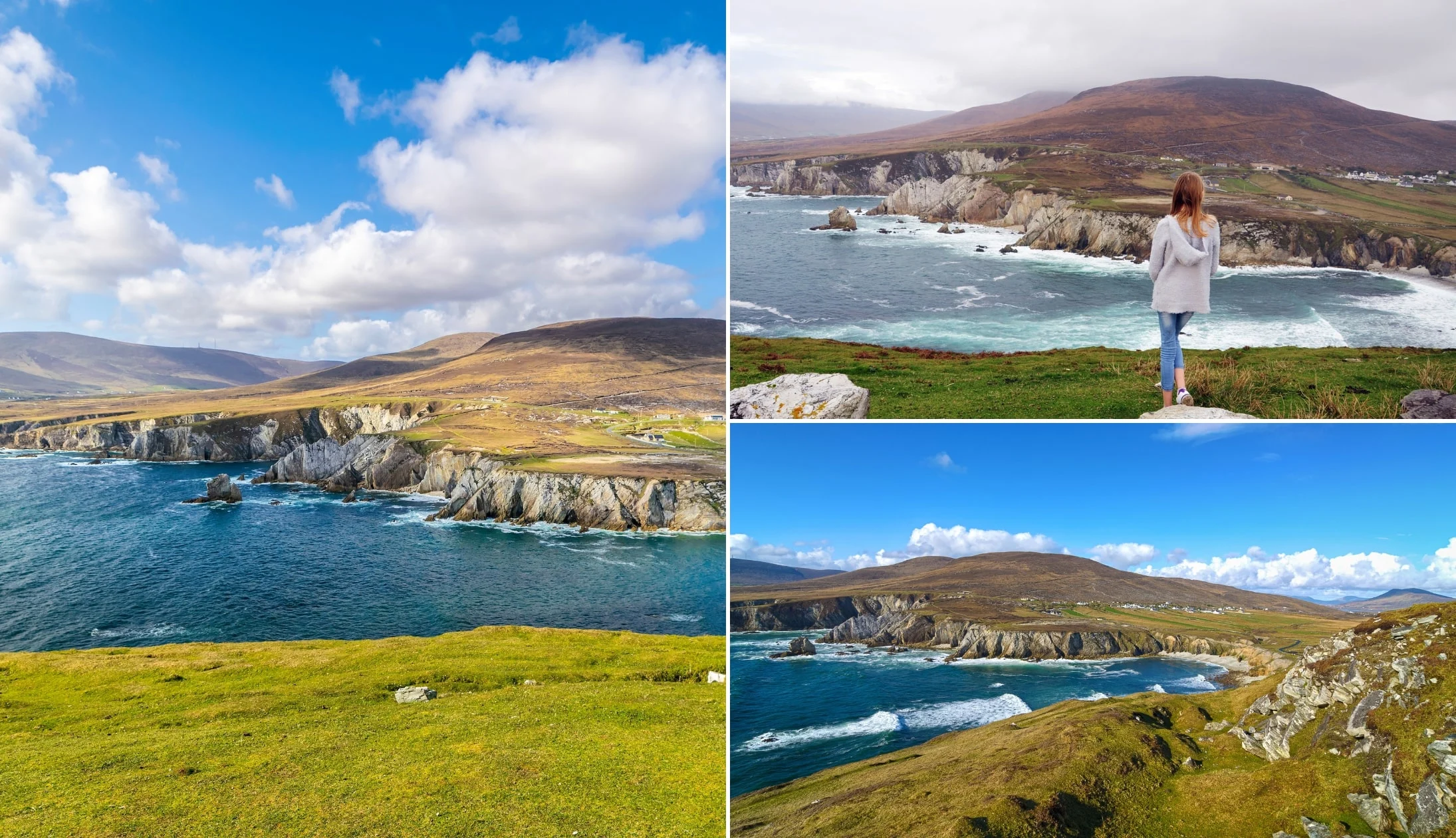
Photos via Shutterstock
The White Cliffs of Ashleam are another Achill Island highlight that are well worth driving to. If you put “White Cliffs of Ashleam @ Wild Atlantic Way” into Google Maps, it’ll take you on a 30-minute drive from Keem to the viewpoint, taking in amazing scenery the entire way. The road winds up to the viewpoint, and from there, you’ll get a fantastic eyeful. The jagged, bright white cliffs seem to cut into the sea, which crashes against them in a violent yet beautiful display.
Stop 8: Grace O’Malley Towerhouse
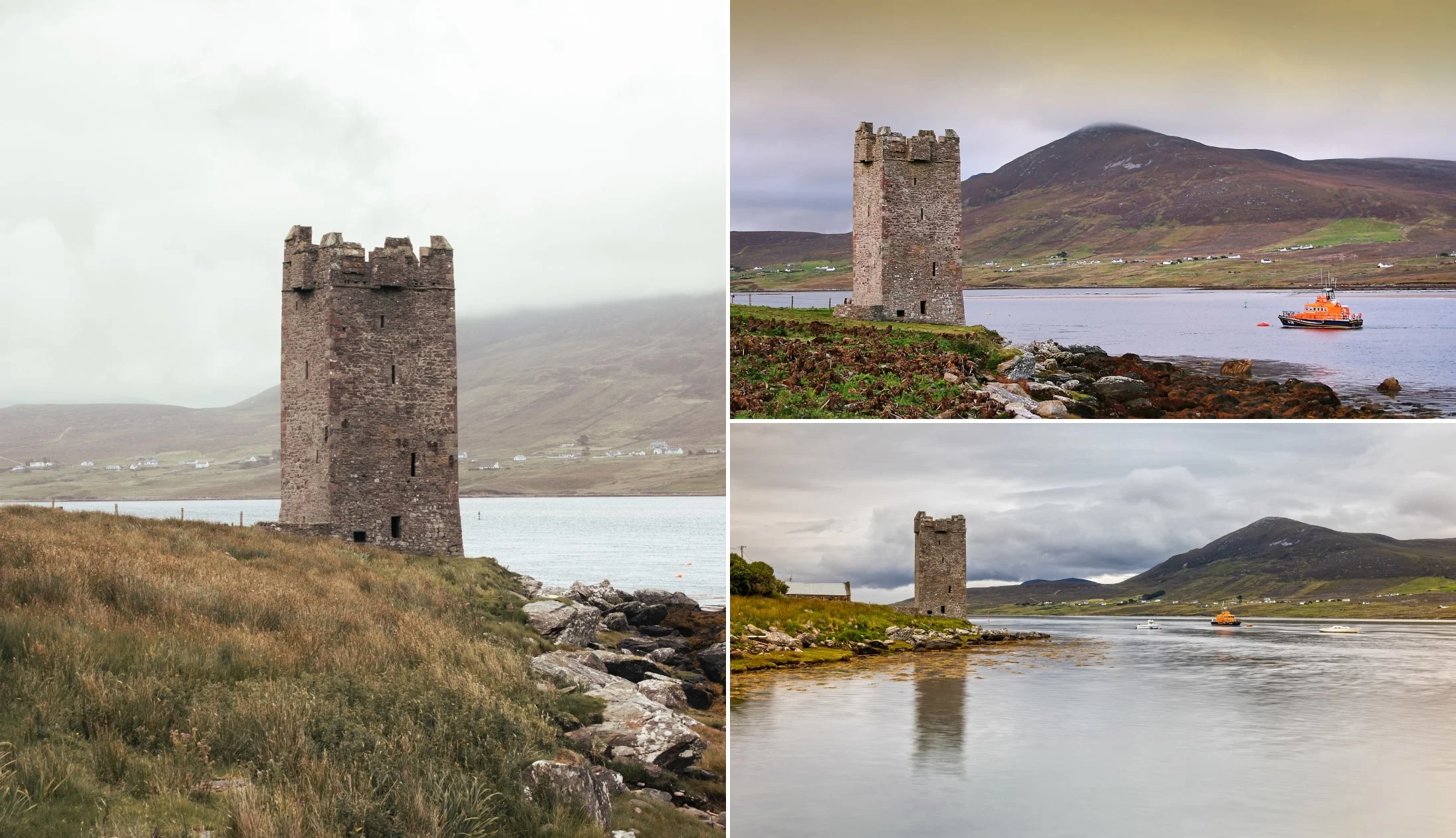
Photos via Shutterstock
Our final stop on Achill Island takes us to Grace O’Malley’s Towerhouse. It’s just an 11-minute drive from the White Cliffs of Ashleam on the edge of Achill Sound. The tower dates back to the 15th century and was famously used by Grace O’Malley, the legendary Pirate Queen, who ruled the island hundreds of years ago. You’ll find a small car park at the tower, and if you want to get close, just hop over the stile and walk over.
Stop 9: Westport for the night
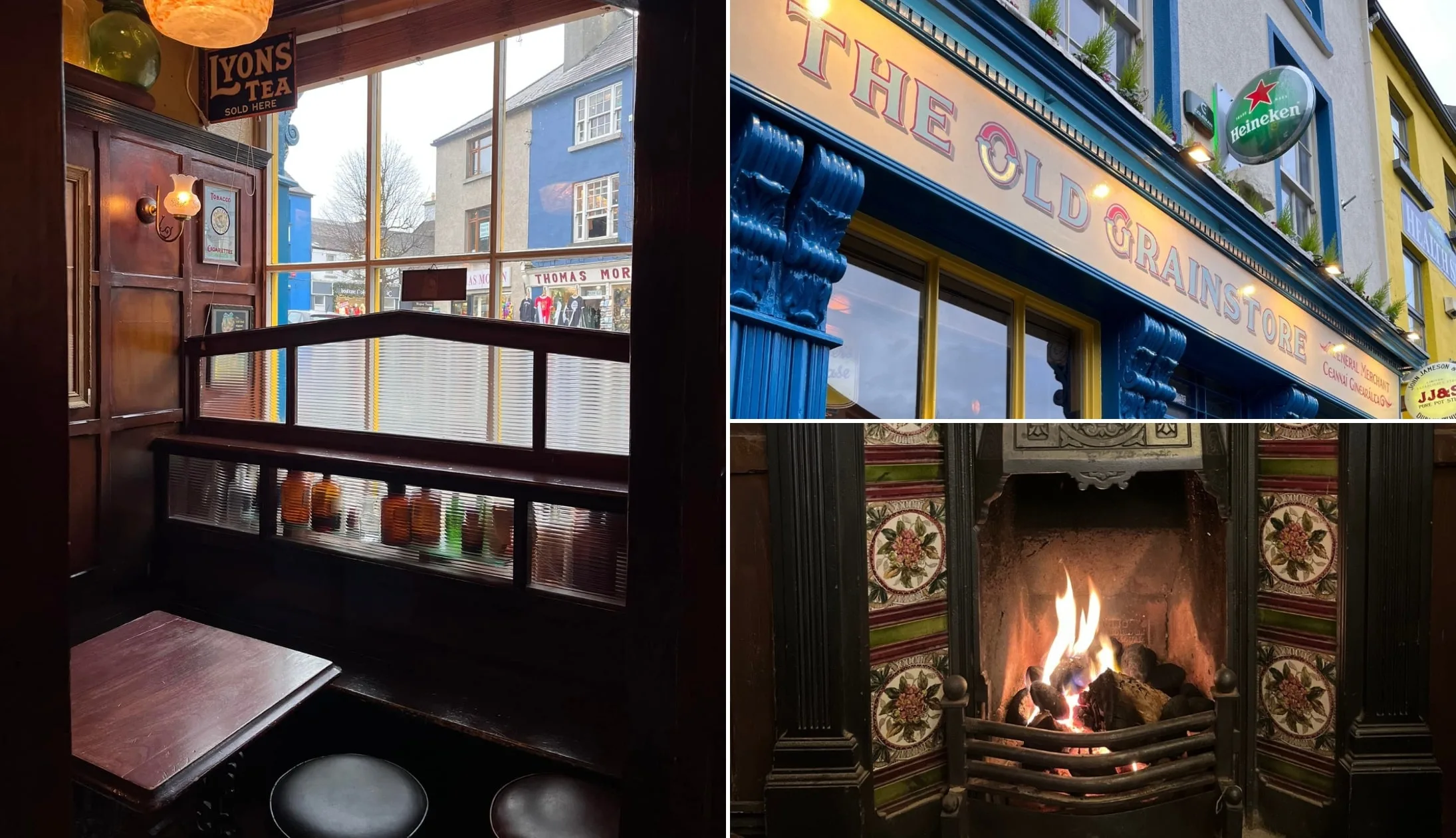
Photos via The Old Grainstore on FB
Our final stop for the day takes us back onto the mainland and to the vibrant seaside town of Westport, which is about 50 minutes away.
Along the way, we’ll pass Clew Bay, which is home to 365 islands, one for each day of the year. After a long day on the road, you’ll want to check into your accommodation, freshen up, and then reward yourself with dinner and a few drinks in town.
Our Westport food recommendations
There’s some excellent restaurants in Westport, and the town is another great place for locally-sourced food, with a host of restaurants to choose from. The award-winning An Port Mor, located in the town centre, is one of the best, with an array of succulent dishes, including the ever-popular Clew Bay Lobster.
JJ O’Malleys is another great choice, beloved by locals and visitors alike for its extensive menu that combines traditional Irish food and seafood with contemporary dishes. Plus, the decor is fantastic!
Our Westport pub recommendations
There’s some mighty pubs in Westport, too! For an end-of-day pint, you’d struggle to beat a visit to Toby’s Bar.
Small and unassuming, it’s a favourite among locals, with a friendly crowd of regulars. It boasts a fantastic atmosphere and many say that they pour the best pint of Guinness in town.
Blousers is another great option, especially on a cold night. A dram of whiskey or a pint by the roaring fireplace is always a welcome treat, plus they’ll often have live music.
The most iconic pub for live music in Westport is definitely Matt Molloy’s. It’s owned by the flautist from The Chieftains (if you’ve not heard them, check them out!) and offers traditional Irish music live every night. It has a lively atmosphere and often attracts a crowd.
Day 7: Westport and surrounds
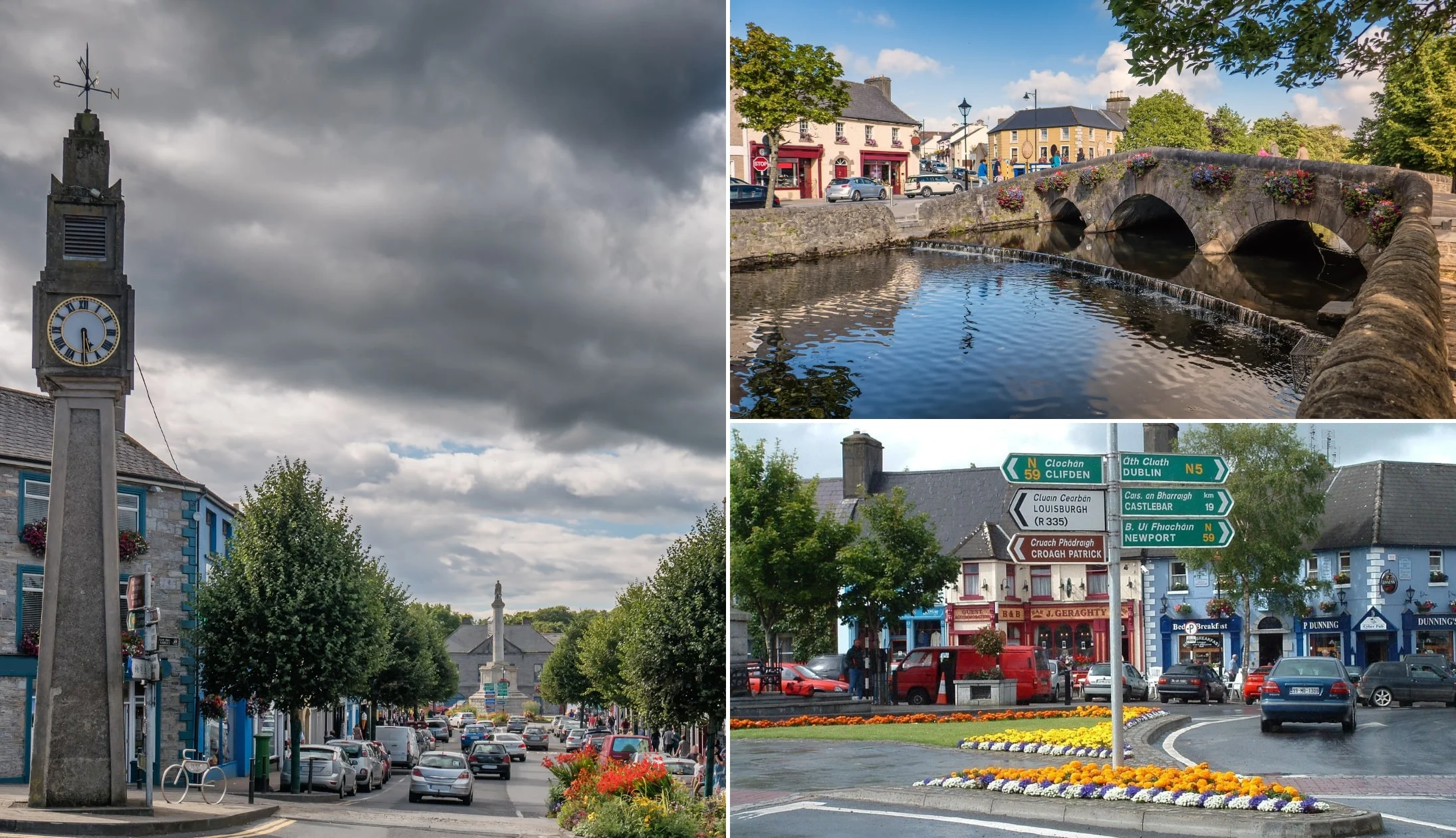
Photos via Shutterstock
After a day of exploring the coasts and countryside of County Mayo, we’ll be taking it easy today as we discover the attractions in and around Westport. From beaches to historic houses, there’s lots to take in, all at your own pace.
First things first, you’ll want to grab a hearty breakfast either at your accommodation or in town. If you’re heading into town, This Must Be The Place serves up a mighty feed and a superb cup of coffee. The menu encompasses a bunch of healthy breakfast classics, as well as vegan options, toasties, and tasty cakes.
If you’re craving something not quite so healthy, get down to Cians for one of the best full Irish breakfasts in the country. The locally sourced ingredients make all the difference and it makes for a decadent start to the day.
Stop 1: Bertra Beach
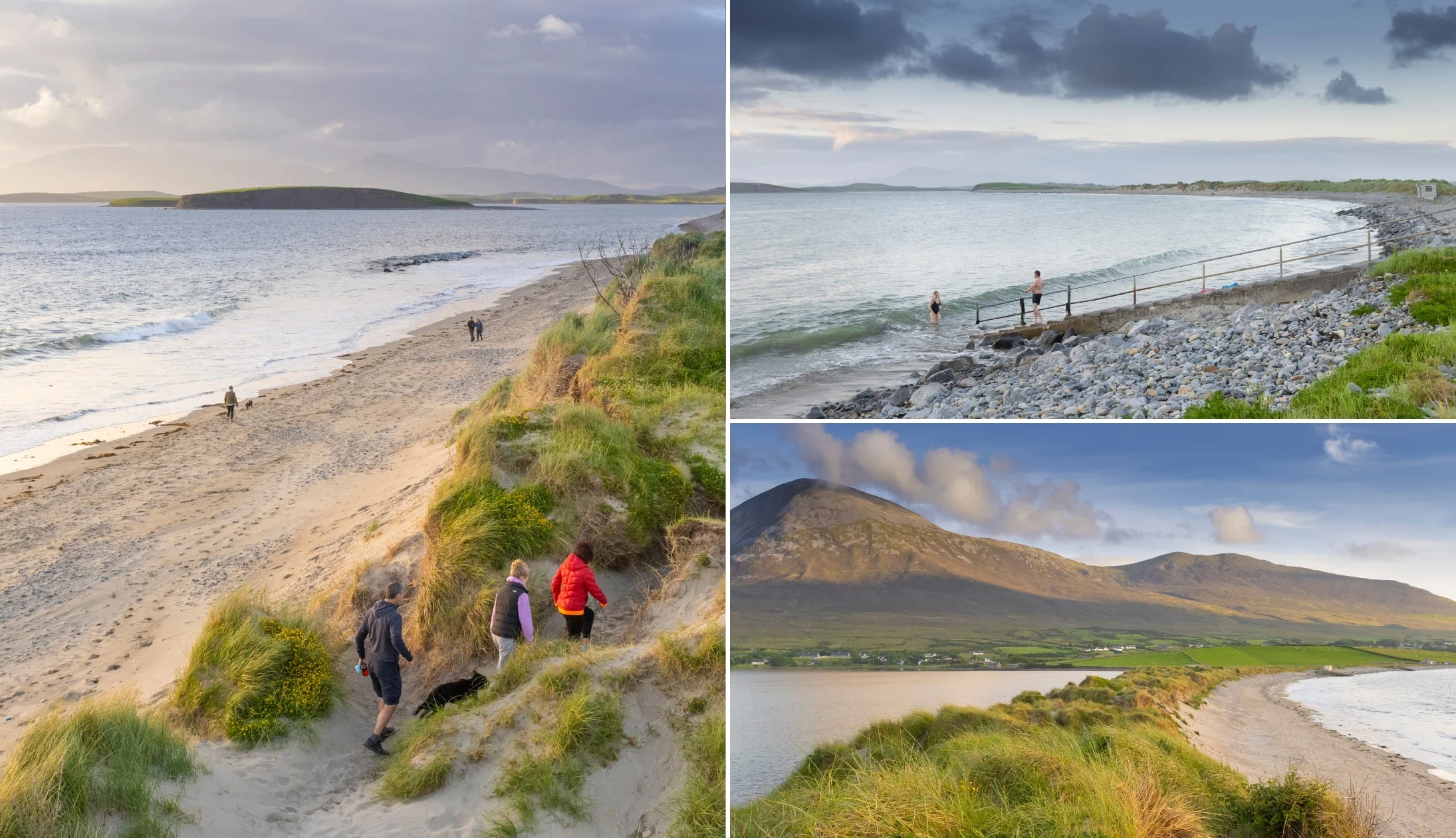
Photos courtesy Michael Mc Laughlin via Falte Ireland
There’s a handful of beaches near Westport, but few can go toe-to-toe with the brilliant Bertra Beach.
It’s a handy 20-minute spin from the town, and, despite being a favourite amongst locals, many tourists tend to miss it.
It’s a lovely spot for an early morning saunter, and it’s nice and close to your next stops today.
Stop 2: The National Famine Memorial
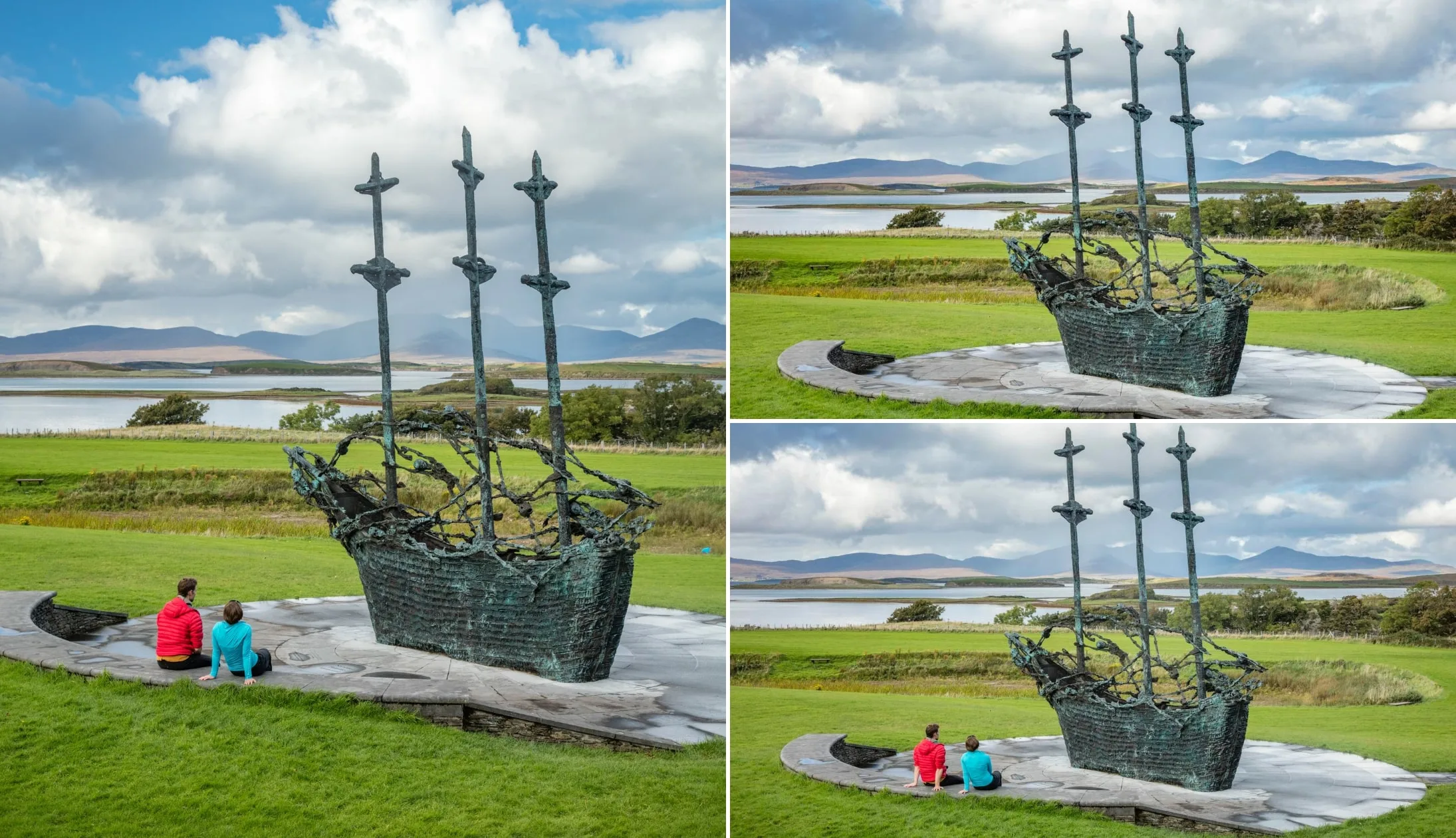
Photos courtesy Gareth McCormack/garethmccormack via Failte Ireland
The National Famine Memorial is just a 5-minute drive away from Tullymore Bay Beach, in the vibrant village of Murrisk. Sitting in the shadow of Croagh Patrick, you’ll be rewarded with more excellent views of the holy mountain. The area marks the starting point of the annual pilgrimage up the mountain, while the memorial stands as a poignant monument to everyone who died or immigrated during the famine.
Stop 3: Murrisk Abbey
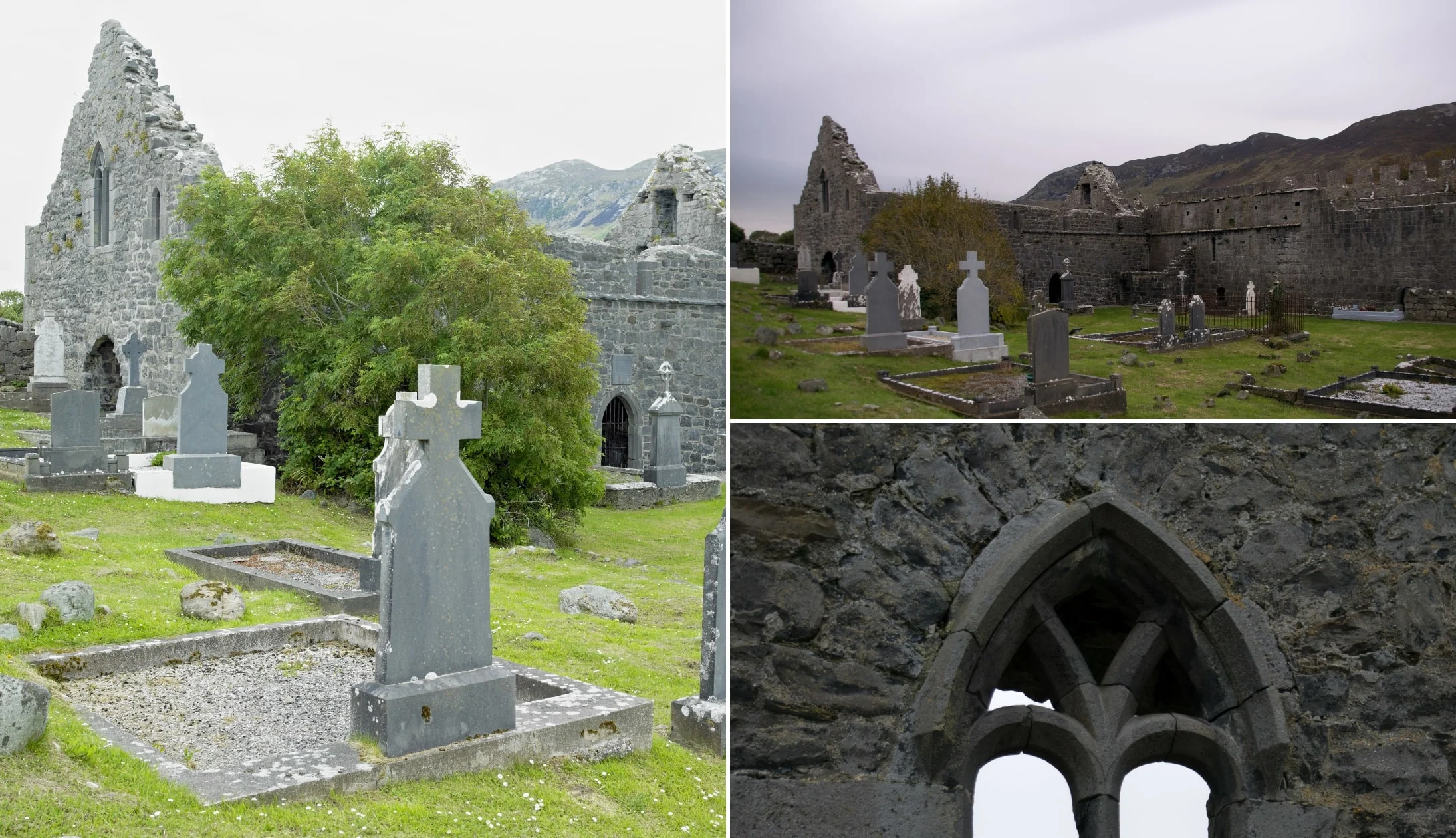
Photos via Shutterstock
Just a 3-minute walk from the National Famine Memorial, Murrisk Abbey is a gorgeously peaceful place to wander around. The ruins date back to 1456 yet remain remarkably well-preserved in spite of their age. A number of information panels provide further details of the history of the area, which now also serves as a cemetery.
If you prefer to eat lunch locally rather than back in Westport, the Tavern Bar and Restaurant is an excellent choice. It’s about a 7-minute walk from the National Famine Memorial, or you can drive and park up there if there are spaces. With an extensive menu, excellent seafood options, and a cosy atmosphere, it’s always worth a visit.
Stop 4: Lunch in Westport
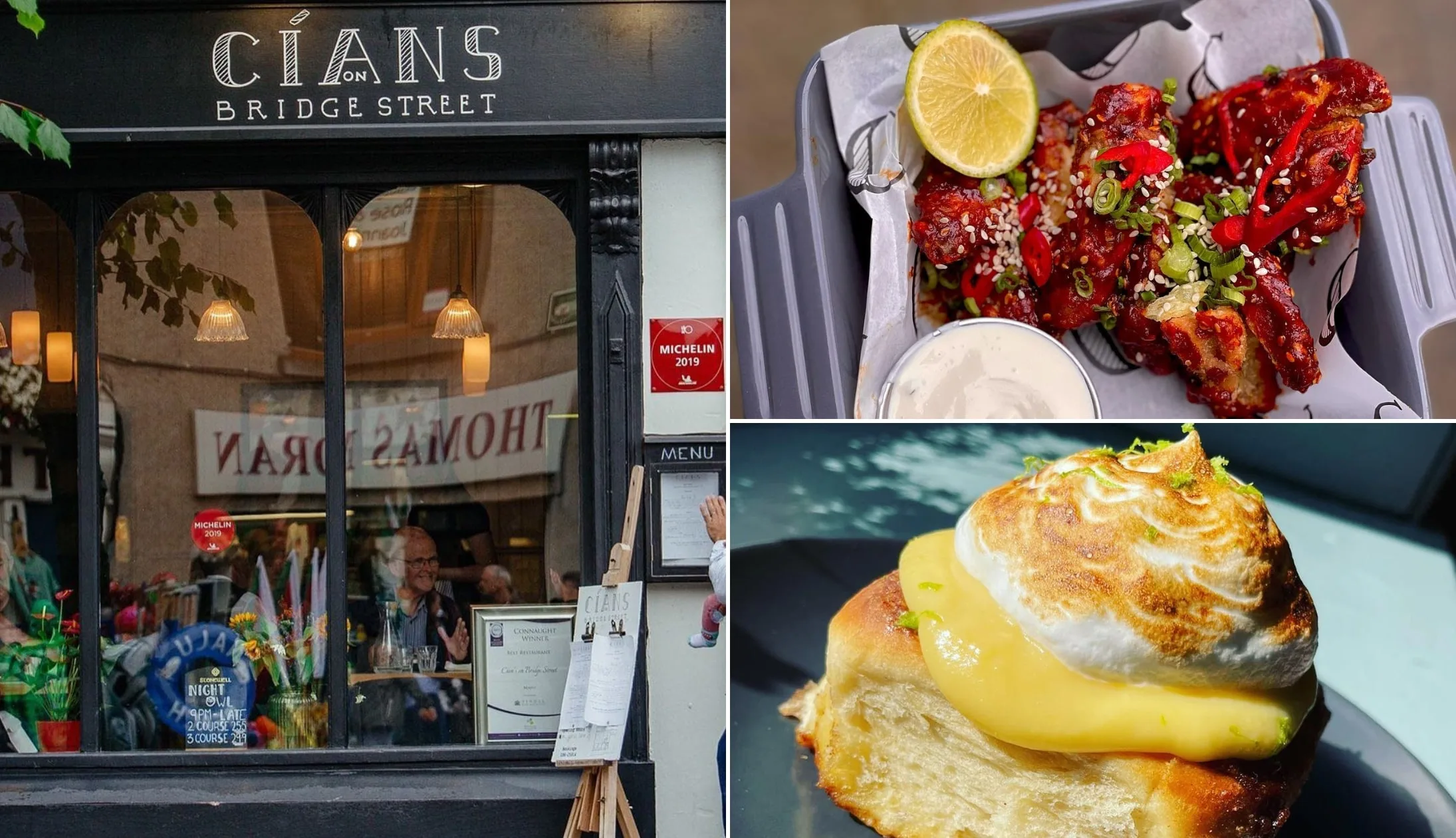
Photos via Cian’s on FB
Alternatively, head back to Westport for lunch, where you’ll find a host of great places to grab a bite to eat. Check out Cian’s on Bridge Street if you haven’t already for an array of sensational Irish dishes, like the incredible roast lamb rump. Or, for vegan dishes and lighter bites, get down to Friend’s Bistro. You should find plenty of street parking near both cafes, particularly around the Octagon.
Stop 5: Westport House
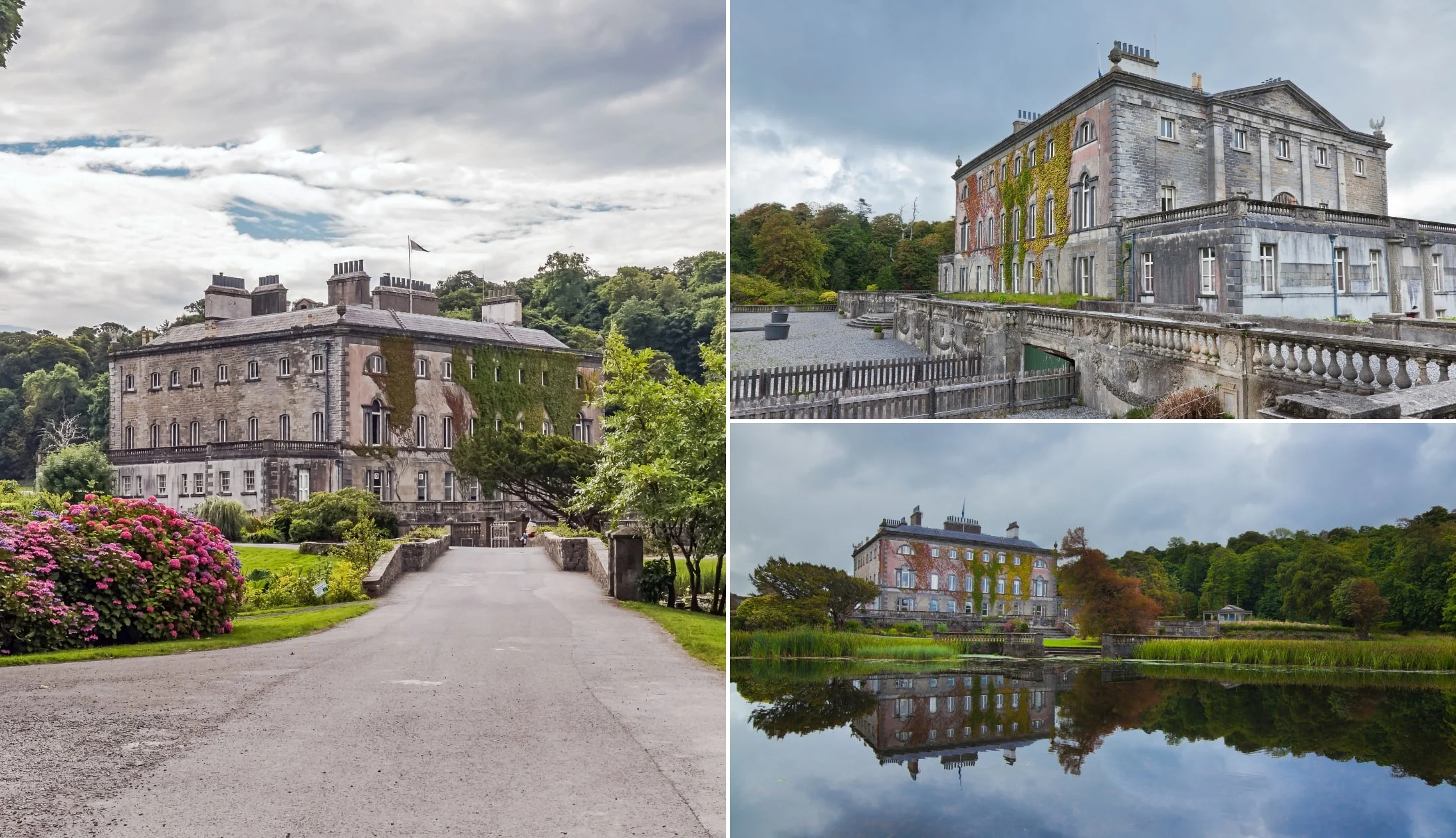
Photos via Shutterstock
After an enjoyable lunch, let’s head to the stunning Westport House, which is about a 5-minute drive away. You can also walk there from the town centre in around 15 minutes. There are loads of things to see and do at this spectacular country estate. The grounds and gardens cover more than 400 acres, and a number of walking trails enable you to explore terraces, forests, and flower gardens.
Stepping inside takes you back in time, and you can enjoy either a guided or self-guided tour of the property. As you go, you’ll discover the history of the house and its various rooms through stories, artwork, and exhibits.
Stop 5: Dinner, drinks and live music in Westport

Photos via The Old Grainstore on FB
It’s been a busy day, so why not grab dinner and finish your night with a pint at the iconic Matt Molloy’s Pub for some of the best live trad sessions this side of the Shannon?
Our Westport food recommendations
There’s some excellent restaurants in Westport and the town is another great place for locally-sourced food, with a host of restaurants to choose from. The award-winning An Port Mor, located in the town centre, is one of the best, with an array of succulent dishes, including the ever-popular Clew Bay Lobster.
JJ O’Malleys is another great choice, beloved by locals and visitors alike for its extensive menu that combines traditional Irish food and seafood with contemporary dishes. Plus, the decor is fantastic!
Our Westport pub recommendations
There’s some mighty pubs in Westport, too! For an end-of-day pint, you’d struggle to beat a visit to Toby’s Bar.
Small and unassuming, it’s a favourite among locals, with a friendly crowd of regulars. It boasts a fantastic atmosphere and many say that they pour the best pint of Guinness in town.
Blousers is another great option, especially on a cold night. A dram of whiskey or a pint by the roaring fireplace is always a welcome treat, plus they’ll often have live music.
The most iconic pub for live music in Westport is definitely Matt Molloy’s. It’s owned by the flautist from The Chieftains (if you’ve not heard them, check them out!) and offers traditional Irish music live every night. It has a lively atmosphere and often attracts a crowd.
Day 8: The Trip to Dublin
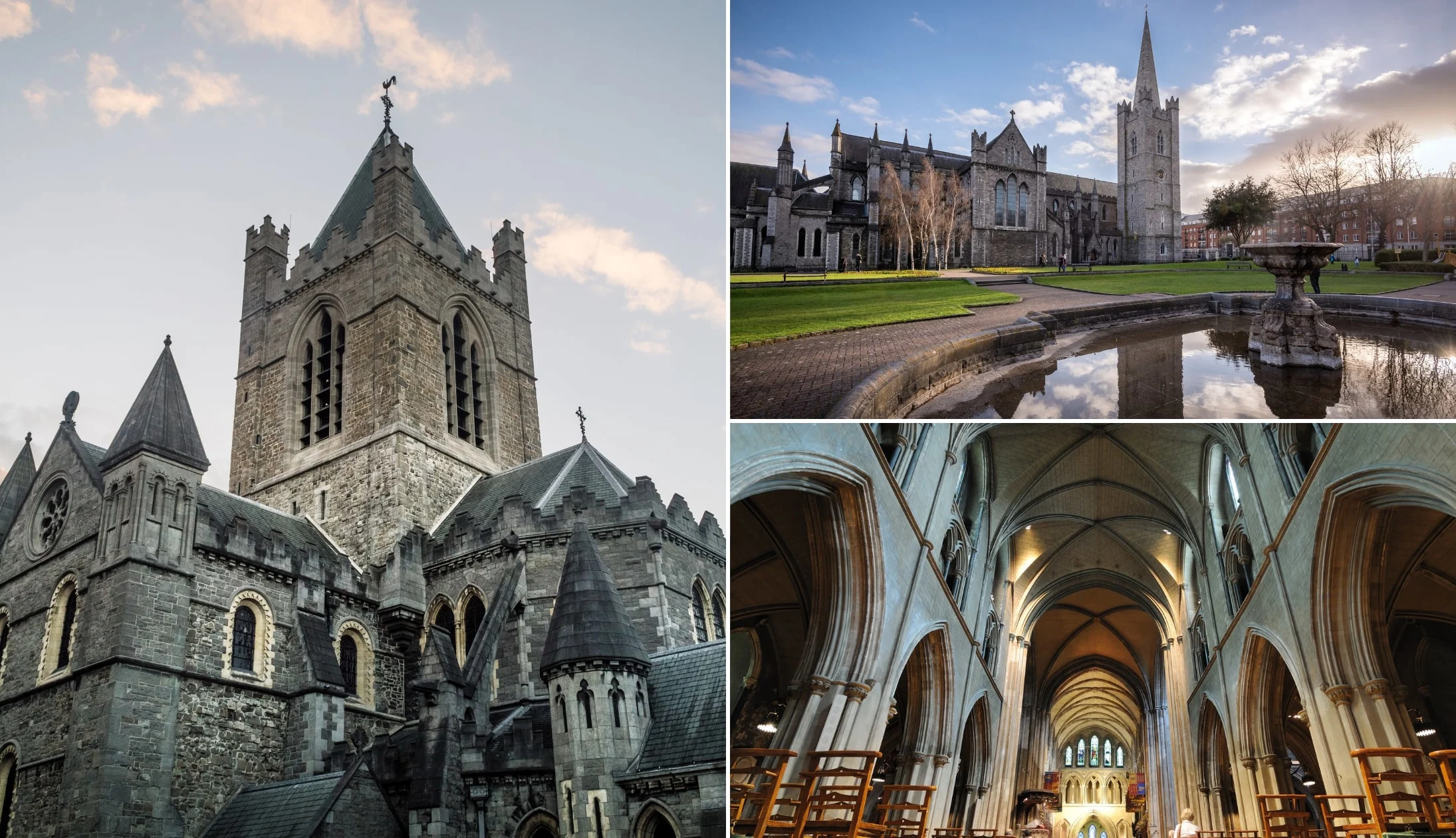
Photos via Shutterstock
Next stop, Dublin City! We’ll be driving straight to the city from Westport in order to spend the rest of the day exploring Ireland’s vibrant capital city on foot.
You’ll be spending two nights in Dublin – make sure to book your accommodation in advance.
Recommended accommodation in Dublin
- Budget: Abigail’s Hostel (Temple Bar), Jacobs Inn (central hostel) and the Generator Hostel (short walk from the city)
- Mid-range: Dublin Skylon Hotel (just outside the city), Wren Urban Nest (Temple Bar) and the Harding Hotel (very central)
- Luxury: The Merrion (St. Stephen’s Green – very central) and The Westin (just off Grafton Street)
Getting around Dublin + money savers
- Time savers: If you want to avoid walking where possible, it’s worth getting a ticket for the Hop On Hop Off Bus around Dublin. It goes to or near all of the main sites on this itinerary plus plenty more.
- Money saver: If you’re visiting the ‘main’ Dublin attractions, the Dublin Pass can save you €€€ (here’s how)
Stop 1: Dublin City
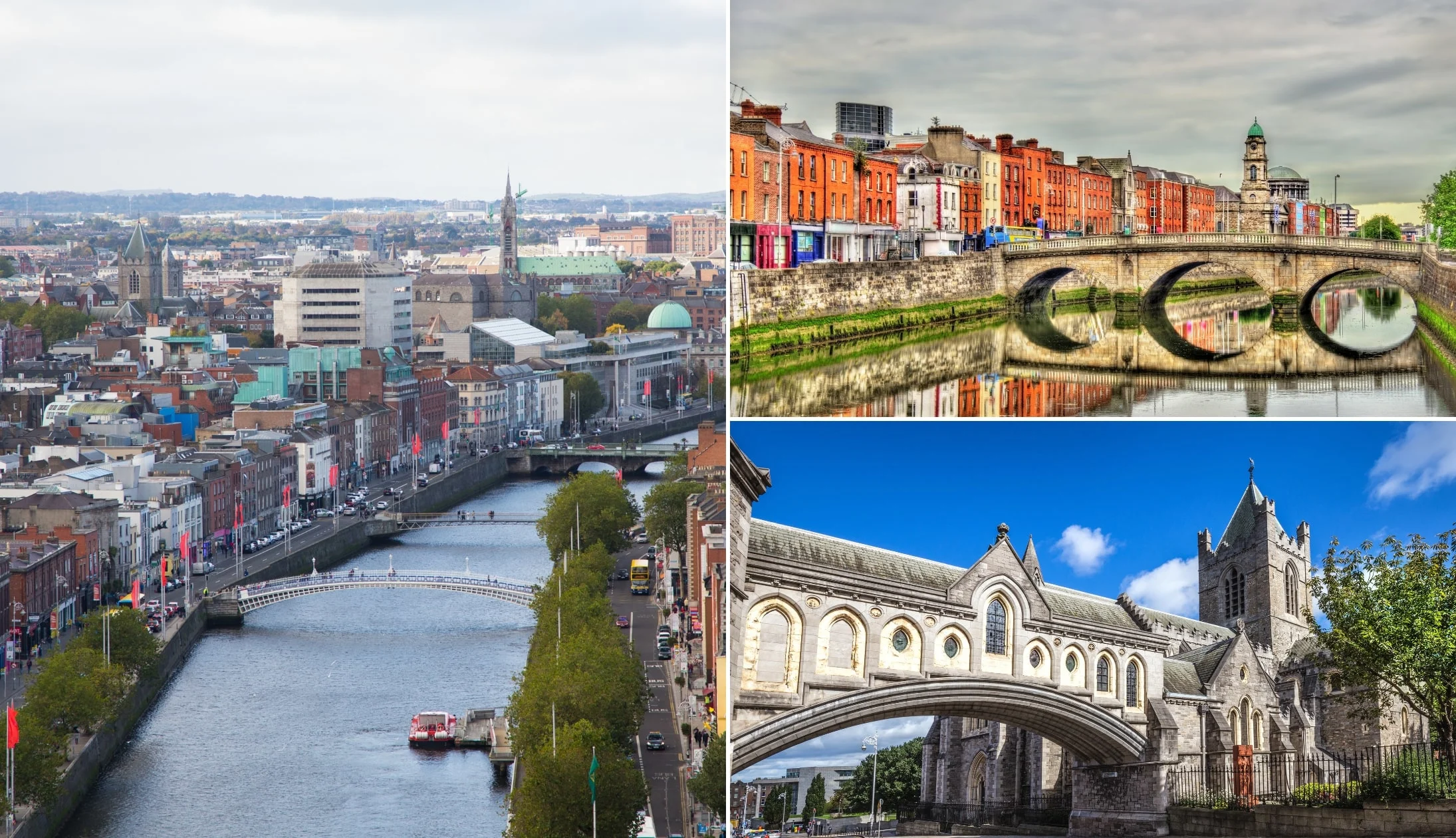
Photos via Shutterstock
We’ll be starting the day with a fairly long, 3-hour drive straight from Westport to Dublin. The road mostly takes us along the M6 motorway.
The section between junction 16 and 15 is a toll road, which costs €2 for cars or €1 for motorcycles. You can pay cash or by card at the toll gate but you can check with your rental car provider to see if your rental agreement covers the payment of toll charges.
If you fancy a coffee halfway through, you could drop into the beautiful town of Athlone to stretch your legs and grab a cup. It’s a beautiful little town on the River Shannon, and there are tons of cafes there.
We like to park up at the Strand Car Park on the riverfront, then drop into Shannon Crafts & Coffee Dock for a cup of tea or coffee and a nice slice of cake by the river.
Once you arrive in Dublin, head to your accommodation to check in and park up, as we’ll be on foot for the rest of the day.
Stop 2: Park up and then head to Trinity College
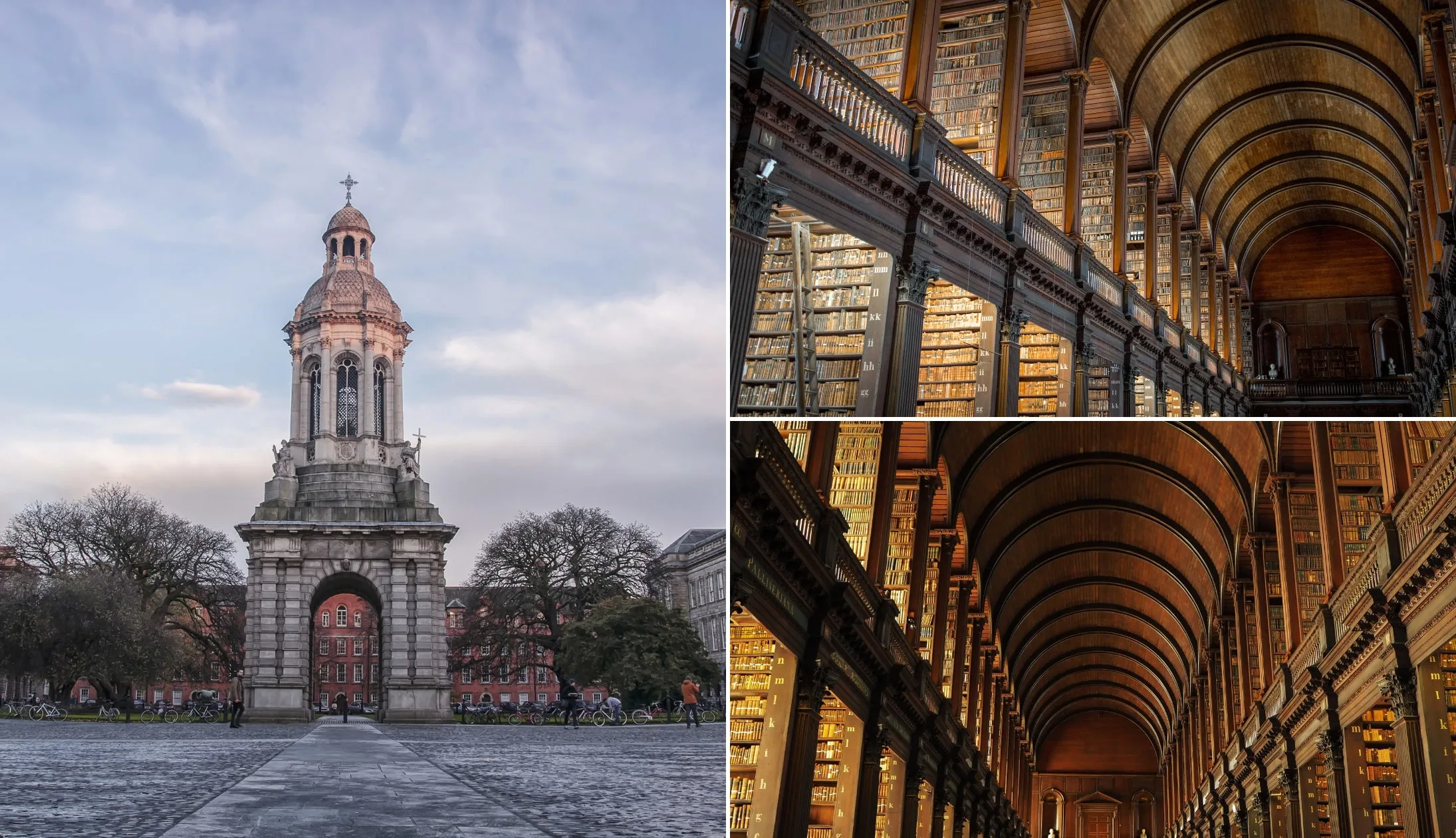
Photos via Shutterstock
Head straight to wherever you’re staying. Check in and leave the car behind you. The city is very walkable.
When you get to the city, head straight for Trinity College to see the Book of Kells, arguably the most famous cultural attraction in Dublin.
If you can, we highly recommend pre-booking your tickets online, as the queues can get really long (bordering on ridiculous!). This fast-track ticket allows you to dodge the queue and gets you into Dublin Castle, too!
Spend around one hour seeing the Book of Kells, walking around the exhibit, and taking in the beauty of the Old Library. After that, give yourself another 20 minutes or so to walk around the university campus.
Stop 3: Lunch
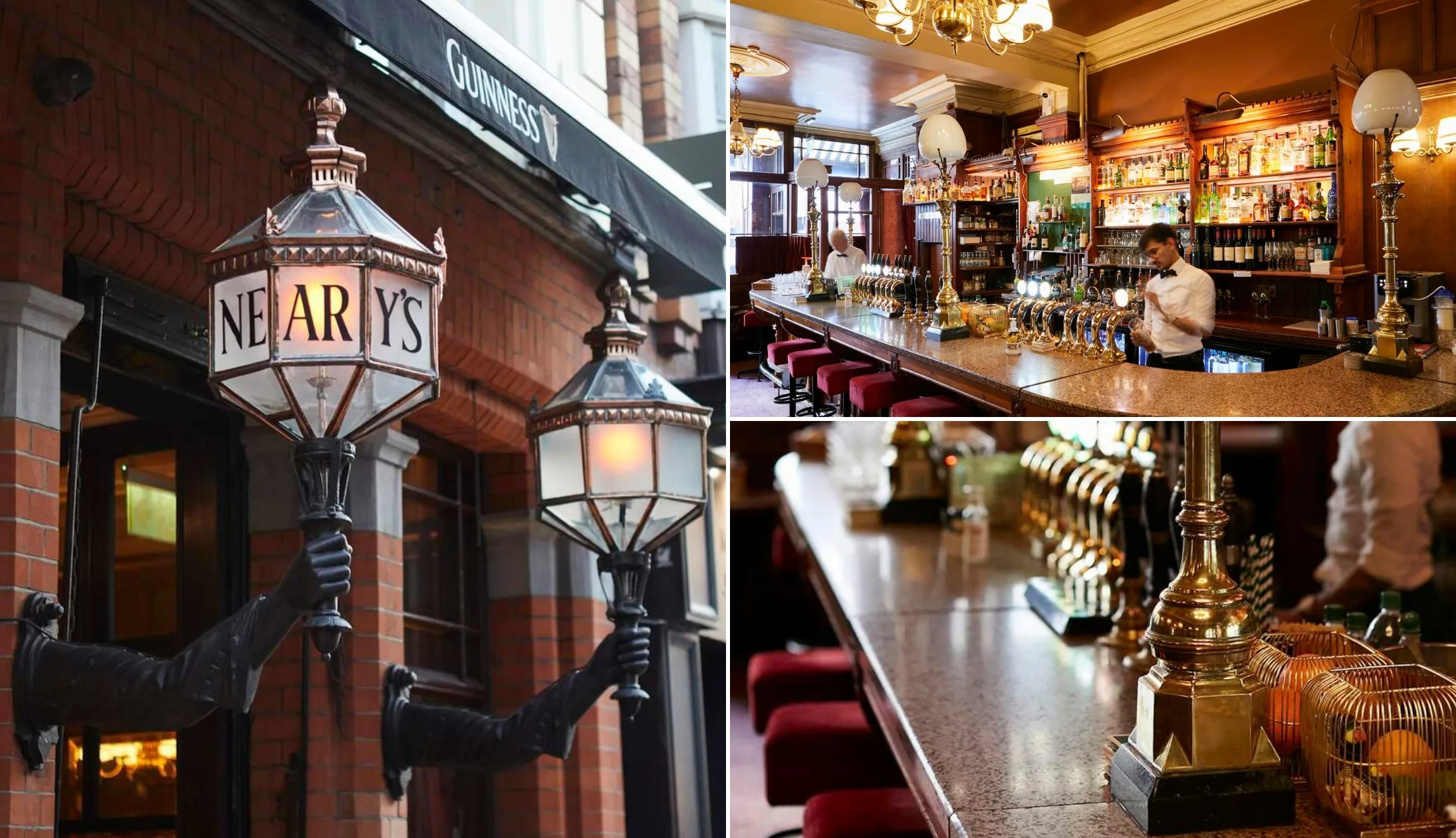
Photos © Tourism Ireland
There’s plenty of great restaurants in Dublin, but for lunch we suggest you head to Neary’s. It’s just up the road from Trinity College, along the bustling Grafton Street.
This old-school pub is a classic and it serves up a range of simple lunch options, like sandwiches, soup, toasties, and Carlingford Oysters, all washed down with a tasty pint of Guinness.
Affordable and delicious, we can’t recommend it highly enough. Sprout and Co on Dawson Street is another good shout for a quick, light lunch that tastes great and is close to Trinity College.
Stop 4: The Ha’penny Bridge (via Temple Bar)
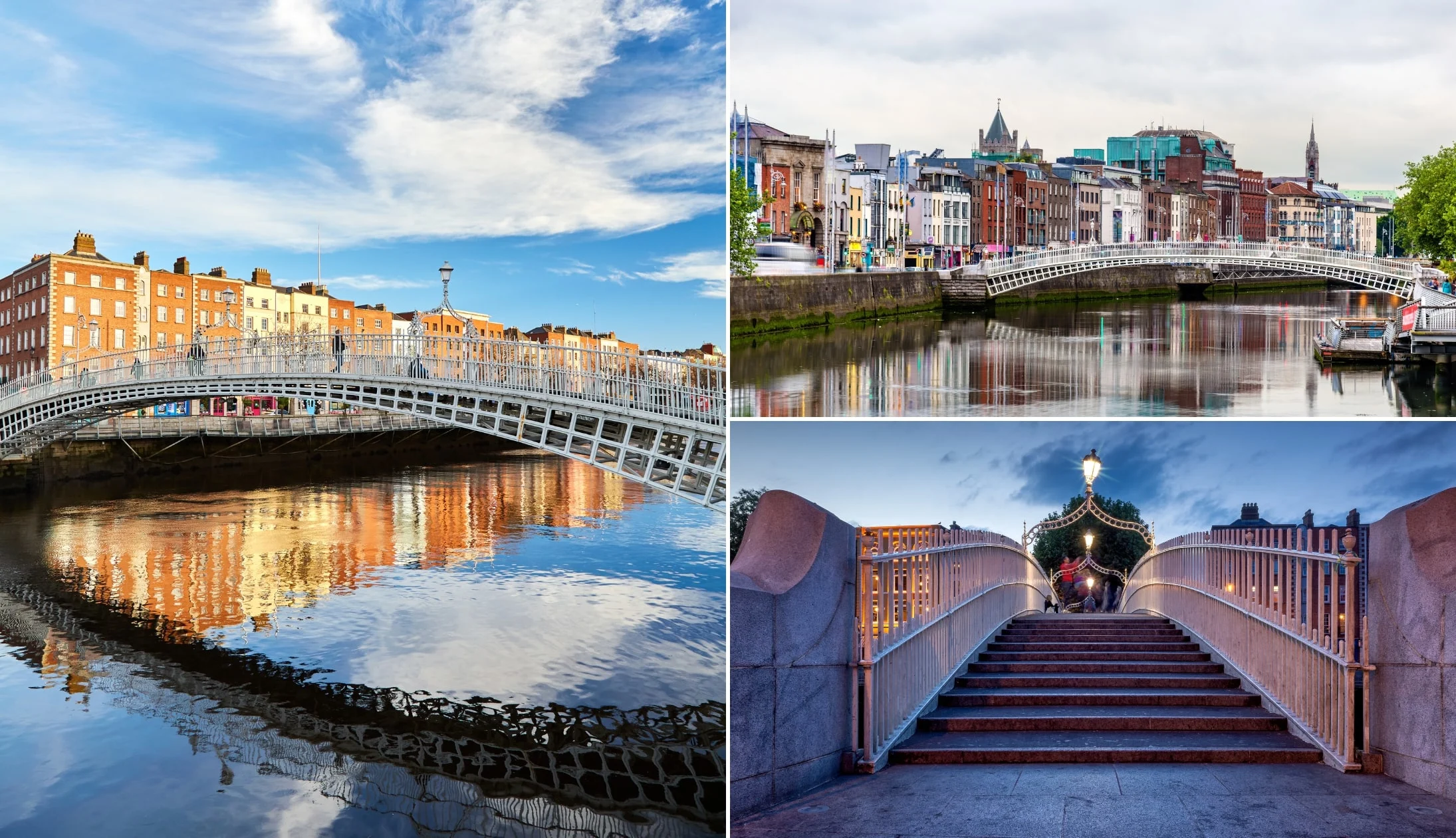
Photos via Shutterstock
The Ha’penny Bridge is an iconic sight in Dublin and crossing it is a must. From Neary’s, it’s about a ten-minute walk that passes through the vibrant Temple Bar area.
As you pass through Temple Bar, you’ll see why this is the nightlife capital of Dublin, with endless pubs and clubs lining the streets.
The bridge itself is a quaint little footbridge over the River Liffey. In the old days, you’d have to pay a toll of half a penny to cross, hence the name.
If you fancy a coffee after your walk, head to Vice Coffee Inc, just over the bridge for a superb brew. You’ll also find tons of shops and pubs to enjoy on either side of the bridge.
Stop 5: Christ Church Cathedral
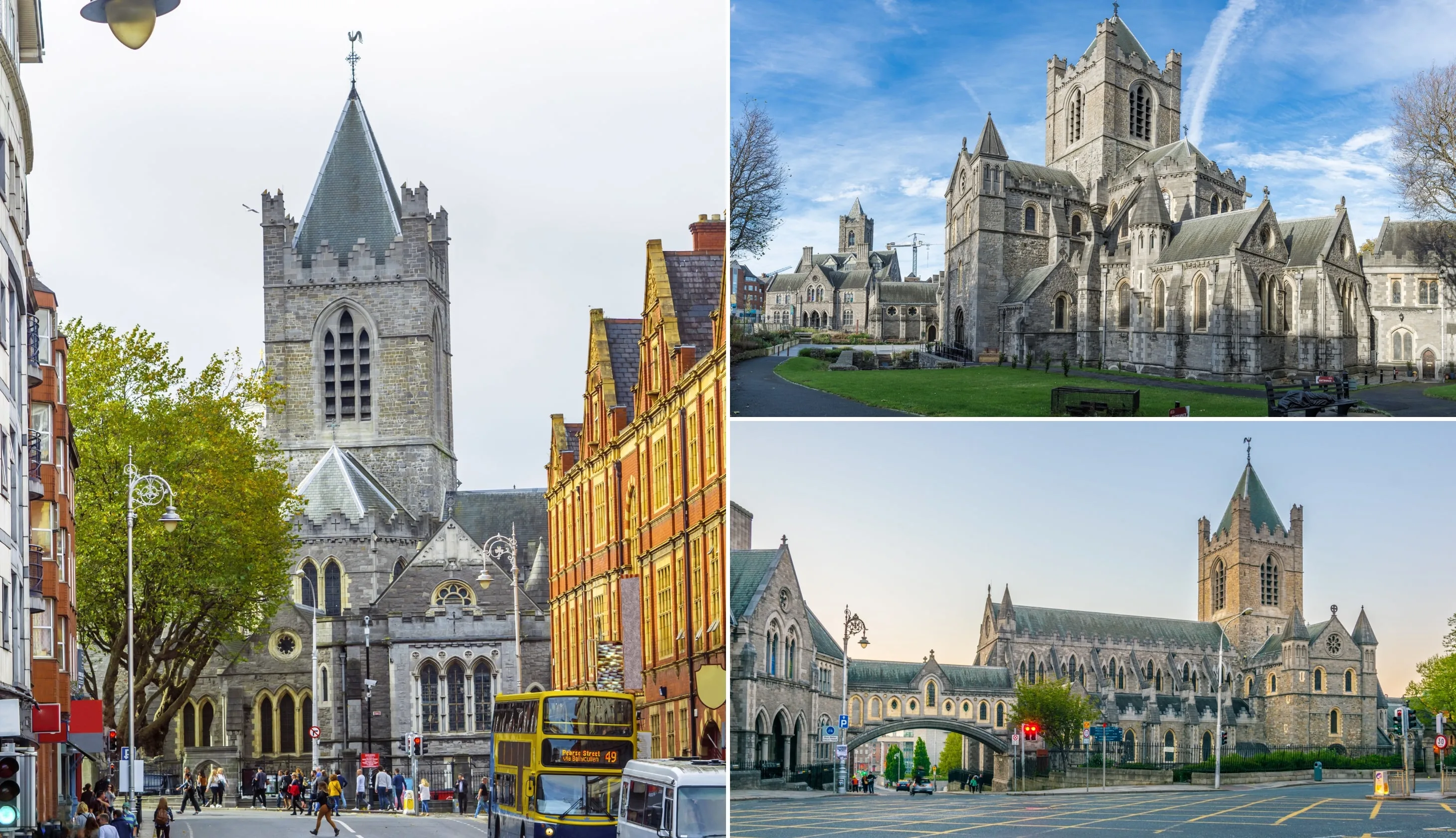
Photos via Shutterstock
Christ Church Cathedral is another of Dublin’s top attractions and dating back more than 1,000 years, it’s pretty much as old as the city itself!
Steeped in history, it was originally founded by Viking king Sitruic Silkenbeard, but it’s come a long way since those early days (you can grab a ticket online here).
After admiring the stunning architecture from the outside, you can take a self-guided audio tour inside the cathedral.
Along the way, you’ll discover Strongbow’s grave and explore the crypts, which are home to a wealth of artefacts and exhibits, with such treasures as the mummified cat chasing a mummified rat inside an organ pipe.
Listen out for the record-breaking bells of Christ Church, and if you’re really lucky, you might catch the choir in action.
Stop 6: Guinness Storehouse
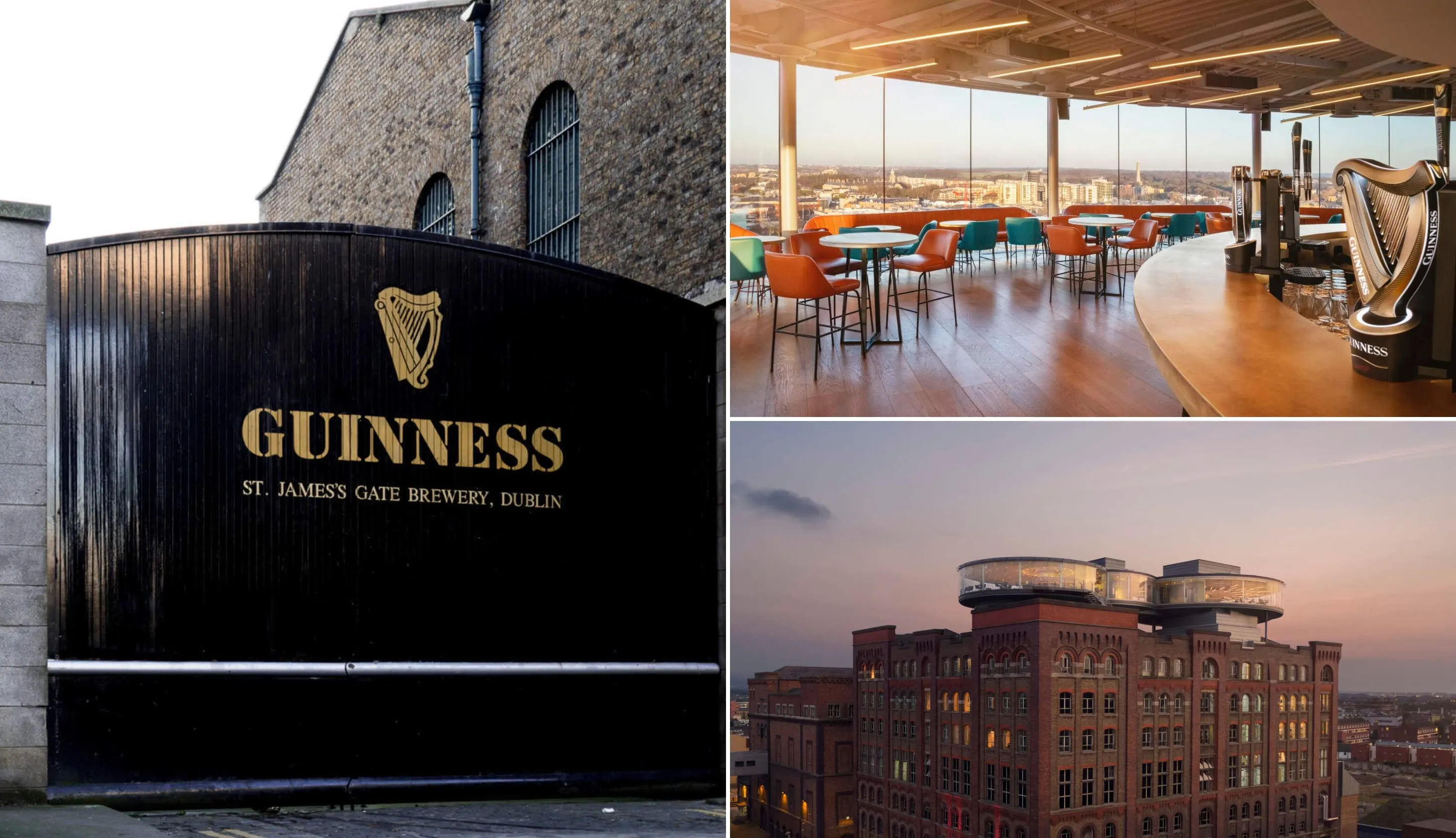
Photos © Diageo via Ireland’s Content Pool
Next up is another iconic Dublin attraction, the Guinness Storehouse. It’s a bit of a walk from the cathedral, around 17 minutes or so.
However, you can easily take the bus to cut out the bulk of the walk. Head round the corner to High Street Stop 1937 and jump on any bus that’ll drop you at Steevens Lane, just ask the driver, but the 13, 27, 77A, 123, G1, and G2 all head that way. From Steevens Lane, it’s just a 4-minute walk to the Guinness Storehouse.
Dublin is the home of Guinness, and this tour of the brewery is a must for anyone with a love for the black stuff. In fact, even if you’re not a fan of beer, this is a fantastic attraction to visit. Book your tickets in advance to avoid the queues. You can do a self-guided tour, but the guided-tour is, in our minds, the better option.
Your knowledgeable guide will tell the iconic story of how Guinness, from its cheeky origins to where it is now, as well as going over the brewing process. Along the way, you’ll hear a number of humorous tales, enjoy some of the brand’s most iconic adverts, and sample the brew at various stages of the process.
To finish, you’ll get a free pint in the fantastic Gravity Bar. Situated on the seventh floor, you’ll enjoy great views over the city as you sink a pint or two.
Stop 7: Dinner, drinks and live music
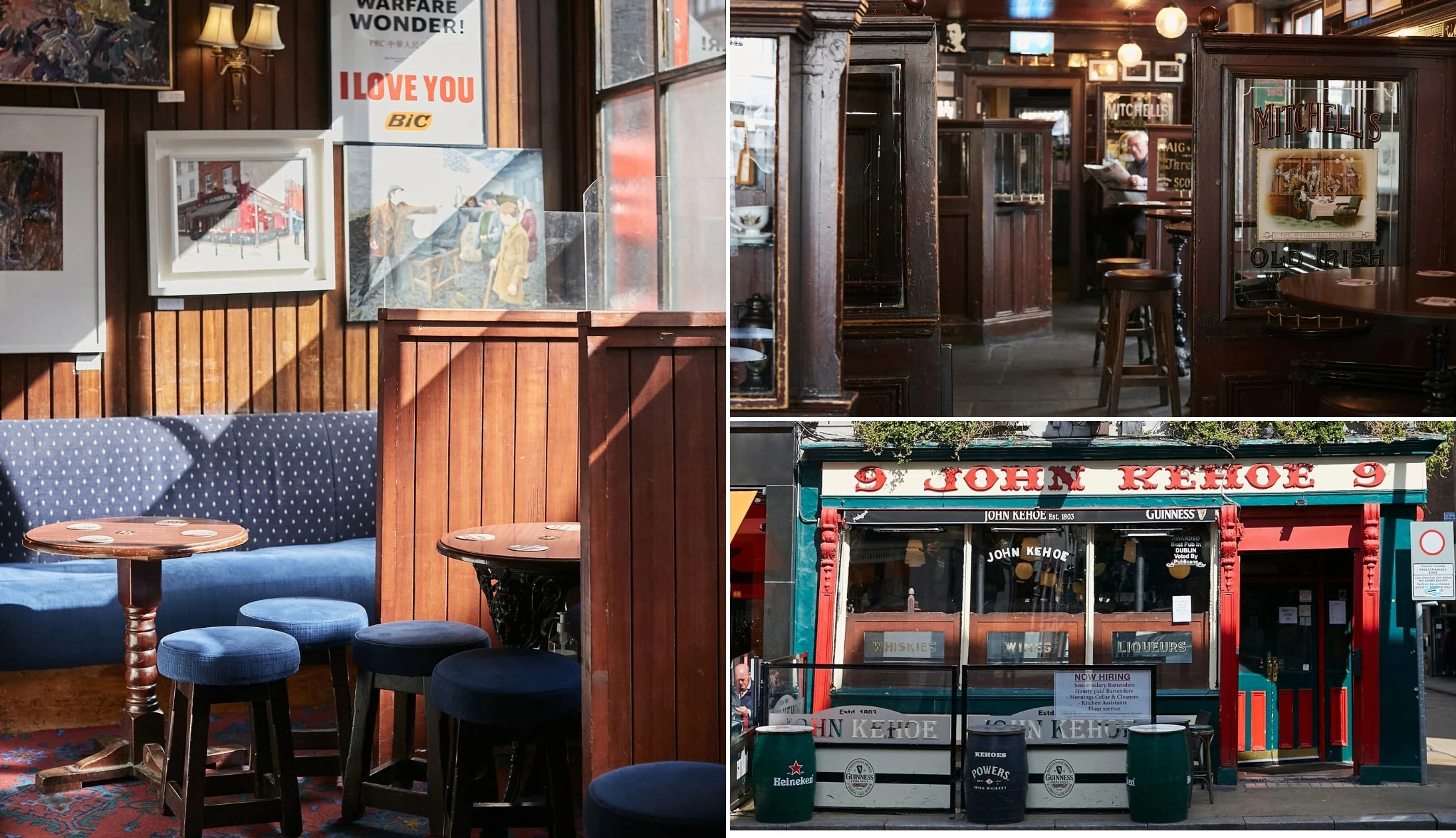
Different trad bars in Dublin. © Tourism Ireland
When you’ve finished at the Guinness Storehouse, you’ll probably be ready for dinner.
For our first night in Dublin, we’ve got a few treats lined up.
Our Dublin food recommendations
There’s endless excellent restaurants in Dublin. However, if we had to pick one or two…
The first would be The Bull and Castle – it’s always a good choice and it’s right across the street from the Christ Church Cathedral.
An FX Buckley steakhouse (a Dublin institution), they offer a great range of steaks cooked to perfection, paired with their incredible beef dripping chips.
The Vintage Kitchen is an alternative, but it’s best to book in advance as it’s incredibly popular. A BYOB (bring your own bottle) place, the food is phenomenal, with a small but diverse menu that features classic Irish dishes with a contemporary twist.
Our Dublin pub recommendations
There’s certainly no shortage of great pubs in Dublin. If you’re a fan of old-school pubs, follow our Dublin pub crawl guide – it contains a short route with some of the city’s finest trad bars.
McNeils on Capel Street is an authentic Dublin pub, complete with wood panelling, impromptu folk sessions, and plenty of beers on tap.
The Long Hall is another must-see. Part Victorian time capsule, part vibrant boozer, it enjoys a fantastic atmosphere and is one of the most visually stunning pubs in the city.
You’ll find trad sessions at Pipers Corner every night of the week. O’Donoghues Bar on Merrion Row is another must-visit, with vintage decor and frequent trad sessions. It’s best known as the home of the Dubliners, who used to play here regularly.
The Celt on Talbot Street is another great choice for live music, and while it’s not always trad, the bands are normally really good.
Day 9: Wicklow’s Wonders
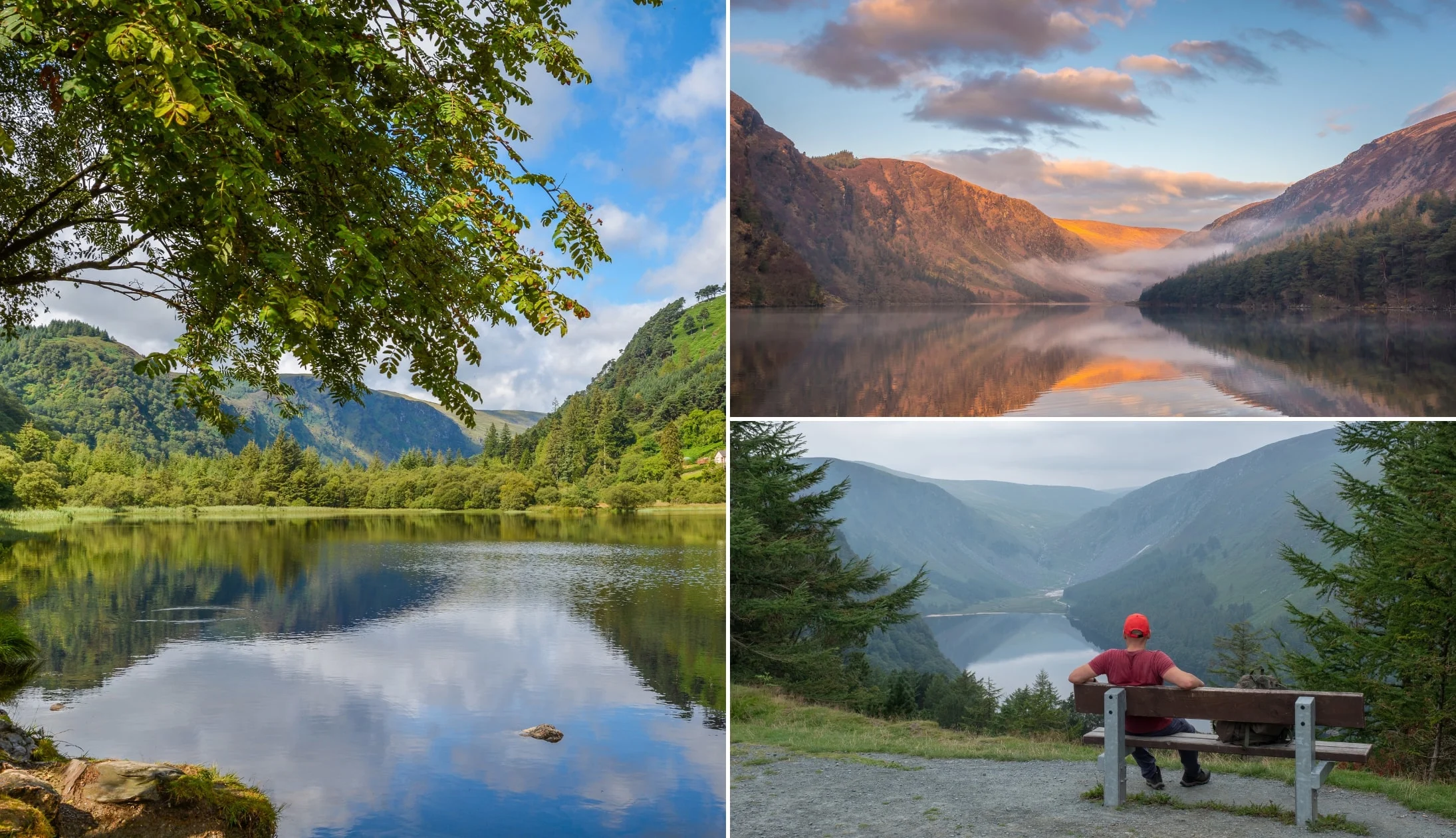
Photos via Shutterstock
Day 9 takes us into the stunning natural beauty of the Wicklow Mountains, just south of Dublin City. We’ll be heading to Glendalough National Park in the heart of the Wicklow Mountains, where you can enjoy a gentle stroll amid some of Ireland’s most spectacular landscapes.
Enjoy a hearty breakfast at your accommodation, or head into town to get food at one of Dublin’s amazing cafes.
We love to go to Lemon Crepe and Coffee Co on Williams Street (it’s just around the corner from the Molly Malone Monument too).
The focus is on pancakes, and you can enjoy a wealth of different sweet or savoury toppings. They also do omelettes and other egg dishes, toasts, melts, waffles, and much more. All washed down with a superb cup of coffee.
Stop 1: Lough Tay
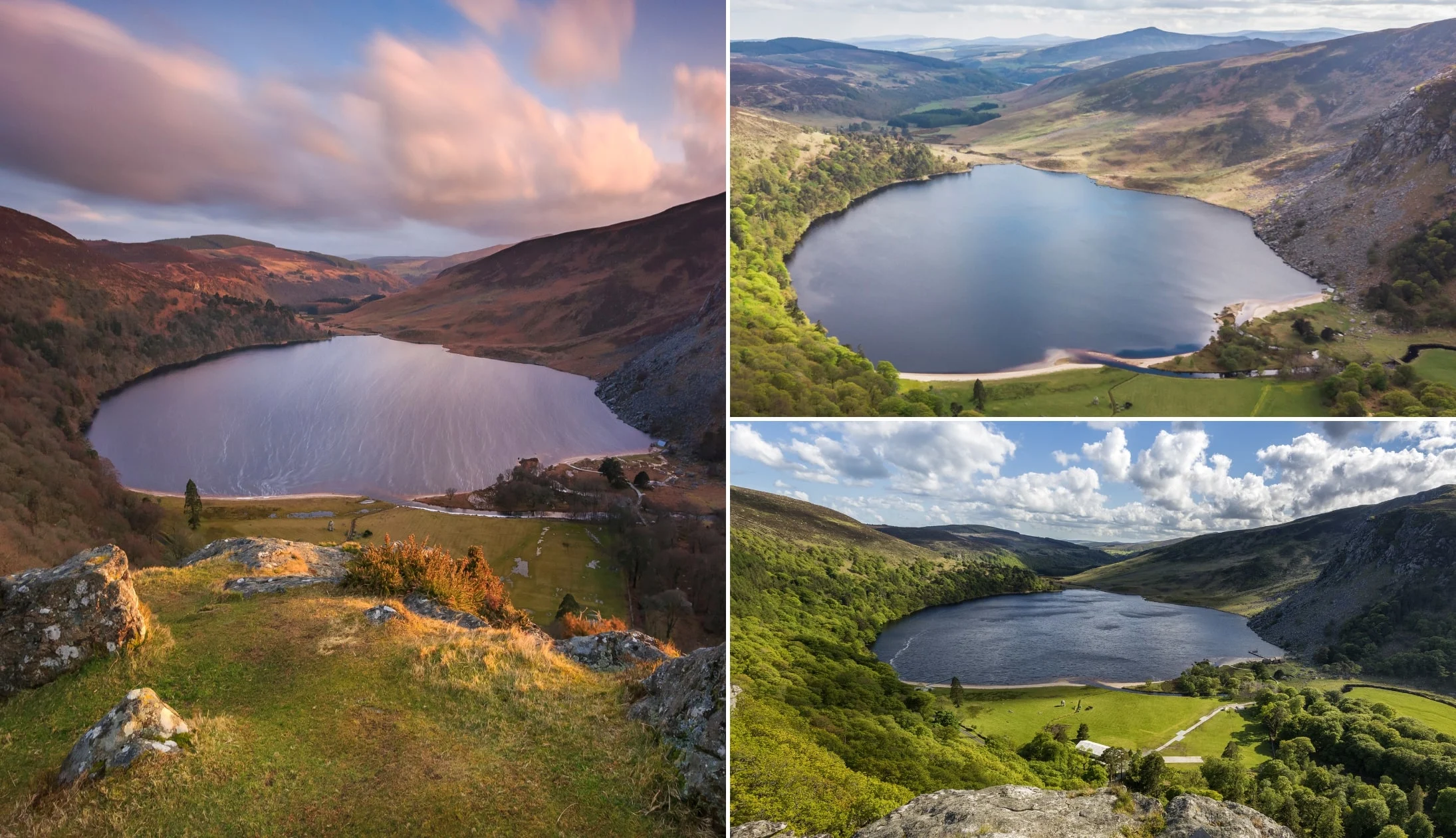
Photos via Shutterstock
We’ll be heading to Glendalough in the heart of the Wicklow Mountains via the glorious Sally Gap Drive, a route with lots to see along the way.
Lough Tay is more famously known as the Guinness Lake, due to the fact that it’s on the Guinness estate, but also because it looks almost like a pint of Guinness when viewed from above.
Keep an eye out for the car park (it’ll be on your right) and pull in. You can soak up some glorious views from just over the road (be very careful here as there are sheer drops).
Stop 2: Glenmacnass Waterfall
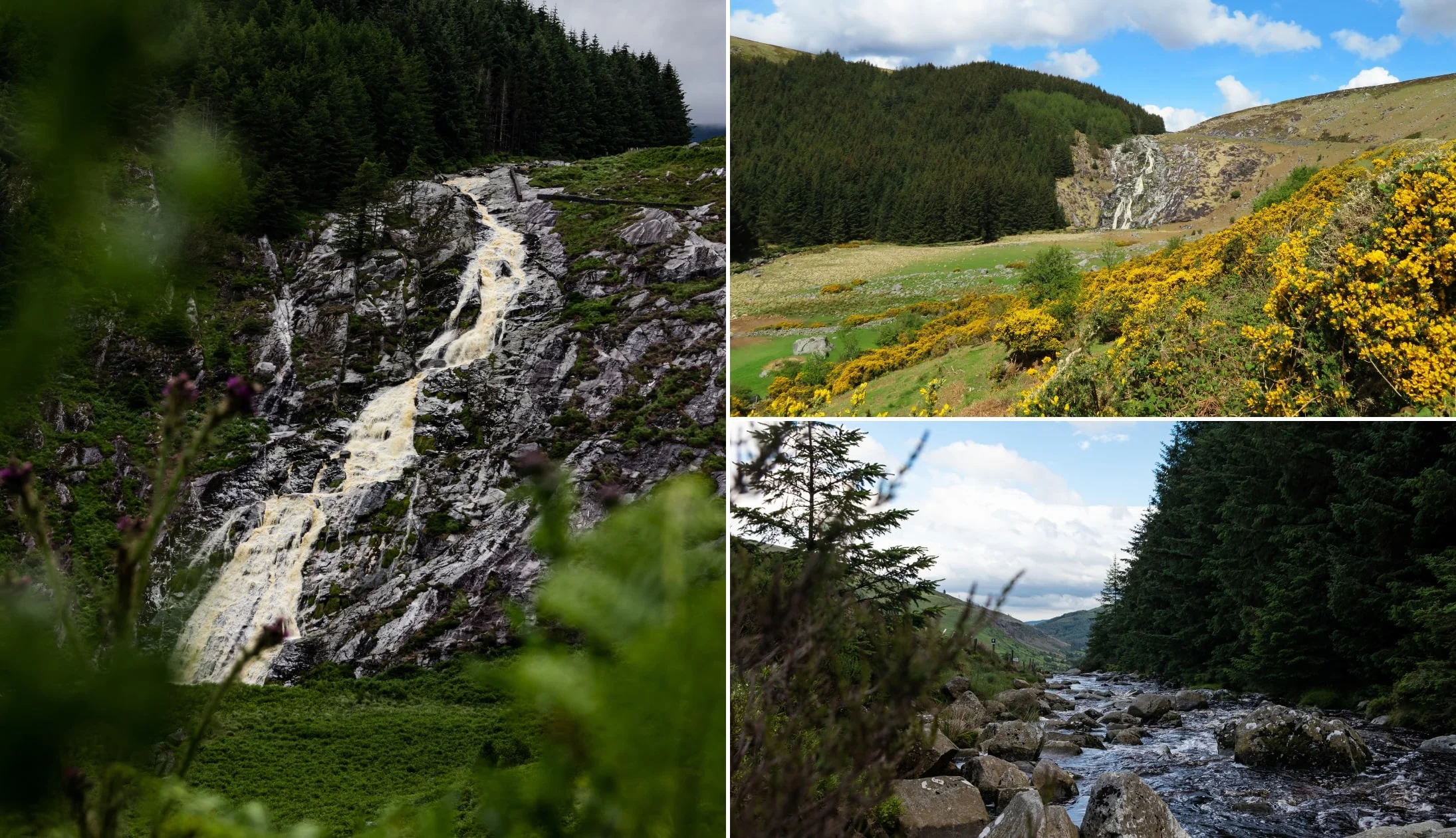
Photos via Shutterstock
Follow the road from Lough Tay and you’ll be treated to glorious mountain scenery, wide open bogland and some road-side Christmas Trees, fully decorated throughout the year (yes, very random!).
Follow the road around to Glenmacnass Waterfall, a beautiful 80-metre cascade that tumbles down the mossy rocks into the river below.
It’s located on the road from Sally Gap to Glendalough and the village of Laragh. There’s a handy car park and from here you can take a short walk to the top of the falls to see them tumbling into the valley below.
Stop 3: Glendalough Visitors Centre and Monastic City
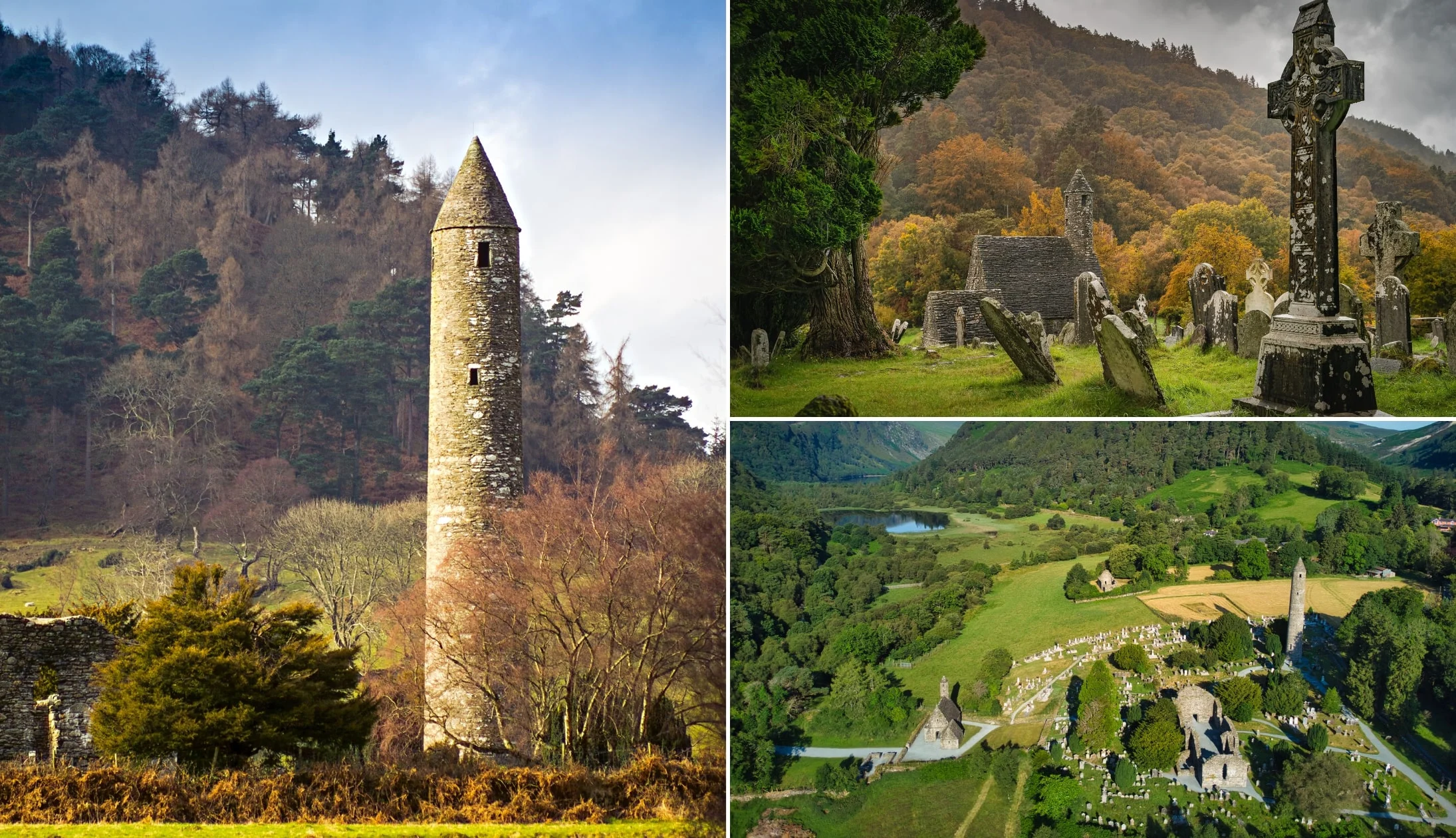
Photos via Shutterstock
Once you arrive at Glendalough, park up at the visitor centre (lower) car park, and pop inside to discover a number of interesting exhibits and displays. These tell the history of the area, while giving a fascinating insight into the natural life that inhabits it too.
Entrance to the visitors centre costs €5 for adults, €3 for children/students and €13 for a family of four, and it’s open daily from 09:30 to 18:00 (peak season) or 17:00 (low season).
Once you’ve finished inside, take a walk outside and discover the fantastic Glendalough Monastic City. Founded by St. Kevin in the sixth century, it’s home to some ancient round towers, churches, and tombs, as well as an extensive graveyard. The ruins are amazingly well-preserved and sit amid some of the finest scenery in Ireland.
Stop 4: Glendalough Upper Lake

Photos via Shutterstock
From the Monastic City, you can enjoy an easy-going, all flat, 20 minute walk (follow signs for the Green Road Walk) along the shores of the lower lake, before arriving at the incredible Upper Lake. Here, the scenery opens up and is a whole new level of spectacular. It’s a superb place to relax by the shores, gazing over the water to sights like St. Kevin’s Cell.
There’s also a car park at the upper lake, and if you prefer to drive, it’s just 2 minutes away from the lower car park. Just be advised, this car park does fill up quickly in the high season and at weekends.
Stop 5: Lunch at the Wicklow Heather

Photo left: The Irish Road Trip. Others: Via Wicklow Heather
Once you’ve finished exploring, you can drive up to the Wicklow Heather for lunch. It’ll take about 5 minutes to get there, and it has an extensive car park. We always recommend the Wicklow Heather, for its cosy atmosphere, quaint decor, and excellent menu. You can choose from a number of traditional Irish dishes, as well as sandwiches, seafood, and much more, including veggie and vegan options.
Stop 6: Powerscourt House and Gardens
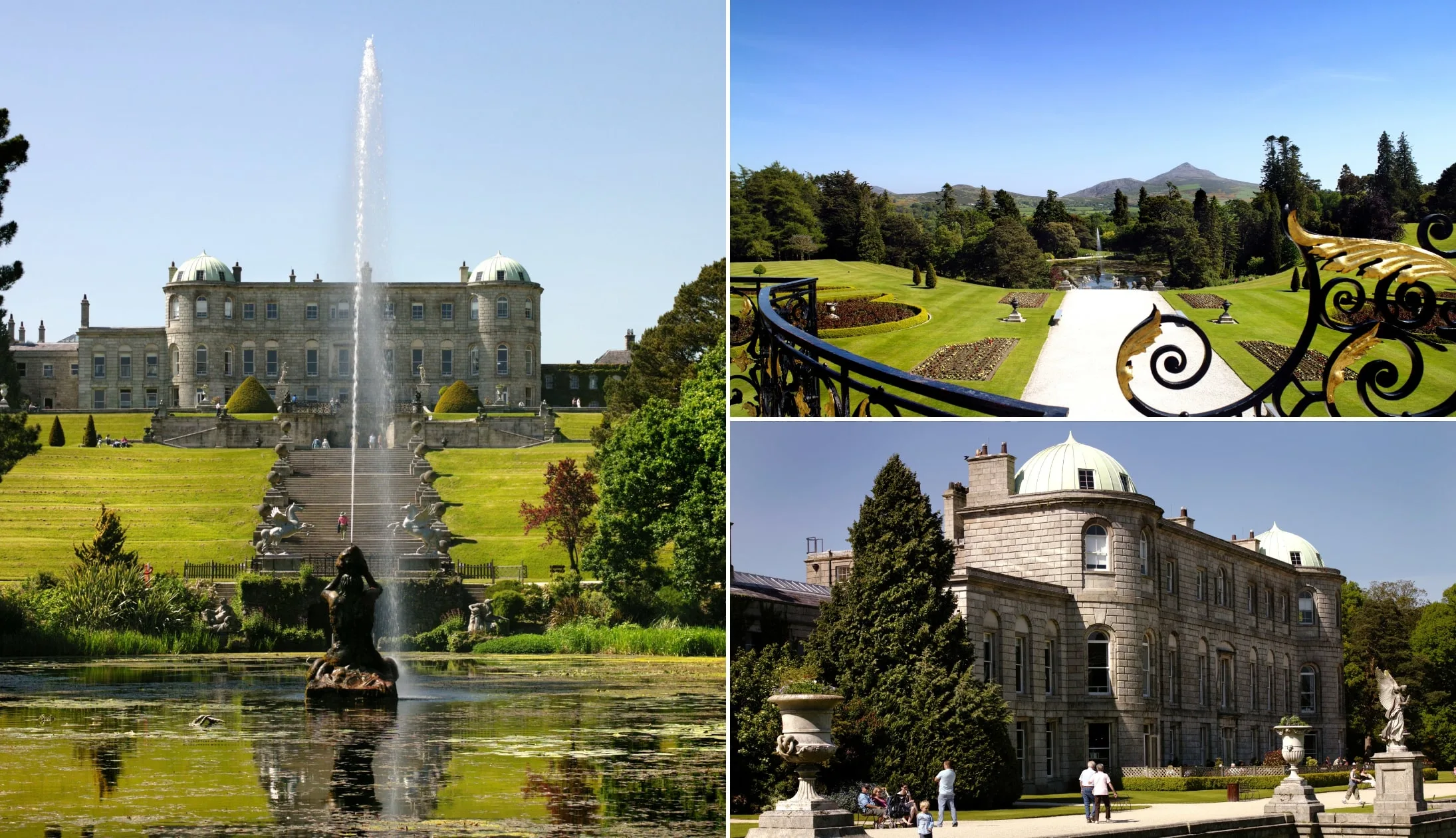
Photos by Chris Hill via Failte Ireland
Our next stop is a 35-minute drive away to the breathtaking Powerscourt House and Gardens. The Powerscourt Estate gardens are some of the most beautiful in Ireland and cover an incredible 47 acres of land. You can wander through the formal gardens, sweeping terraces, statues and secret hollows. The gardens were designed from 1731 onwards, with various sections worth exploring.
The grand house overlooks Sugarloaf Mountain and has been voted as one of the top houses and mansions worldwide by Lonely Planet. You can take a tour through the house and also enjoy some bespoke shopping with stores such as Design Loft, Global Village and Avoca Stores located inside.
Admission costs €11.50 for an adult, €9.00 for seniors, €8.50 for students, and €5.00 for children, or you can purchase a family ticket for €26.00. There’s a lot to take in here, so it’s worth allowing at least two hours for your visit.
Stop 7: Back to Dublin for the night

Different trad bars in Dublin. © Tourism Ireland
After enjoying a nice walk amid the stunning scenery of the Wicklow Mountains, it’s time to head back to Dublin for the night, for dinner, drinks, and maybe a little music.
Our Dublin food recommendations
There’s endless excellent restaurants in Dublin. However, if we had to pick one or two…
The first would be The Bull and Castle – it’s always a good choice and it’s right across the street from the Christ Church Cathedral.
An FX Buckley steakhouse (a Dublin institution), they offer a great range of steaks cooked to perfection, paired with their incredible beef dripping chips.
The Vintage Kitchen is an alternative, but it’s best to book in advance as it’s incredibly popular. A BYOB (bring your own bottle) place, the food is phenomenal, with a small but diverse menu that features classic Irish dishes with a contemporary twist.
Our Dublin pub recommendations
There’s certainly no shortage of great pubs in Dublin. If you’re a fan of old-school pubs, follow our Dublin pub crawl guide – it contains a short route with some of the city’s finest trad bars.
McNeils on Capel Street is an authentic Dublin pub, complete with wood panelling, impromptu folk sessions, and plenty of beers on tap.
The Long Hall is another must-see. Part Victorian time capsule, part vibrant boozer, it enjoys a fantastic atmosphere and is one of the most visually stunning pubs in the city.
You’ll find trad sessions at Pipers Corner every night of the week. O’Donoghues Bar on Merrion Row is another must-visit, with vintage decor and frequent trad sessions. It’s best-known as the home of the Dubliners, who used to play here regularly.
The Celt on Talbot Street is another great choice for live music, and while it’s not always trad, the bands are normally really good.
Day 10: The Boyne Valley and back to Belfast
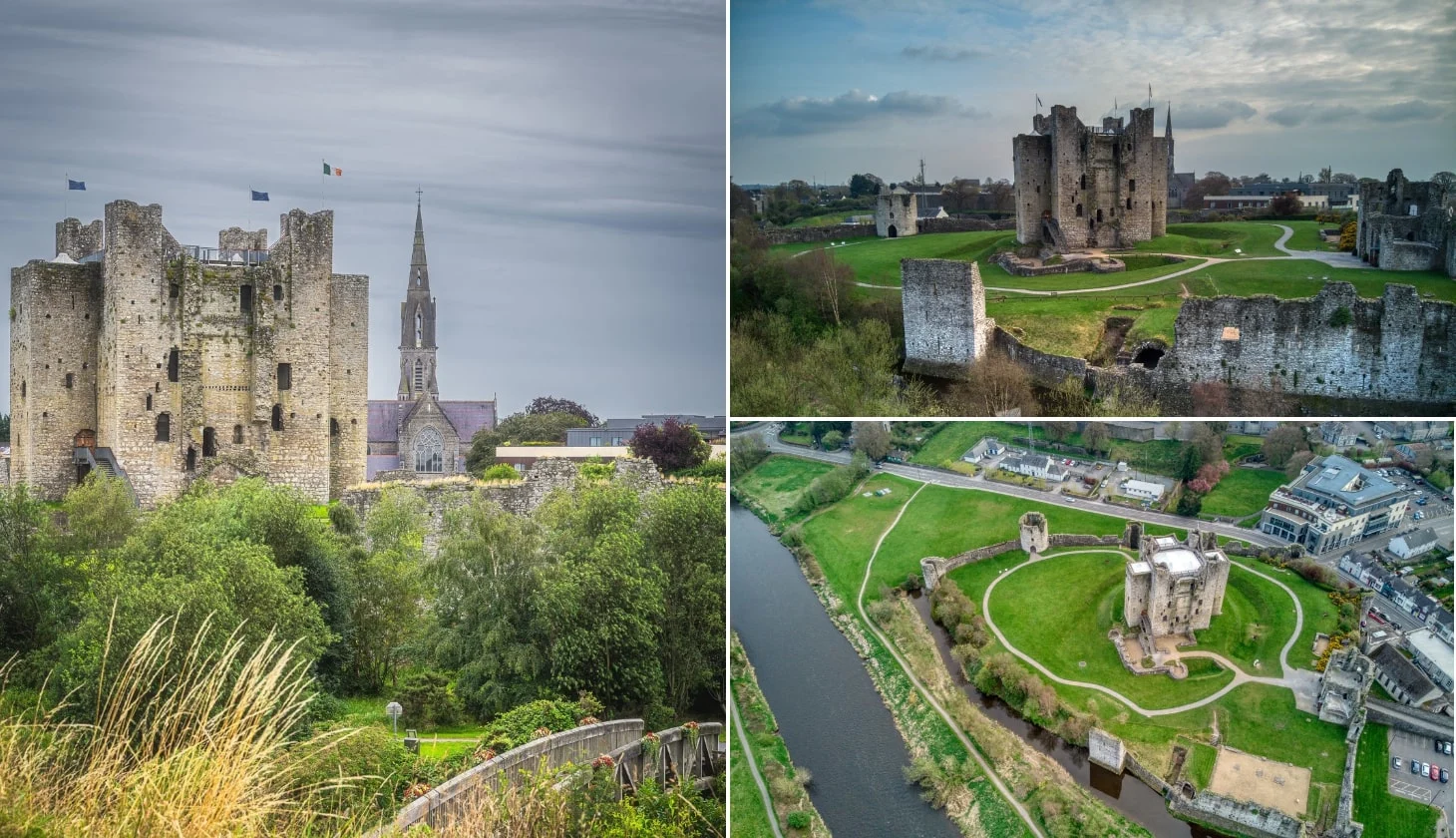
Photos via Shutterstock
It’s our penultimate day in Ireland, but fear not, there’s still plenty left to see and do! Today, we’ll be heading out of Dublin and returning to Belfast via the beautiful Boyne Valley.
Along the way, we’ll be stopping off at a number of iconic Irish sights before staying one last night in Belfast.
Before we hit the road one last time, be sure to grab a decent breakfast, either at your accommodation or at one of the many superb Dublin cafes that we mentioned before.
You’ll need to book accommodation in Belfast for one more night:
Our Belfast accommodation recommendations
- Budget: Vagabonds Hostel(in the city centre with top reviews) and Amica Guesthouse (short bus/drive from city centre with great reviews)
- Mid-range: Ten Square Hotel and Maldron Hotel Belfast City (both are super central with exceptional reviews)
- Luxury: The Fitzwilliam and The Merchant (both gorgeous, high-end hotels at the heart of the action)
Stop 1: Hill of Tara
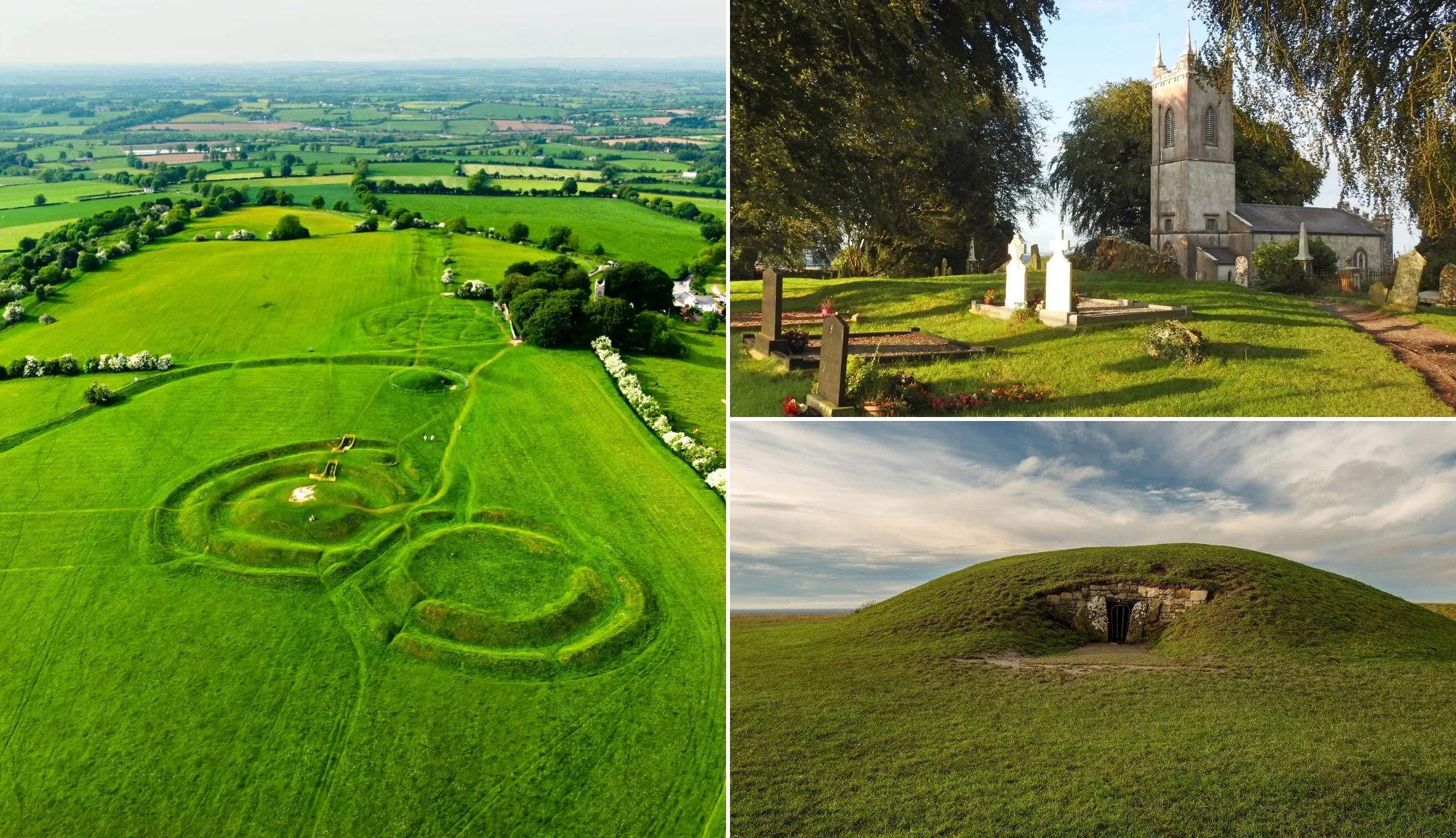
Photos via Shutterstock
Our first stop is the iconic Hill of Tara, just a 50-minute drive from Dublin. Dating back to the Iron Age, this hilltop is a veritable archaeological treasure trove and was formerly the seat of the High Kings of Ireland. The area is awash with ancient monuments, including passage tombs and burial mounds that date back thousands of years.
There’s an extensive car park on the side of the road, and you can enjoy a nice walk up onto the hills to get a better look at the various ancient sites. The surrounding scenery is also breathtaking, and you can see why it was so important to the High Kings of Ireland. If you fancy a coffee, drop by Maguires Cafe and Gift Shop to refuel.
Stop 2: Bective Abbey
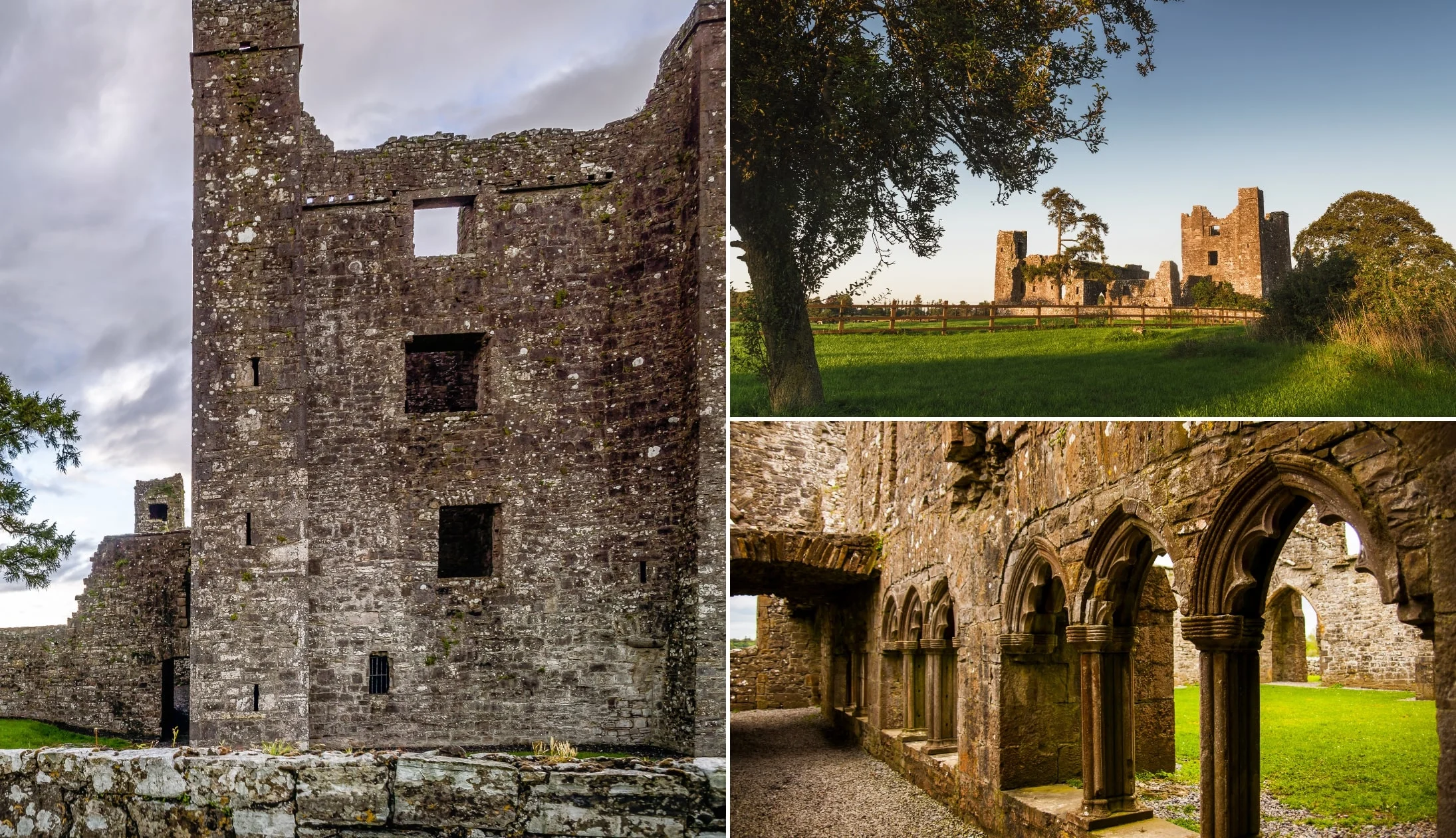
Photos via Shutterstock
Just a ten-minute spin away from the Hill of Tara, Bective Abbey dates back to 1147 and was Ireland’s second Cistercian Abbey. The ruins are remarkably well-preserved, though most of what remains date back to the 13th and 15th centuries. In particular, the cloister stands proud to this day. In fact, you might recognize it from the movie Braveheart.
You’ll see it clearly from the road, an impressive and iconic structure standing proud among the lush green surroundings. There’s a handy little car park, and from there it’s just a short walk to the ruins. It’s free to visit, and you can walk among the ruins at your leisure, reading the information panels to learn more about the history.
Stop 3: Trim Castle and lunch

Photos via Shutterstock
Continue driving for another ten minutes through the gorgeous Boyne Valley countryside, before arriving at our next stop, Trim Castle.
Like Bective Abbey, scenes of the movie Braveheart were filmed at Trim Castle.
Trim Castle dates back to the 12th century and is steeped in history as the site of many battles and raids. Despite its tumultuous history, it remains in great shape, with an intact tower house and walls. You can take a guided tour that lasts about 45 minutes.
Along the way, you’ll explore the various halls and chambers, before heading to the top of the castle to admire the amazing views of the surrounding town and countryside. If you don’t fancy going inside, you can enjoy a couple of lovely riverside walks around the outside of the castle.
There’s a handy pay and display car park at the castle, although the maximum stay is two hours. If that’s full, there’s another pay-and-display car park opposite the castle on the humorously-named Finnegan’s Way, just off Castle Street.
After enjoying the castle, take a stroll around the gorgeous town of Trim and drop by Rosemary Bistro for lunch. Here, you’ll find a good range of soups, sandwiches, and wraps, as well as heftier dishes like burgers, fish and chips, and lamb shank.
If you’re parked in the castle car park, on Frenchs Lane, just be mindful that you only have a maximum of two hours. If time allows, it’s well worth walking the streets of Trim and discovering sights such as Ireland’s oldest bridge, as well as the various shops in town.
Stop 4: Slane Castle and the Hill of Slane
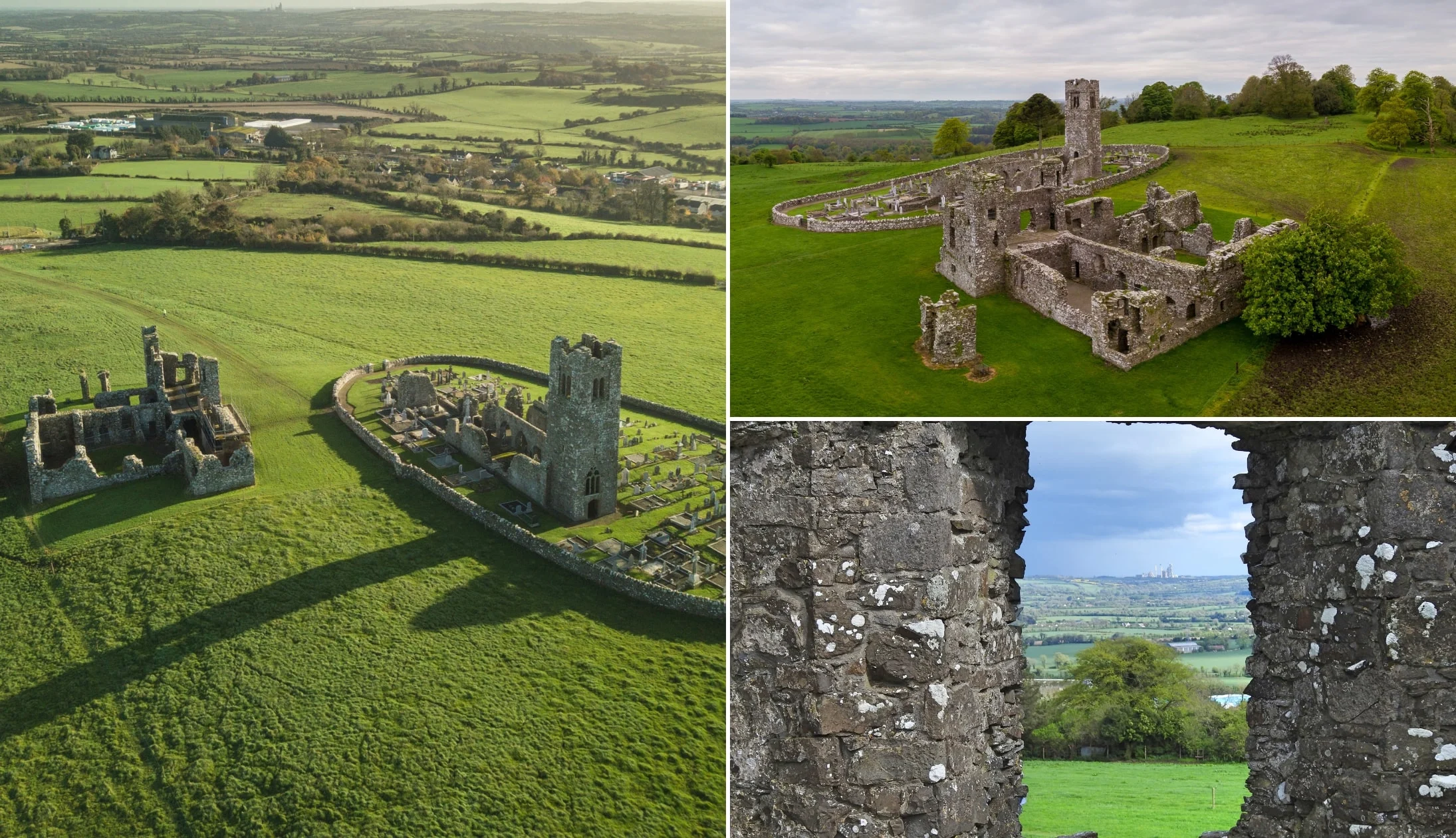
Photos via Shutterstock
After lunch, we’re back on the road for just over 30 minutes. Enjoy the gorgeous surroundings, before arriving at the mighty Slane Castle and the Hill of Slane. The 18th-century Slane Castle has lots to offer, and you could easily spend several hours here. There are guided tours at weekends, though you’ll need to book in advance. Otherwise, check out the distillery or tackle the Slane Castle walking trail.
Once you’ve finished at the castle, check out the Hill of Slane, just 4 minutes away. There’s ample parking at the entrance, just follow signs for ‘The yard’ or Abbey View. The hill is steeped in mythology, with legends saying that a king of the Fir Bolg is buried beneath it. A shrine to the Tuatha Dé Danann was erected, and the hill has been a hub of religious activity ever since. You can still see the well-preserved ruins of a 16th-century friary church and college to this day. Since the hill towers above the surrounding countryside, the views from the top are gorgeous.
Stop 5: Newgrange
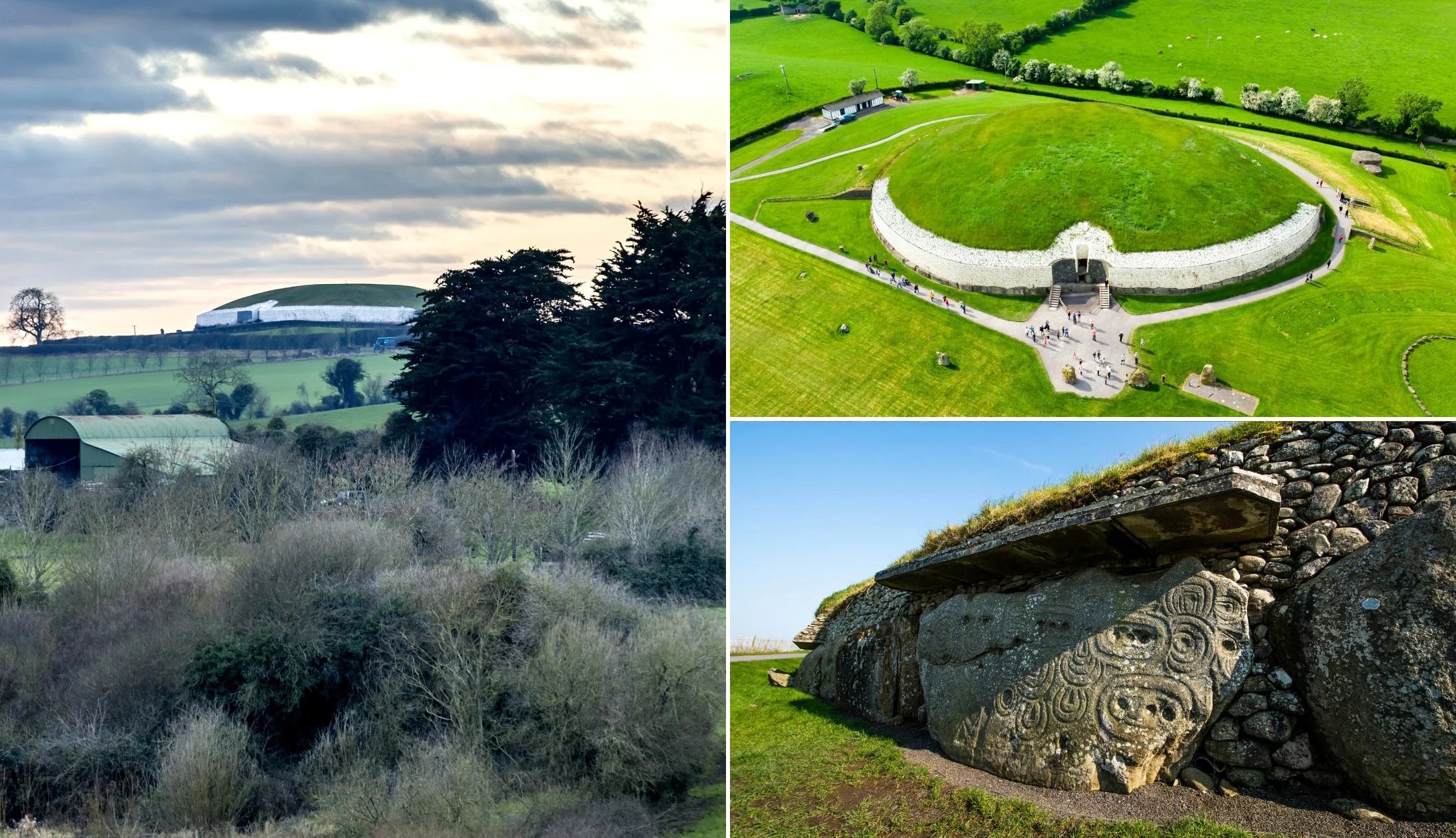
Photos via Shutterstock
Our next stop is a must-see, especially if you’re a history buff. Just a ten-minute drive away, the Newgrange Passage Tomb is one of the oldest attractions in Ireland. Dating back to 3,200 BC, it predates the pyramids and offers one of the earliest surviving examples of the triskele, the iconic Celtic three-spiral design.
There really is nothing else like it, and the best way to see it is by taking a guided tour. It’s well worth the cost and pre-booking is strongly recommended. On the tour, you’ll learn about the fascinating history of the site, while taking in a number of tombs, tunnels, mounds, rock art, and monuments. The visitor centre is also incredible, with a number of displays and exhibits to enjoy. You won’t want to miss this one.
The tour lasts about an hour, though it can easily take three hours to explore the full site.
Stop 6: Monasterboice
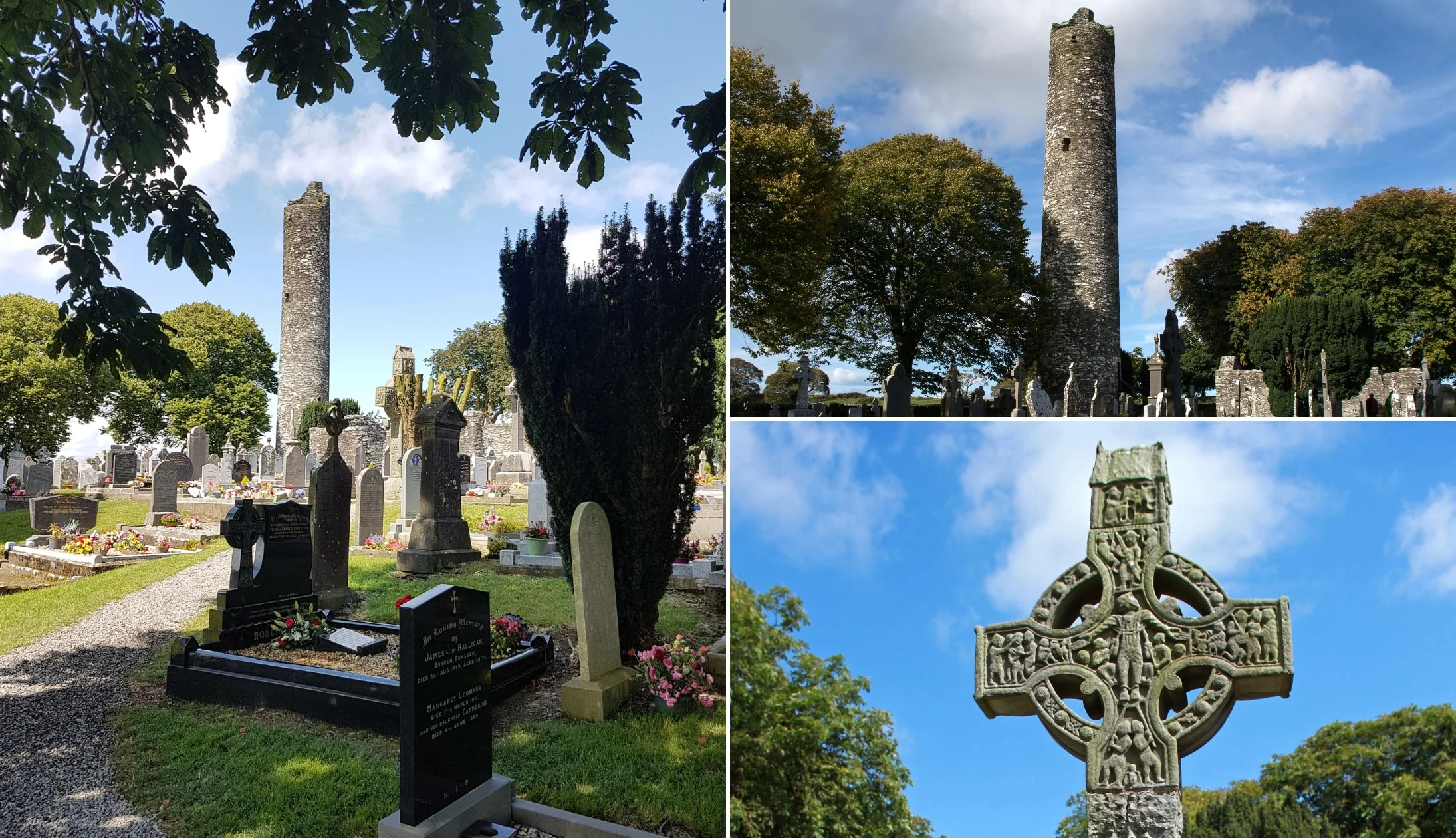
Photos via Shutterstock
Next up, Monasterboice is a stunning early Christian settlement that has been lovingly preserved. It’s about 20 minutes away from Newgrange and there’s a spacious car park right across the road. Dating back to the 5th century, the settlement was founded by Saint Buithe. The well-preserved remains of a 28-metre tall round tower and two magnificent Celtic high crosses are the biggest draws.
In fact, the Cross of Muiredach, or South Cross, is said to be the finest surviving example of a Celtic cross in Ireland. Standing 5.5 metres tall, with incredible intricate carvings, it’s not hard to see why. Enjoy half an hour of wandering around the beautiful grounds, before jumping back in the car and heading to Belfast.
Stop 7: Belfast for the night

Photo left: Silvia Franceschetti (CC BY-SA 3.0). Others via Bittle’s Bar on FB
It’ll take about an hour and ten minutes to reach Belfast from Monasterboice. Once you arrive, check into your accommodation, freshen up, and hit the town for your last night in Ireland.
Our Belfast food recommendations
There’s some outstanding restaurants in Belfast City. First up, Deanes is a Belfast institution and a must-visit while you’re in the city. There are three venues to choose from, each focusing on something different; Deanes Meat Locker, Deanes Love Fish, and Deanes at Queens.
Whichever you choose, you’re in for a fine feed. EDO is another favourite of ours, a stunning tapas and cocktail bar with incredible sharing platters.
Or, for a fancy first meal in Ireland, head to The Ginger Bistro, near the Belfast Opera House. Their menu is out of this world, though that’s no surprise when you consider it was voted the best restaurant in Northern Ireland.
Our Belfast pub recommendations
There are countless incredible pubs and bars in Belfast for a tasty after-dinner tipple. Check out traditional options like the unmistakable Bittles Bar, with its stunning range of local beer and Irish whisky.
The Duke of York is another old-school boozer, walls adorned with knick-knacks from yesteryear and serving up a fine pint of Guinness.
Finally, we couldn’t forget Madden’s Bar, a cosy, traditional pub complete with a roaring wood-burning stove and a friendly atmosphere. Somewhat overlooked, it’s a hidden gem, beloved by those in the know!
Traditional musicians from across Ireland come to play at Kelly’s Cellars every Tuesday, Wednesday, Thursday, and Saturday.
Other fantastic options for music include Fibber Magees, another charmingly old-fashioned pub with a lively atmosphere, and the John Hewitt.
Day 11: Belfast and rounding up your trip
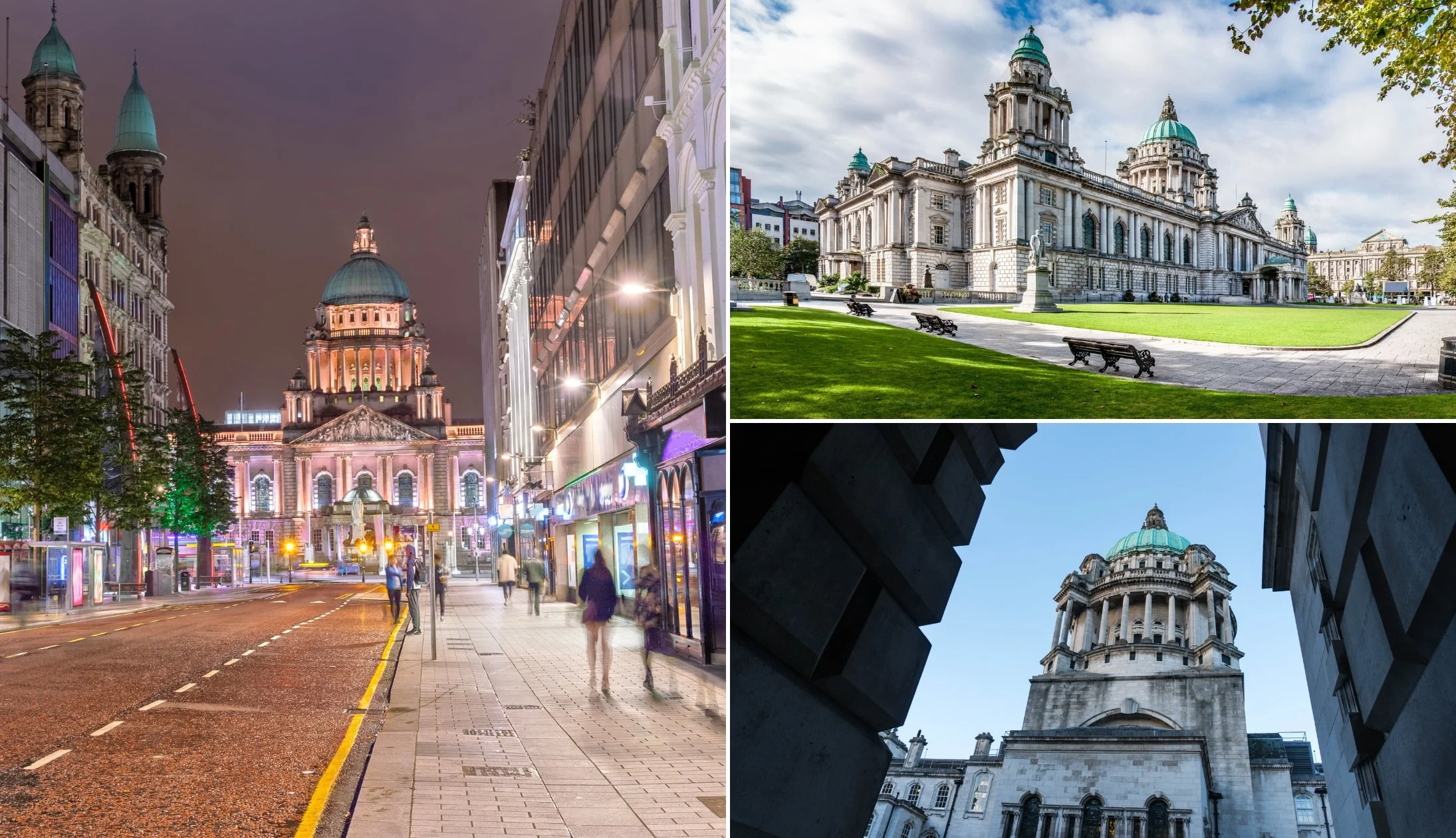
Photos via Shutterstock
Today’s the day you fly home and leave Ireland behind. Before you head to the airport, enjoy one last full Irish breakfast—you’ll not find white pudding anywhere else—and if time allows, check out some of the Belfast attractions that you didn’t get around to yet.
Cheers for joining us on this Irish Road Trip. We hope you had fun, made friends, and go home with fond memories of our humble island. May the road rise to meet you.
And that’s a wrap on this road trip
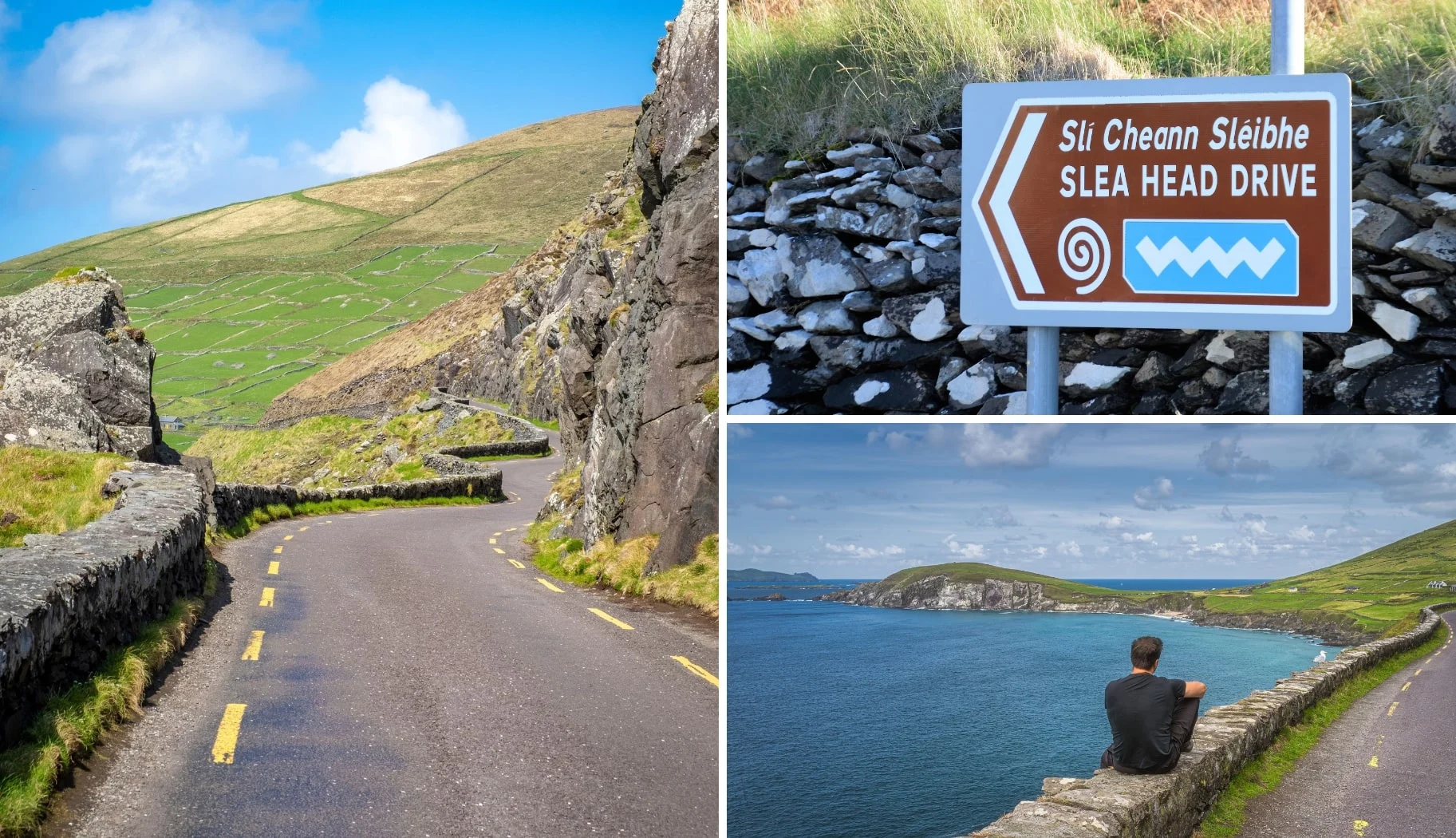
Photos via Shutterstock
We hope you found the above road trip guide useful. If you have any questions, ask in the comments below and we’ll do our best to help.
Or, if you’d like to browse our other Irish Road Trip itineraries, visit our Road Trip Hub – cheers!
Keith O’Hara has lived in Ireland for 35 years and has spent most of the last 10 creating what is now The Irish Road Trip guide. Over the years, the website has published thousands of meticulously researched Ireland travel guides, welcoming 30 million+ visitors along the way. In 2022, the Irish Road Trip team published the world’s largest collection of Irish Road Trip itineraries. Keith lives in Dublin with his dog Toby and finds writing in the 3rd person minus craic altogether.

